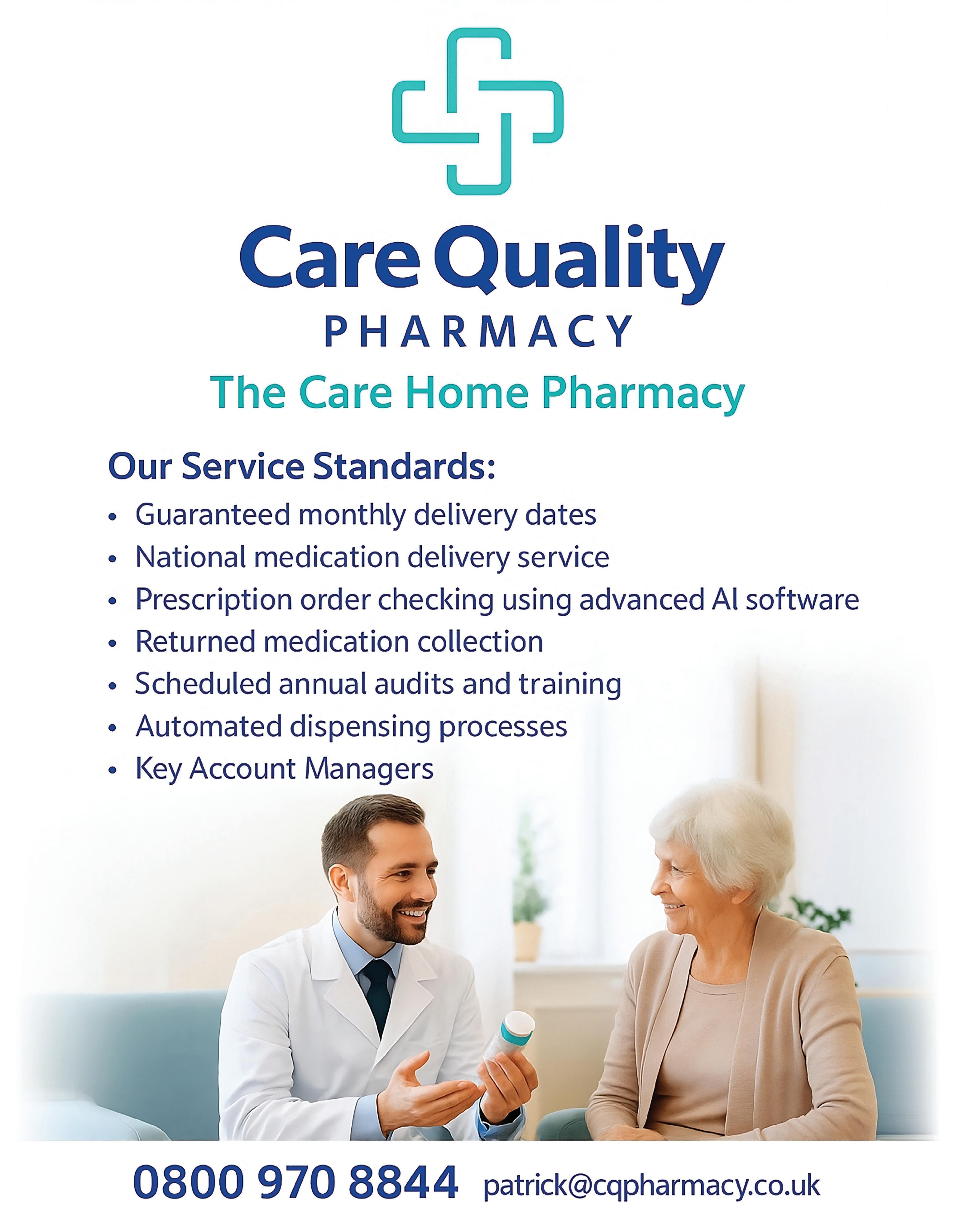

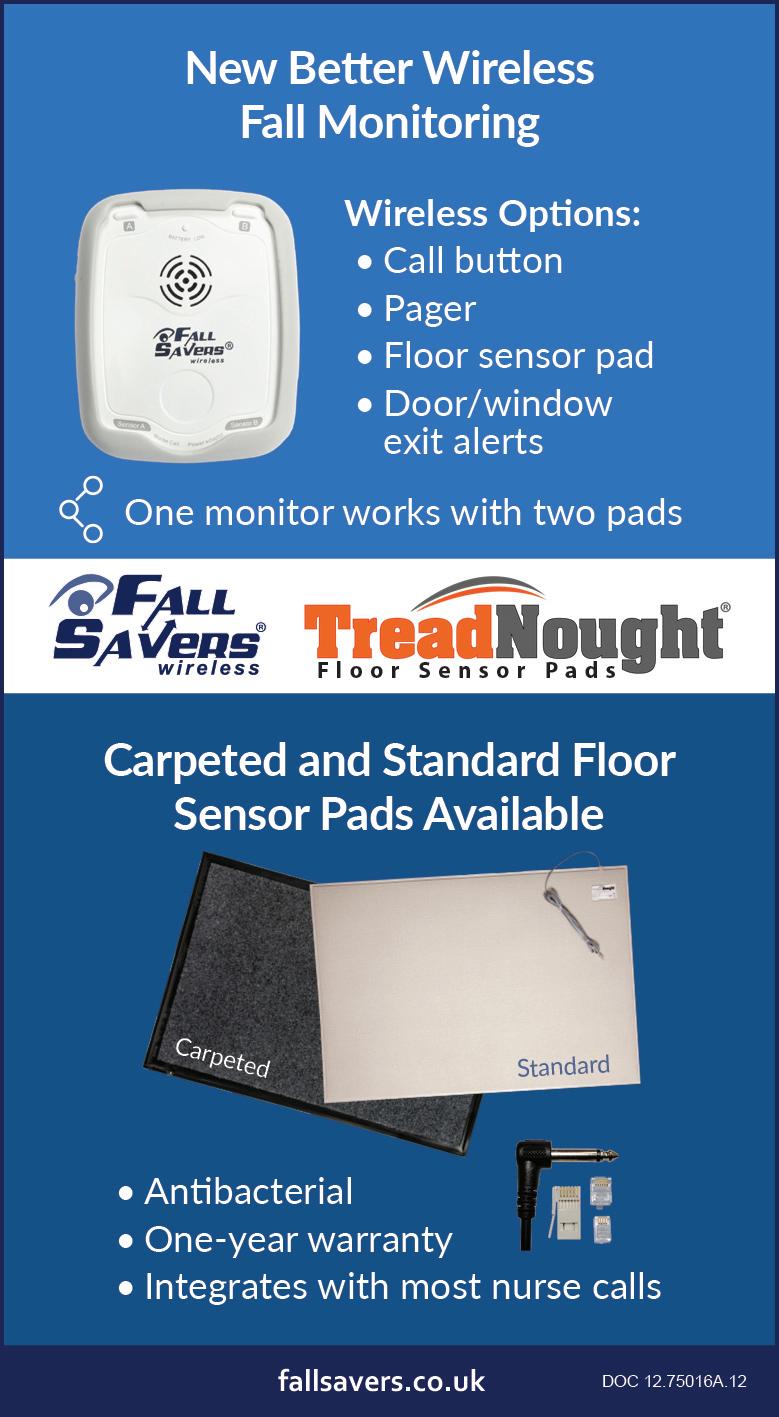

















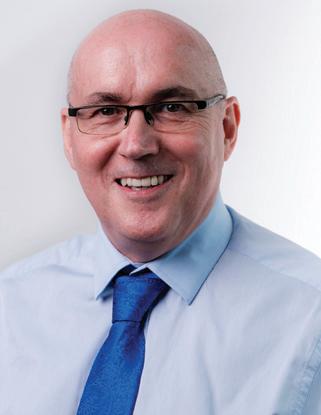
As I write this, I find myself reflecting on what once again is a most humbling experience for us all here at THE CARER.
The Remembrance Day supplement you'll find within these pages represents something far more significant than a collection of articles – it is a tapestry of living memory, woven together by care homes across the United Kingdom who took the time to share their residents' stories and commemorations with us.
I must confess, I'm not ashamed to admit that putting this supplement together brought a tear to my eyes on more than one occasion.
Each photograph, each recollection, each carefully preserved memory reminded me that we are custodians of something precious – the first-hand accounts and experiences of a generation whose sacrifices shaped the world we know today.
The stories, quite simply, speak for themselves. I don't believe there is anything I could add that would enhance them in any way.
What you will read are authentic voices, genuine emotions, and real experiences that carry a weight and truth no editorial flourish could improve upon.
On Sunday, I attended the Remembrance service at Bournemouth Cenotaph, as I have done for many years.
Yet each time I stand there, Remembrance Day feels like a fresh reminder of what sacrifices were made for the freedoms and way of life we enjoy today. If anything, its significance grows year on year. As the years pass and we lose more of those who lived through those dark days, the imperative to remember becomes ever more urgent.

This is why I am so incredibly proud that care homes across the UK chose to share their residents' stories with us.
You have helped us create something that matters – a permanent record of gratitude, of memory, and of honour.
These pages will serve as a testament not just to those who served, but to the communities who continue to cherish and remember them.
I want to extend my deepest thanks to everyone who contributed to this supplement.
To the care home staff who took photographs, gathered stories, and coordinated submissions – your dedication does not go unnoticed. To the residents and their families who shared their precious memories and photographs –thank you for trusting us with these treasures.
And finally, a very special thank you to Matt and Charlene here at THE CARER, who worked tirelessly to bring this supplement together.
Their dedication, sensitivity, and attention to detail have created something we can all be truly proud of.
I would encourage our readers to sign up for our bi-weekly digital newsletter at www.thecareruk.com and follow us on social media for all the latest news.
Carer is published by RBC Publishing Ltd, 3 Carlton Mount, 2 Cranborne Road, Bournemouth, Dorset BH2 5BR.
I can always be contacted at editor@thecareruk.com

damage. Views expressed within this publication are not necessarily those of the publisher or the
responsibility for any effects, errors or omissions therefrom. All rights reserved, reproduction is forbidden unless

(CONTINUED FROM FRONT COVER)
THE PERFECT STORM
The October 2024 Budget was the catalyst for the movement, when Employer National Insurance increases threatened to tip already fragile providers over the edge. But as care home managers, homecare agencies, and charities began sharing their stories, a deeper truth emerged the report says, “This wasn't just about one tax rise. It was about decades of systemic neglect.”
By April 2025, the combination of rising ENICs and National Living Wage increases without corresponding funding reviews created what the report calls "a perfect storm." Providers weren't failing they were being failed by a Treasury that had imposed a 35% increase on the National Living Wage since 2020/21 without matching investment.
Their first annual report, released today (November 12), reveals a sector pushed to breaking point yet more united than ever before. It's a story of workforce crisis, economic injustice, and political awakening but also of extraordinary resilience and collective power.
The report captures what organisers describe as the resilience, frustration, passion and humanity of a workforce that has maintained essential services across the country while simultaneously fighting for its own survival.
Main points of the report include:
• 1.6 million people employed in adult social care (equal to NHS workforce)
£332.6 billion total socioeconomic contribution to UK economy
£162 billion estimated annual value of unpaid care
85% drop in overseas care worker visas since 2024
165,000 projected unfilled posts by 2026
• 64% of care workers cite low pay as reason for leaving £12.30 average hourly wage for care workers
3,400 attendees at Westminster rally, February 2025
THE INTERNATIONAL RECRUITMENT COLLAPSE
Perhaps most damaging has been the fallout from 2024's immigration reforms. The report reveals that overseas workers, who had made up one in five new care recruits, saw an 85% drop in visa approvals following tighter sponsorship rules and rising costs.
For smaller providers already operating on razor-thin margins, international recruitment became financially impossible. The result? Vacancy rates reversed two years of progress, climbing back toward 10% by mid2025 approximately 165,000 unfilled posts nationwide.
"When we close the door to care workers, we close the door to care itself," the report states bluntly. THE ECONOMIC CASE
The report also highlights the contribution the sector makes to the wider UK economy. £77 billion directly to the UK economy and £332.6 billion when indirect impacts are included. It employs 1.6 million people equal to the entire NHS workforce.
Every £1 invested in social care generates between £1.75 and £2.35 in wider economic benefit. In Northern Ireland, that return hits £3.00.
Yet despite this massive economic contribution, care workers earn an average of just £12.30 per hour less than retail and logistics roles requiring fewer qualifications. The report identifies low pay as the number one reason 64% of care workers leave the profession.
The report points to February 2025 as a watershed moment, as over 3,400 care professionals, unpaid carers, and families gathered outside Parliament for the first-ever Providers Unite Rally. The banner read: "Social Care Cannot Wait."
"It wasn't just a protest. It was a statement of identity and unity," the report recalls. "For the first time, those who keep the system running spoke as one."
By September, the movement had travelled to Liverpool for the Labour Party Conference, this time addressing Government ministers, MPs, and national media directly. Social care was no longer at the margins it was centre stage.
Built on the mantra "Stronger Together", the movement has been recognised for bringing together workforce and providers in collective courage to speak out. According to the report, this year has proved that unity is the movement's greatest strength, showing that when people stand together without fear, hierarchy or ego, real change begins.
Nadra Ahmed CBE and Ian Turner OBE, Co-Chairs of the National Care Association, said it had been a great privilege to support the Providers Unite movement and watch it evolve.
"Bringing together a diverse sector has always only been a vision but to watch the rally in February demonstrated that it is possible and it does have an impact," they said in a joint statement.
The Co-Chairs expressed gratitude to Victoria Buyer, who led the project through to the Liverpool rally in October 2024, and welcomed Katrina's appointment to continue the work, stating it "feels positive that it remains in safe hands."
"We are hugely grateful to everyone who has taken the time to engage and support the movement this far and we look forward to working with everyone to build on the foundations set," they added.
The movement remains open to all, with organisers describing The National Social Care Narrative 2025 as more than a publication – calling it a promise and commitment that the people who hold the sector together will no longer wait for others to define their worth.
"This is the year the care sector found its voice," the Co-Chairs said, "and it's only getting louder.
The report concludes with detailed policy recommendations spanning funding reform, workforce strategy, ethical recruitment, and co-production. Among them: a National Care Funding Settlement aligned with NHS budget growth, pay parity with NHS Bands 2-4, and mandatory lived experience representation in commissioning decisions.
The report's closing statement sets out clear messages to three key audiences:
• To Government: Fund fairly. Listen and hear. Act now.
• To Providers: Stay united. Speak out. Share your truth.
• To Carers: You are not alone. Your work is the heartbeat of reform.


Sickness absence in the care sector continues to rise, with NHS England reporting a monthly 5.6% absence rate.
Rising sickness absence is a significant challenge for care providers already managing high levels of grievances and employment tribunal claims.
One major change on the horizon is the reform of Statutory Sick Pay (SSP). SSP is currently not paid for the first three days of absence and is unavailable to employees earning below £123 per week. However, under the Government’s Employment Rights Bill, from April 2026, SSP will be payable from the first day of absence, and all employees will be eligible regardless of earnings. The rate will either be paid or 80% of normal earnings if the pay is lower.
While this reform will benefit employees by providing earlier financial support, it will also place additional strain on care providers. With rising National Minimum Wage rates and National Insurance Contributions, the expanded SSP entitlement could lead to increased absence rates and higher operational costs. Employees who previously worked through minor illnesses due to financial pressures may now choose to take sick leave, potentially increasing the strain on care providers.
To prepare, care providers should take proactive steps now, including:
• Reviewing absence policies and payroll systems to ensure compliance with the upcoming changes.
Financial modelling to understand the cost implications.
• Training managers to address sickness absence early to reduce the risk of long-term issues.
Monitoring absence trends across the organisation.
Flexible staffing arrangements, such as maintaining a pool of bank staff and contingency planning for periods of high absenteeism, can help mitigate short-term disruptions. However, long-term solutions will be
By Rebecca Hughes,
needed and will require investment in workforce wellbeing and retention strategies.
The increase in absences and the further likely increase following April 2026 highlights the importance for care employers to manage persistent sickness absences carefully, whether long-term or short-term. However, absence management is not without legal risk. Care employers must take care to avoid breaching the Equality Act 2010, especially where long-term health conditions are involved.
Research by Birketts has highlighted the legal risks facing employers in the care sector. Over the past two years, the most common employment tribunal claims brought against care businesses were unfair dismissal (including constructive dismissal) and disability discrimination.
Failure to make reasonable adjustments for employees with disabilities can lead to costly tribunal claims. It is therefore essential that HR professionals ensure absence policies are not only legally compliant but also attuned to the complexities of disability-related absences. Policies should reflect a nuanced understanding of the duty to accommodate, and managers must be equipped to apply these principles fairly and sensitively.
Before considering dismissal due to persistent sickness absence, employers should follow a structured and fair process. This includes exploring reasonable adjustments, such as modifying absence targets or offering reduced working hours, and considering alternatives to dismissal, such as redeployment. These steps should be clearly documented. When medical evidence is conflicting, employers should err on the side of caution and consider the possibility of a disability. Decisions should be reviewed if circumstances change, for example, if attendance improves. Additionally, any medical evidence relied upon must be current at the time of dismissal.
If employees are dismissed due to absences, they could bring complaints of:
Failure to make reasonable adjustments.
• Unfair dismissal
Unfavourable treatment due to disability-related absences
However, where absence levels significantly exceed sector norms, employers may be able to justify a firmer approach to absence management, including dismissal, provided the reason is fair and proportionate, and the process followed is procedurally sound.
Employers also have a statutory duty under the Health and Safety at Work Act 1974 to safeguard the physical and mental well-being of their staff. In the care sector, where emotional and physical demands are high, this duty is particularly important. Rising absence rates may signal underlying issues such as burnout, stress, or inadequate support systems. HR teams should consider implementing regular well-being checkins, mental health first aid training, and access to occupational health services.
In conclusion, rising sickness absence rates are a multifaceted challenge for care providers. By monitoring trends, planning financially, updating policies, and supporting staff wellbeing, HR professionals can help their organisations navigate this complex landscape.
Mable Joloza, Bramwell Care Home, part of the Runwood Homes Group, has been honoured with the Proud to Care Nottinghamshire Award 2025 for Champion of Equality, Diversity & Inclusion. The award recognises outstanding leadership in fostering a culture of inclusion, fairness, and respect within social care.
Mable’s leadership has been widely praised by families and colleagues alike. Amanda Fletcher, a family member, said: “Huge congratulations, Mable! What a richly deserved honour and a beautiful reflection of the culture you have nurtured so instinctively and generously. Your leadership radiates warmth, dignity and inclusion –and this award is a testament to the countless lives you have touched.”
In accepting the award, Mable Joloza expressed her gratitude:

“I am truly honoured and humbled to receive this award. It reflects the values at the heart of good care – respect, fairness, and celebrating each person for who they are.
This recognition is not just for me, but for our incredible team who live these values every single day. From carers to kitchen staff, housekeeping, and the lifestyle activities team, every member contributes to making Bramwell a home where everyone feels valued, supported, and included.”
The Proud to Care Nottinghamshire Awards, organised by Nottingham County Council, celebrate excellence in social care, highlighting individuals and teams who go above and beyond to provide compassionate, inclusive care.
The Independent Care Group (ICG) has appointed Mike Padgham (Chairman at Saint Cecilia’s Care Group in Scarborough) as their Honorary President, recognising more than two decades of outstanding leadership as Chair and his tireless commitment to championing providers, people who draw on care, and the social care workforce.
“I’m honoured to take on this role,” said Mike Padgham. “ICG has always been a voice for providers on the front line and for the families who rely on them every day. As Honorary President I’ll continue to support members locally and nationally – and I’ll keep lobbying for earlier, bolder social care reform that matches the scale of need. Delays cost people, families, and communities; we have to move faster.”

Paying tribute to ICG’s Chief Executive, Mike added: “I want to thank John Patterson for his sterling work in setting the Association on a new course. John’s focus on practical support for providers, honest dialogue with councils and Government, and a relentless drive for solutions is exactly what the sector needs.”
John Patterson, Chief Executive of the ICG, said: “We’re delighted that Mike Padgham has accepted the role of Honorary President. His 20+ years of service as Chair and his unwavering advocacy – from standing up for fair funding to pushing for reform – have shaped ICG’s reputation as a constructive, solutions-driven partner. His insight will continue to guide our work.”
Councils in England are increasingly relying on payments from residents to fund adult social care, with client contributions now overtaking NHS income as the largest external funding source, according to newly published government figures.
The Adult Social Care Finance Report for 2024-25, released by the Department of Health and Social Care, reveals that income from client contributions surged by 14% (£0.6 billion) between 2023-24 and 2024-25, representing the highest share of local authority income at 48% of the total.
This marks a significant shift in the funding landscape, with client contributions now exceeding income from the NHS, which increased by a more modest 4% over the same period. Overall income from external sources rose by 8% to £9.7 billion.

The report paints a picture of a sector under increasing financial pressure. Gross current expenditure on adult social care reached £29.4 billion in 2024-25, representing a 9% increase in cash terms – or £2.3 billion more than the previous year.
The bulk of spending – some 80% or £23.6 billion – went towards long-term support, which saw a 10% year-on-year increase of £2.2 billion. This includes residential, nursing and community care for adults requiring ongoing support.
Care providers are also facing higher costs, with the average weekly cost of residential or nursing care rising by 7% (£77.15) to £1,185.55. Home care costs similarly increased, with the average cost of an hour of externally-provided home care now standing at £23.56, up 7% (£1.53) on the previous year.
Regional variations remain significant, with London recording the highest average weekly cost for nursing and residential care at £1,309, whilst the North East had the lowest at £1,012 per week.
The sharp rise in client contributions raises important questions about affordability and access to care. For residents aged 65 and over receiving long-term care, client contributions represented a substantial 73% (£3.5 billion) of external income sources.
The report also highlights that net current expenditure – the amount funded solely by local authorities through council tax, business rates and central government grants – totalled £24.7 billion, accounting for 72% of total expenditure.
With overall public spending on social care estimated at £27.8 billion (including Better Care Fund contributions), the sector continues to face challenges in meeting rising demand whilst maintaining quality of care.
Policy research organization the Healthcare Foundation has estimated that local authorities will require at least £3.4 billion in additional funding by 2028-29 compared to 2025-26 levels simply to address growing service demand and inflation-related expenses.
Beyond these baseline requirements, councils face further financial pressures, particularly from the rollout of the industry’s inaugural “fair pay agreement” scheduled for 2028-29. This framework establishes an Adult Social Care Negotiating Body—composed of employer and worker union delegates—responsible for determining employment terms and workplace conditions for care sector employees.
While the government has designated £500 million toward funding this agreement in 2028-29, this allocation will be drawn from the broader spending review budget, thereby limiting resources available for addressing other urgent needs. Industry organizations have broadly characterized this funding level as insufficient.
The full Adult Social Care Finance Report, England: 2024 to 2025 is available at www.gov.uk
Residents and colleagues at HC-One’s Littleton Lodge Care Home, in Hednesford, Cannock, were delighted to welcome a special visitor, when Josh Newbury, MP for Cannock Chase, stopped by for a tour and conversation.
Josh Newbury was warmly greeted by residents and colleagues, who shared their experiences of life at Littleton Lodge – a much-loved part of the local Hednesford community.
During the visit, Josh Newbury explored the home’s welcoming facilities, including the hair salon, lounge, cinema, sky bar, ambient dining rooms, bedrooms, and gardens. He also spent time speaking with residents and colleagues, learning more about the activities, care, and

support available at the 66-bed home, which provides both residential and residential dementia care.
Melissa Hunter, Senior Home Manager at HC-One’s Littleton Lodge Care Home, commented: “We were so pleased to host MP Josh Newbury and showcase the warm, supportive environment we are proud to provide here at Littleton Lodge.
Our residents enjoyed the chance to connect with their local MP, and it meant a great deal to our team to see the value placed on the care and companionship we offer every day.
His visit was a wonderful reminder of the strong ties between our home and the community we serve.”

By Hannah Strawbridge, Director and Employment Solicitor, Inspire Legal Group

The care sector is one of the most rewarding yet demanding industries to work in, attracting people who are naturally compassionate, resilient, and driven to make a difference.
But those same qualities and the desire to always give more can also make care workers, managers, and even business owners particularly vulnerable to burnout.
At Inspire Legal Group, our Han Law team acts for several organisations within the care sector, including care homes, supported living providers, and domiciliary care agencies.
Over recent years, we’ve seen a sharp rise in cases involving burnout, stress-related absences, and breakdowns in working relationships. Often, these aren’t isolated HR issues; they are symptoms of a deeper cultural problem. Spotting the signs Burnout doesn’t happen overnight. It builds quietly over time. The early signs can look like a dip in energy or motivation, irritability, a loss of empathy, or an increase in mistakes, sickness, or absence. We’ve seen cases where excellent carers suddenly begin to make errors in medication administration, or managers who have always been the backbone of a team start struggling to meet deadlines or avoid conflict.
From both legal and HR standpoints, such warning signs must not be overlooked. In accordance with the Health and Safety at Work Act, employers are obligated to safeguard the physical and mental well-being of their staff, including taking proactive measures to identify and mitigate workplace stress. Neglecting this duty can lead to serious legal repercussions, such as claims of constructive dismissal or disability discrimination under the Equality Act. It may severely impact employee morale and the standard of care provided to residents or service users.
THE
In the care sector, the causes are often multi-layered. Chronic staff shortages mean teams are stretched to breaking point. Managers juggle competing demands: rotas, safeguarding concerns, CQC inspections, and family complaints, all while trying to maintain a supportive environment. Add to that long shifts, emotional strain, and low pay relative to the pressure, and the risk of burnout becomes significant.
Over the years, we’ve supported care employers facing complex cases where staff exhaustion has escalated into grievances, resignations, and even whistleblowing claims. In several situations, these issues could have been mitigated by earlier intervention, regular check-ins, supervision, and training for managers on recognising and addressing stress.
It’s worth remembering that burnout is not simply “not coping”; it’s a legitimate workplace health concern. The World Health Organisation recognises it as an occupational phenomenon caused by chronic workplace stress that has not been successfully managed.
THE IMPACT ON THE ORGANISATION
When burnout takes hold, its ripple effect is profound. Staff morale dips, absenteeism rises, and turnover follows. For care providers already struggling to recruit and retain good people, that can feel like a vicious cycle.
From a regulatory perspective, it can also impact quality ratings. Tired, disengaged staff are more likely to make errors or fail to follow procedures. We’ve seen disciplinary cases arise where, on deeper analysis, the root cause was burnout rather than wilful misconduct. In one of our cases, a senior carer faced disciplinary action for repeatedly missing documentation deadlines. The investigation revealed she was covering double shifts and had not taken annual leave for six months. With our guidance, the employer chose to address workload and wellbeing rather than proceed with dismissal, and the team’s performance subsequently improved.
There is no single fix, but the most effective strategies are those that treat wellbeing as a cultural priority, not a tick-box exercise. Preventing burnout requires that organisations support both staff and management. Managers are often the first to notice when someone is struggling, but they’re also the ones under pressure themselves.
Some of the most forward-thinking care organisations we work with have implemented wellbeing champions, peer support groups, and regular “temperature checks” with their teams. Others have invested in leadership training to help managers handle difficult conversations sensitively and spot early warning signs of stress.
It’s equally important to make workloads realistic, ensure staff take their annual leave, and review policies around sickness absence and flexible working. Under recent changes in employment law, flexible working is now a day-one right, meaning care employers should be ready to handle such requests fairly and proactively. Flexibility, where possible, can be a powerful tool in reducing burnout.
Beyond compliance, this comes down to values. In the care sector, the concept of duty of care applies just as much to staff as it does to residents or service users. Employers have a moral responsibility to look after those who look after others.
At Inspire Legal Group, the Han Law team has helped care clients design wellbeing frameworks that blend legal compliance with practical compassion. For example, one client introduced “Wellbeing Wednesdays” a protected time each month for team discussions on workload, mental health, and peer recognition. Another developed a post-incident debrief policy for staff exposed to distressing situations. These steps may sound simple, but they can make a significant difference in building trust and preventing burnout.
Ultimately, burnout prevention starts with leadership. Compassionate leadership doesn’t mean lowering standards; it means leading with awareness, empathy, and communication. Empowering managers to look after their own wellbeing ensures they are in a stronger position to support others.
Care work, at its core, is about human connection. The more we invest in the people who provide that care, the more sustainable and rewarding the sector will become.
So if your organisation is seeing signs of low morale, rising absences, or tension within teams, don’t dismiss it as “part of the job.” It may be burnout, and early action can make all the difference.
At Inspire Legal Group, we’re proud to work with care providers across the UK to create workplaces that are not just legally compliant but genuinely healthy and sustainable. Because in care, looking after your people is looking after your business.
Lovett Care has officially opened the doors to its latest care home; Upland Manor Care Home on Yewtree Road in Northern Moor. With its CQC registration in place, the team has already welcomed its first residents, Joe Whittaker and Pat Derbyshire.
The home will be managed by experienced home manager Michaela O’Brien, with Upland Manor providing 59 spacious bedrooms, and creating approximately 80 local jobs.
Michaela says: “Upland Manor is a superb home, and I am thrilled to be home manager. The design, technology and interior are fantastic, allowing for exceptional care and everyday joy for our residents.
“It’s great to be involved from the very start. Welcoming Joe and Pat and watching them settle in over the last few days has been incredibly
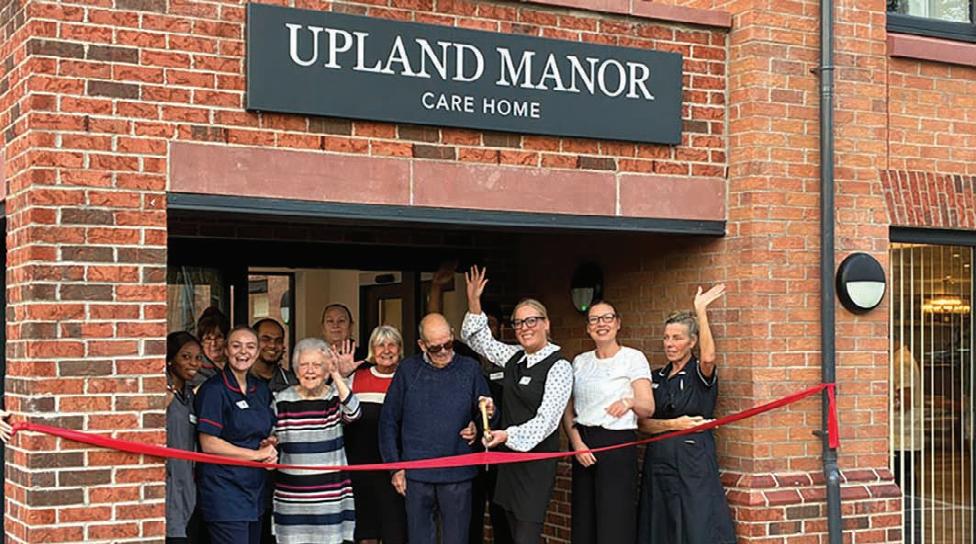
rewarding. We are building our team and look forward to welcoming more new residents in the coming weeks, offering reassurance, warmth, kindness and respect as they start a new chapter at Upland Manor.” Dawn Collett, deputy managing director at Lovett Care, adds: “Every aspect of our care homes are carefully considered, and Upland Manor is a magnificent example of what a brand-new care home should offer.
“From exacting design and build to the very latest technology that supports the care the team provides, improves safety within the home and enhances our residents’ daily lives, we continually strive to exceed expectations. We believe in ‘more’ for our residents on every level and are very much looking forward to welcoming new residents to Upland Manor, creating a vibrant and joyful community within the home.”
Residents at an Ilkley home can visit places such as Scotland and the North York Moors without leaving their home thanks to a new train experience.
MHA Glen Rosa have installed the Jolly Journey Train Experience, a new initiative by Little Islands, who specialise in creating unique interactive environments.
The train experience showcases journeys across the UK from the viewpoint of a passenger looking out of the window.
The team from Little Islands installed and decorated a part of the home’s dementia unit and converted it into a train carriage with props such as suitcases, train times and journey information displays.
MHA Glen Rosa provides residential and residential dementia care for 47 residents.
Adam Carling, home manager said: “The Jolly Journey Train experience is a new initiative and one that is proving to be very popular here.
“We have received some great feedback since the experience has been installed.

“Our residents love it, you will often see a number of them sat in the carriage and watching a journey.
“The idea came to me from my area who forwarded it to me, and I decided to look into it.
“I then contacted the team at Little Islands and the whole process took a couple of months from start to finish.
“We are quite privileged here at MHA Glen Rosa, where thanks to the generosity of the local community we are able to provide services such as this for our residents.
“We received a very generous donation via our Legacy Fund which enabled us to go for this experience.
“The location of the experience is really good as it’s in a high footfall area, where both residents and their relatives can sit and enjoy it.
“Alongside the Train Experience, we have also prepared a sensory garden thanks to funds we received.
“I do think this is something other MHA homes can look into having, it’s something quite unique and I do feel other homes will see the benefits just like we have.”
Jolly Journey Train Experience, see the advert on the facing page.
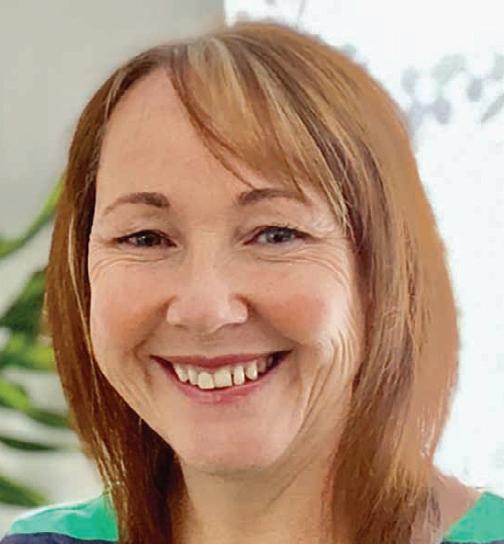
A University of Nottingham researcher will speak in the House of Commons this week as part of a discussion on how physical activity can boost the health and wellbeing of older adults.
Professor Elizabeth Orton, Professor of Public Health in the Faculty of Medicine and Health Sciences, has been invited to contribute to the Health and Social Care Committee’s inquiry into Healthy Ageing: Physical Activity in an Ageing Society.
Taking place on Wednesday, November 12, this inquiry will focus on ways that physical activity can prevent and reduce ill health in older age. It will explore how structured, progressive and tailored exercise can be used as an effective treatment to reduce the risk of falls in older age and have how it can impact on reducing the gap in healthy life expectancy between older people in the most and least deprived regions.
Healthy life expectancy in England has stalled, with older adults spending more years in poor health. However, even small increases in physical activity among the older population can greatly improve health and delay the development of long-term conditions.
During the inquiry, Professor Orton will present evidence on the importance of making sure the Falls Management Exercise (FaME) programme is more widely available and share research demonstrating its impact, including fewer falls, increased confidence and a reduced fear of falling. She will emphasise the importance of training specialist instructors to support exercise in older people and of delivering programmes in a way that does not compromise effectiveness.
The FaME programme is a six-month, face-to-face group exercise programme aimed at improving strength and balance in people aged 65 and over.
Professor Orton, who is also the Building Community Resilience and Enabling Independence Theme Lead for the National Institute for Health and Care Research (NIHR) Applied Research Collaboration (ARC) East Midlands, said: “Supporting older people to stay active is one of the most powerful tools we have for promoting independence, confidence and wellbeing in later life.
“Exercise programmes like FaME show that with the right structure and community support, people can not only reduce their risk of falls but continue doing the things that make life meaningful. Our challenge now is to make these opportunities accessible to everyone, wherever they live.”
The FaME programme is not yet available nationwide in England. Recent research involving Professor Orton suggests this is due to limited funding and a lack of understanding of just how powerful and effective specialist exercise programmes can be.
This week, Professor Orton will also unveil the new FaME Implementation Toolkit at the British Geriatrics Society (BGS) Autumn Meeting in Nottingham (12–14 November).
The toolkit is a collaboration between the NIHR ARC East Midlands, NIHR ARC Wessex, NIHR PenARC and NIHR ARC GM, Health Innovation South West, and the Universities of Nottingham, Manchester, Exeter and Glasgow Caledonian, the Royal Society for the Prevention of Accidents and Later Life Training.
The BGS Autumn Meeting brings together specialists responsible for the care of older adults, highlighting the latest scientific research and best clinical practices. This year, the meeting will be held at the East Midlands Conference Centre and online, providing broad access to cutting-edge developments in geriatric healthcare.
Professor Kamlesh Khunti, Director of the NIHR ARC East Midlands, said: “Helping older adults stay active and independent has a real impact on their quality of life.
“By rolling out programmes like FaME, we can reduce falls, promote confidence and build stronger, healthier communities across the region.”
The Braeburn Lodge Care Home alongside the Deepings Library came together to host its first recurring Tech Support Café at the community library based in the town of Deeping St James.
Visiting members of the community were able to come and visit the group to ask for support, from a range of areas including mobile phone help, smart speaker assistance and questions about streaming services and thoughts about artificial intelligence.
The Tech support café will return on Tuesday 20th November at 1.30pm and members of the community can ask any question relating to computers,
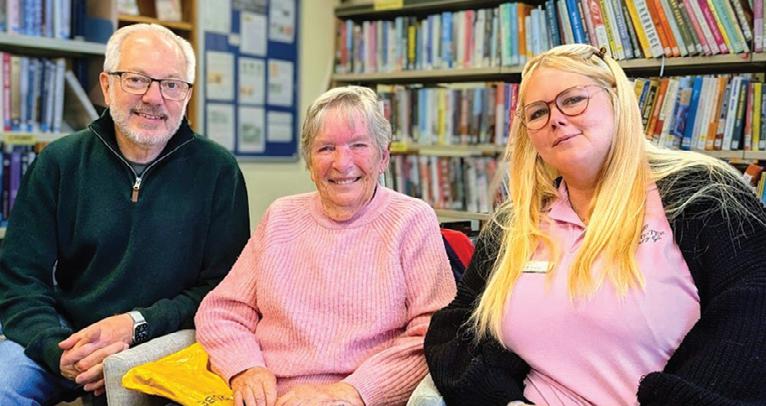
tablets/iPads, smartphones, apps or getting online. Questions at all levels are welcomed.
There will be a variety of refreshments and sweet treats available to guests in attendance. Who can also enjoy one another’s company whilst seeking digital assistance.
General Manager of Braeburn Lodge, Jane Lee said: “We look forward to taking part in what is sure to be another fabulous community event in November and helping the senior community with any technology related struggles they may be facing.”


A change in ownership may seem routine but as one care home discovered, failing to report it can have serious immigration consequences

A recent Home Office action against Burlington Court Care Home highlights how easily care providers can fall foul of sponsor licence rules. Even small administrative oversights, such as failing to report a change in ownership, can have serious consequences for both employers and their overseas staff.
2025 IMMIGRATION CHANGES AND THE CARE SECTOR
While changes to the Immigration Rules are frequent (albeit not always groundbreaking), 2025 has shaped up to be a significant year for immigration changes, especially those aimed at the sponsored work sector. The need to reduce net migration continues to remain at the forefront of government policy making.
The Immigration White Paper, published in April, signalled the end was coming for those looking to make applications as care workers
outside the NHS, along with several other jobs deemed to be of lower skill level (most roles below RQF level 6 - graduate level). The White Paper also introduced other suggestions to further tighten up the rules including increasing the required English levels and even the qualifying period needed to reach settlement. Those in certain care worker roles had already been barred from being able to sponsor dependants and care worker sponsors faced extra scrutiny when applying for and assigning certificates of sponsorship.
In July 2025, some of the suggested amendments were implemented so that now only those who were already being sponsored in certain care roles or have lawfully been working with their employer for at least three months can apply for further permission as Skilled Workers. There is now a complete ban on recruiting new care workers from abroad. With many care worker sponsors having had their licences revoked in the last few years, there is already a large pool of workers who are at risk of having their leave curtailed. It is clear from changes made in 2024 that the government has been keen for existing sponsors to focus their recruitment efforts on these affected workers.
SPONSOR LICENCE COMPLIANCE: CHANGE OF OWNERSHIP RISKS
Change of ownership has long been one of the biggest pitfalls for those holding a sponsor licence. It catches out both large corporations and small businesses alike. A sponsor may have all the necessary dayto-day policies in place for monitoring workers yet still fail to recognise the need for a new licence or transfer when there is a majority change in ownership. Often there is no change to the operational activities of the company nor the workers’ terms of employment, so sponsors blindly carry on without even considering the need for this to be reported to the Home Office.
By Natasha Willett, Partner, Latitude Law
(https://latitudelaw.com)
It was this exact scenario that Glasgow’s Burlington Court Care Home found itself in. There had been a change in majority ownership of the company, and the workers had been transferred to the new employer under UK TUPE rules. Such action would prompt a new sponsor licence application, or transfer to the purchasing company’s sponsor licence, to be made within 20 working days of the transfer. Requesting that the existing sponsored workers have their sponsorship transferred is part of this process. It is understood that 15 sponsored workers have been affected by this change and face having their current permission curtailed for what, on the face of it, appears to be an administrative oversight. The Home Office has always taken the view that sponsorship is a privilege not a right and tends not to offer much flexibility or discretion when compliance duties are not adhered to.
COMMON REPORTING PITFALLS
Even in cases where there is a change in minority ownership, it is still something which must be reported to the Home Office. Failure to report changes in company name and address are also routine acts which could result in compliance action being taken against a licence holder if not reported. Reporting failures have seemingly become so frequent that is has recently prompted the Home Office to issue a notice on its SMS message board to remind licence holders to regularly review and update details, including those for Key Personnel. Failing to change or deactivate Key Personnel when they leave a business is another common issue we see at Latitude Law.
Key Takeaway for Care Providers
The action taken against Burlington Court Care Home serves as a reminder to sponsors that if any changes occur – whether it be to the business or to a worker’s personal circumstances – this will probably require a report to the Home Office to stay compliant.
Chelmunds Court Care Home, part of the Runwood Homes Group, hosted a vibrant and Staff Cultural Day where the team members and residents celebrated the rich diversity within the home. Staff proudly wore their traditional clothing, shared homemade dishes from their cultural backgrounds, and showcased music, storytelling, and dance throughout the day.
The café area was decorated with flags representing the many cultures within the team, creating a colourful and welcoming atmosphere. Staff also spent time visiting residents around the home, offering them the chance to experience new customs, flavours, and cultural traditions firsthand.
Socorro, Care Team Leader, reflected on the celebration, saying: “It

was really wonderful seeing everyone together and sharing their culture, and all the different food as well.”
The event highlighted the home’s strong commitment to inclusion and community spirit, giving staff the opportunity to express pride in their heritage while residents enjoyed new experiences and meaningful interactions.
The idea for Cultural Day grew from the home’s naturally multicultural team and a shared desire to honour and appreciate the many backgrounds represented at Chelmunds Court. It encouraged understanding, sparked conversations, and created lasting moments of joy and connection.
West Northamptonshire Council has selected National Care Group to operate a new supported living service for adults with complex needs. The development is already welcoming tenants and directly addresses the local demand for high-quality, person-centred support.
After successfully winning a competitive tender with the local authority, the adult social care provider will support up to 15 individuals on their personalised support plans. Thirty new jobs have also been created, with social care professionals recruited locally.
The expansion of National Care Group’s provision in Northamptonshire forms part of its growth strategy in the Midlands. With services located across England and Wales, the new scheme will be the 15th supported accommodation service National Care Group operates in Northamptonshire, with more than 280 people currently supported across the Midlands.
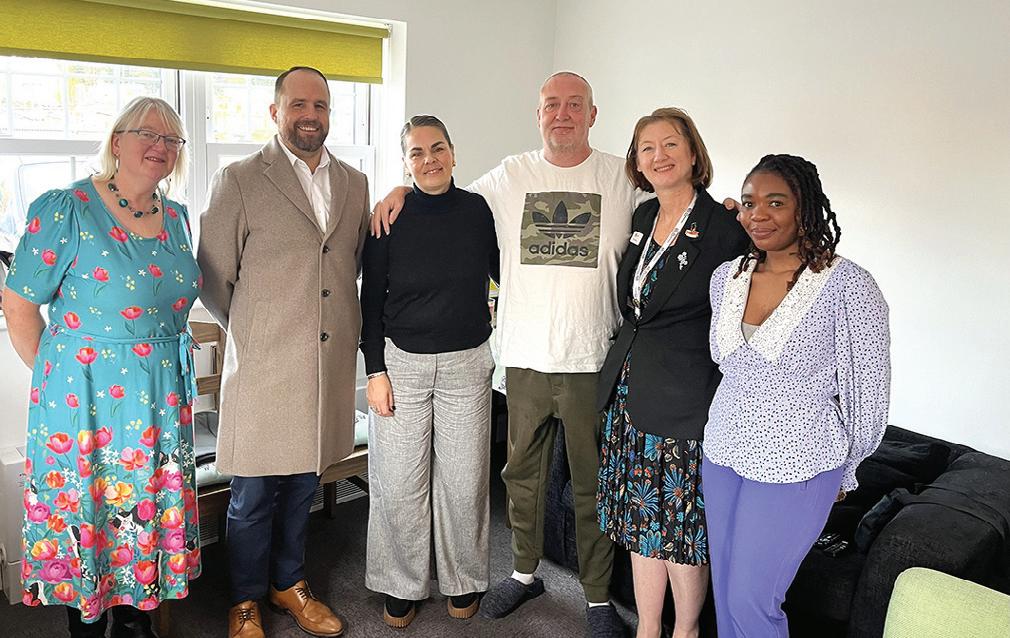
Belinda Robinson, Director of Development at National Care Group, said: “We are proud to be collaborating with West Northamptonshire Council to deliver person-centred support at this wonderful new service, expanding our provisions in the region. Our established partnership, alongside our network of supported accommodation already in the area, enables us to provide the highest-quality support that meets local needs.
“Ensuring that people lead rich and fulfilling lives within their community is at the heart of what we do. As
part of our community integration approach, we invited neighbours to visit the new development and learn more about the support we provide. It was a pleasure for our dedicated, local team to meet several neighbouring families. With doors now open, we’re excited to see tenants settle into their new homes and become active members of the community.”
The new, modern accommodation has been developed by Specialist Supported Housing, with partnerships between the local authority West Northamptonshire Council, adult social care provider National Care Group, local commissioners and housing provider reducing the need for out-ofarea placements and enabling people to live independently close to relatives.
Cllr Laura Couse, Cabinet Member for Adult Social Care and Public Health at West Northamptonshire Council, said: “This new supported living development in Moulton is a fantastic example of how we’re working in partnership to deliver high-quality, person-centred care that meets the needs of our residents. This facility offers a space where people with complex needs can live independently, feel safe, and be part of their community. We’re proud to see local jobs created and to welcome National Care Group’s continued investment in West Northamptonshire. This is a positive step forward in ensuring everyone has the opportunity to thrive close to family, friends, and familiar surroundings.”
Almost one in five patients in Emergency Departments were being cared for in trolleys or chairs in corridors in England this summer, with socalled ‘corridor care’ leaving people feeling ‘forgotten and vulnerable’.
That’s among the key findings contained in a major report on the state of corridor care in A&Es, published today (10 November) by the All-Party Parliamentary Group (APPG) on Emergency Care.
Titled Corridor Care, the research, compiled by the Royal College of Emergency Medicine (RCEM) which acts as secretariat for the APPG, reveals what patients are experiencing when they seek urgent or emergency care in ED, the harm they are exposed to, and what needs to be done to address this crisis.
So-called ‘corridor care’ refers to the practice of providing patient care in clinically inappropriate areas such as corridors, waiting rooms or other temporary spaces which are not designed or equipped to treat patients in.

Corridor care is a visible symptom of the pressures facing the entire system. These pressures include shortages of staffed hospital beds and delays in discharging patients due to gaps in community and social care provision. This creates a bottleneck in hospitals, with those requiring admission remaining in Emergency Departments for extended periods and care being delivered wherever space can be found.
Between 30 July – 13 August 2025, RCEM polled Clinical leads – who oversee A&Es – to capture a snapshot of the prevalence of corridor care and the standard of care patients were receiving.
In total, representatives from 58 Type 1 Emergency Departments across England responded. THEY REVEALED:
• Across the EDs in our sample, 19% of patients were being treated on trolleys or chairs in the corridor. That’s almost one in five attendances who were being cared for in an inappropriate setting, during a summer month, when there has historically been respite.
• 5% of respondents had patients being cared for in ambulances outside their department
• Over three quarters of respondents (78%) felt patients were coming into harm in their department due to the quality of care that can be delivered under current conditions
• Given that corridor care has become a perennial issue, it is no surprise that this concern is impacting the public’s confidence in Emergency Departments.
Exclusive public polling conducted on behalf of the APPG by Ipsos* across Great Britain found 58% of respondents are not confident that their A&E would provide a timely service.
Meanwhile, over a quarter (28%) of respondents to the nationally representative survey said that they were not confident that they would be treated in a clinically appropriate area, and 42% reported hesitancy around attending due to concerns about long waiting times.
Free text responses to a further RCEM survey, conducted in partnership with the Patient’s Association, revealed testimonies about what people experienced in EDs.
One respondent said: “Corridor care has affected my confidence. I would think twice about going to A&E again unless it was absolutely unavoidable. The experience of being left on a corridor made me feel forgotten and vulnerable. I worry that if I went back, I might not be treated in a timely or safe way.”
Another said: “While I know staff are doing their best, the environment didn’t feel like the right place to
receive care, and that has shaken my trust.”
To improve the experience of patients in Emergency Departments, and teams working in them, the report makes a series of recommendations to address the crisis, including targeted improvements to patient through a reduction in delayed discharges, reforms to funding and focusing on 12hour waits.
The APPG on Emergency Care pledged to look into corridor care earlier this year, after RCEM published analysis revealing there were more than 16,600 deaths associated with long A&E waits before admission in England last year.
The informal cross-party group brings together Parliamentarians who will engage with healthcare professionals and organisations outside government to advocate for improvements in Urgent and Emergency Care, with the secretariat function being provided by RCEM.
Dr Ian Higginson, President of The Royal College of Emergency Medicine said: “This report reveals the reality of so-called ‘corridor care’ in England. Put simply – it’s a source of national shame.
“Every day, patients are counting the hours they have been in ED, on trolleys in corridors, on chairs in unsuitable spaces, or simply in any available spot.
“Emergency Care never used to look like this. It’s incredibly disheartening for those working in our departments, who are doing everything they can to provide care under these conditions – and even more so for the patients through no fault of their own.
“It’s distressing, undignified, and it’s putting lives at risk.
“The situation is a visible sign that the system isn’t operating as it should – whether it is hospitals not operating fully effectively, or the inability to discharge people from wards who are ready to go home, as there aren’t appropriate social care options in place.
“This report, with its recommendations, is essential reading for all politicians, policy makers and healthcare leaders. We need meaningful change, before the crisis in our Emergency Departments deteriorates further. Lives depend on it.”
Dr Rosena Allin-Khan, who is the Member of Parliament for Tooting, a working Emergency Medicine Doctor, and Chair of the APPG on Emergency Care, said: “In emergency departments across the country, patients are being let down; stuck waiting hours upon hours, with many left to be treated in hospital corridors. It is unsafe, undignified, and symptomatic of an NHS that is stretched, working desperately to support patients but struggling to cope with demand.
“As an A&E doctor, I know my colleagues across the NHS work tirelessly for their patients. Staff are defined by their dedication, empathy and steadfast commitment to those in their care. In Westminster, we need to match their resolve, support frontline staff and give the NHS the resources it needs so that it is always there, free at the point of use, when we need it.
“Every patient deserves privacy, compassion, and high-quality care, not on a trolley in a hallway. Our cross-party group of Parliamentarians looks forward to working collaboratively with the Government, Ministers and NHS leaders to reach our shared goal – ending corridor care for good.”
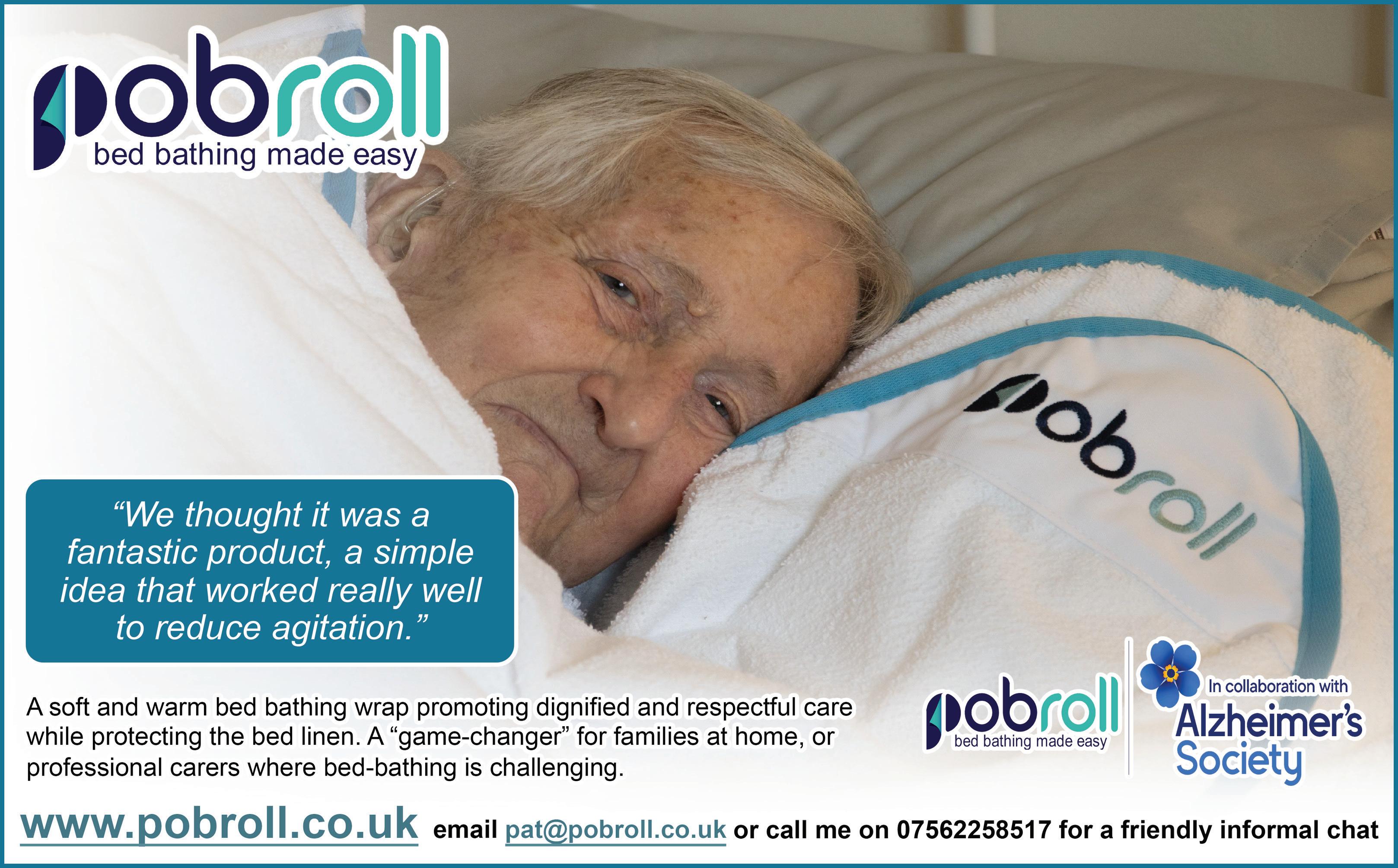
By Chaim Grunfeld, Founder and Director of connectivity specialists,

When the internet falls or the signal is inconsistent, it’s easy to blame Wi-Fi. We’ve all become so used to its ubiquitous presence that it has quickly become a one-size-fitsall descriptor for all kinds of connection problems, whether or not the issue is indeed wireless.
Likewise, when things go wrong, it’s only natural for care home staff to blame IT, demanding they swoop in and fix poor connection with signal boosters and upgraded incare-home hardware.
The issue is, capricious internet is not always an IT problem.
There are two different kinds of computer networks supporting the internet: WAN (or wide area network) and LAN (local area network). WAN is the pipeline delivering power into your building, whilst LAN makes up your internal system, including all routers, access points, internal wiring, and physical devices like printers.
Whilst poor internet can sometimes be a LAN problem, more often than not, it’s WAN letting the side down.
Think of it a bit like a radio. If the signal emitted by the broadcaster is broken, it doesn’t matter how great your radio is. You could have bought the latest, greatest model on the market, but without the right input, there’ll be nothing but static. Similarly, without the right WAN input into your building, connection will be poor, even if you’ve spent thousands on the best possible internet package.
FUELLING THE SYSTEM
Care homes that invest in great Wi-Fi – and top-notch routers and access points – are essentially sitting on untapped Ferrari potential if they don’t first secure a strong external connection. The car has been left to gather dust in the garage, not because the vehicle itself is faulty, but because the fuel going into the tank isn’t good enough to power it. If the right juice isn’t coming in, it’s unreasonable to expect to get the best results out – no matter how many upgrades you throw at it.
IMPROVING THE PIPELINE
Many care homes still rely on copper broadband or standard BT-style lines, often unaware that leased lines are an available alternative offering more dedicated, reliable connectivity. Shared lines are impacted by other buildings and users, which slows internet performance, particularly during peak times. A leased
line, on the other hand, acts like a private fuel supply, ensuring fast, smooth, uninterrupted connection. Think of the line into your building as a driveway. Shared with others, it can become congested, slowing everyone down. With a leased line, you have your own private way in, with zero obstacles, allowing data to flow freely.
In the UK, Openreach is responsible for providing the physical infrastructure that delivers broadband to properties, regardless of the type of line you select. For care homes, this often involves installing fibre-optic cables directly into the building. Before this can happen, however, a wayleave agreement must also be in place.
Wayleave agreements are essentially legal contracts that grant service providers permission to install and maintain equipment on private property. Without them, installation cannot be carried out, which is why it’s so important to seek informed, prepared providers capable of mitigating potential service disruptions.
Once your external connection has been established, it’s time to look at your LAN. Relying solely on IT teams to solve performance issues can be a mistake, inhibiting both potential and progress. Learning to continually audit and optimise everything from routers and access points to internal wiring is extremely important, as outdated or misconfigured internal infrastructure can easily produce bottlenecks with even the strongest WAN connection, limiting the benefit of upgrades.
Regular assessments and upgrades are therefore vital to ensuring the entire network can handle rising digital demands.
In recent years, the role of the internet in care homes has expanded beyond simple communication. Digital tools are now integral to daily operations, whether it’s carers providing entertainment and opportunities for social engagement to residents, or opting into potentially lifesaving telemedicine services that protect elderly and vulnerable people under their charge.
In other words, reliable internet is no longer all about Netflix or other, luxury whims. It’s about ensuring residents remain safe, healthy, and protected, while also ensuring they are able to maintain contact with loved ones remotely where needed. Homes that fail to invest in both WAN and LAN improvements thus risk falling behind the evolving standard of care, finding it increasingly difficult to fill spaces.
Understanding the difference between WAN and LAN allows care home managers to ensure their facilities are truly equipped to meet rising expectations. In a world where the internet is about so much more than keeping up with TV developments and actually makes a positive impact on care and wellbeing, robust internet infrastructure of every kind is a worthwhile investment.

Staff and residents at Barchester’s Hilton Park care home in Bottisham were treated to a visit from some beautiful therapy pets. Animals have a wonderful calming effect and the residents love to stroke them, talk to them and play with them.
The home was visited by a wide range of animals including rabbits, cats, dogs, guinea pigs and reptiles much to the excitement of the residents who thoroughly enjoyed the visit, especially petting and feeding the animals who seemed to appreciate meeting their new friends.
Michelle’s Animal Therapy said: “All of the animals had the best possible afternoon and I don’t think that they have ever had so much attention”
General Manager, Geanina Tinca said: “All our residents are fascinated by animals so we were delighted that all of these wonderful animals were able to visit. It was brilliant to be able to ask the animal handlers questions about working with the animals and what it is like to look after them. We loved hearing all about their different personalities.
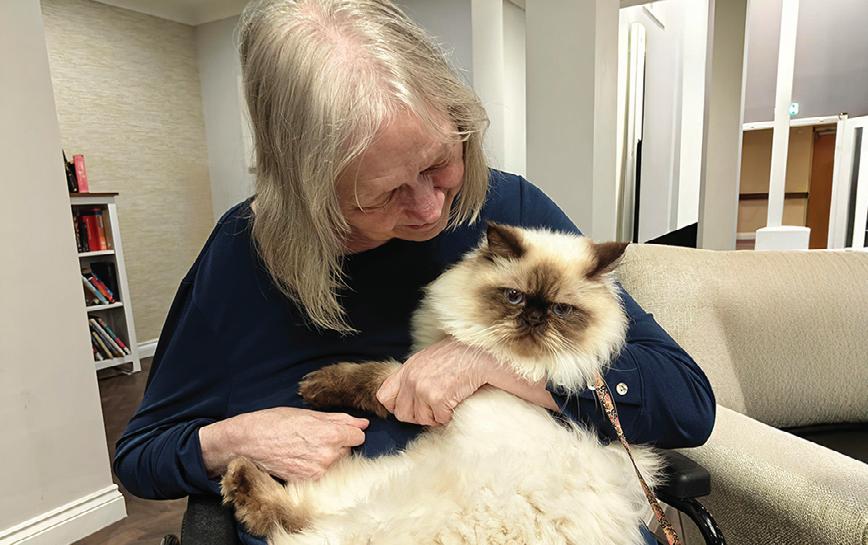
overseeing one of the largest senior care providers in the country. With a background that includes military service, Rob brings a deep sense of purpose, teamwork, and public service to his leadership.
At Signature, Rob will focus on continuing the company’s reputation as a best-in-class provider of luxury residential care. His priorities include overseeing the opening of three new homes in 2026, completing a wideranging refurbishment programme across existing homes, expanding partnerships with leading brands such as Fortnum & Mason, and enhancing the resident lifestyle experience through innovations, including an expansion of Signature’s wellness and wellbeing offer.

Rob will also be focused on longer-term organic growth, with Signature now seeking land for new development opportunities across the South East. A full list of target areas can be found at: https://www.signa-
ture-care-homes.co.uk/development
Rob Martin, Chief Executive of Signature Senior Lifestyle, said: “Signature has built an outstanding reputation for offering exceptional care in truly luxurious settings. I’m delighted to be joining a team that is passionate about excellence and innovation, while delivering care with kindness and compassion. Together, we’ll build on Signature’s many successes, and over the coming year, our aim is to expand our reach, refine and enhance our offer, and ensure our residents and colleagues continue to experience the very best of what Signature stands for.”
Simon Webster, Partner at Elevation, added: “We’re thrilled to welcome Rob to Signature. His reputation for excellence, track record of leading with integrity, his commitment to people, and his passion for delivering quality care make him the ideal person to guide Signature through its next chapter of growth.
“We also want to thank Steve Gardner for his leadership over the last year. We are delighted he will be resuming his role as Chief Financial Officer and that he will support Rob, and the wider group, to thrive in the years ahead.”
More patients will receive faster, more convenient care from the comfort of their own homes, through the rollout of new digital technologies across the NHS.
Dozens of new pilot schemes across England will use remote monitoring and self-reporting tools through the NHS App to help patients share updates on their health directly with specialists.
The government’s push to bring in more remote monitoring will allow patients to share key health information – such as blood pressure, oxygen levels, or other symptoms – without needing to travel for an appointment. This makes care more convenient, helps clinicians detect changes early, reduces pressure on hospitals, and frees up time for staff to see patients who need face-to-face care most.
The NHS is also launching a world-first clinical trial to support people living with motor neuron disease (MND) using remote monitoring tech, helping them to access breathing support from home. Patients with MND can suffer with symptoms such as difficulty with movement, speaking, swallowing, and breathing, with the trial seeking to improve quality of life.
The projects will help inform the wider expansion of remote monitoring across all long-term conditions, pledged by the government in its Elective Reform Plan. Once in full flow, remote monitoring is expected to free up around 500,000 appointments every year, so patients can be seen by specialists faster.
The government is transforming public services by harnessing cutting-edge technology and moving the NHS from an analogue to digital era through its Plan for Change.
Health and Social Care Secretary Wes Streeting said: Patients expect care fit for the 21st century and that’s what I’m determined to deliver. This is a government that puts the NHS and patients first as our record investment in the service shows.
“Using tech to bring care closer to home frees up hospital appointments for those who truly need them and makes life simpler for everyone. That’s our mission: care that’s easier, faster, and always within reach.
“Through innovative approaches like this and NHS Online – which will digitally connect patients to expert clinicians anywhere in England – we are building a smarter NHS all while easing pressures on busy hospitals and stretched staff.”
Many of the pilot schemes will focus on five key specialisms where the technology can make the biggest difference: ear, nose, and throat (ENT); gastroenterology; respiratory medicine; urology; and cardiology.
In many cases, patients will be able to complete digital forms and questionnaires via the NHS App rather than attending hospital, unless clinically necessary. Others with long-term conditions will be able to have routine tests carried out locally, with hospital specialists reviewing results remotely.
Ian Eardley, National Clinical Director for Elective Care at NHS England, said: “Right across the country the NHS is harnessing the latest technology to ensure people can get the care they need more quickly and conveniently, and closer to home.
“Remote monitoring enables vital information to be shared more easily and efficiently between patients and their health teams – allowing people to get the support they need without an unnecessary trip to hospital.”
Professor Lucy Chappell, Chief Scientific Adviser to the Department of Health and Social Care and Chief Executive of the NIHR, said: “As the nation’s largest funder of health and care research, the NIHR plays a vital role in supporting the NHS to adapt to changing needs and embrace new technologies. Funding world-class research into conditions such as Motor Neuron Disease helps build the evidence needed to improve care and leads to better treatments in the future.
“This work also supports the shift towards more care delivered closer to home, with digital tools offering more convenient access for patients, freeing up staff time and helping to reduce pressure on services.”
A gifted chef from Heathlands Residential Care Home in Pershore has claimed top honours in Sanctuary Care’s prestigious annual ‘MasterChef’ competition, showcasing exceptional culinary talent and creativity.
Ruaan Prins, Chef Manager at the not-for-profit care home, triumphed over fierce competition from chefs across England and Scotland, and after advancing through to the heats, wowed judges in a high-stakes live cook-off, crafting a stunning two-course menu in under ninety minutes.
His winning dishes reflected a twist on traditional fare. The main course featured a roasted rack of lamb accompanied by fondant sweet potato and a miso glaze, partnered with a vermicelli-wrapped king prawn, accompanied by a delicate plum dressing. For dessert, Ruaan served a rich chocolate fondant, with a refreshing mango ice cream.

Ruaan, who also won the competition in 2022 while working at another Sanctuary Care home, and has just launched hugely successful fine dining events at Heathlands, said of his victory: “I always push myself
to deliver the best, but winning first place again – along with Best Performing Chef for the Worcestershire region – was incredibly rewarding. I wanted to do this for Heathlands, to really put our home on the map. The dining experience means so much to our residents. It’s a very important part of their day and I’m so proud to do this for them and the home.”
This year’s event marked a special milestone for Sheila O’Connor, who retires as Sanctuary Care’s Director of Operations in the Spring, who oversaw the competition for the final time.
“Ruaan’s passion and culinary flair truly stood out,” she said.
“Each year, the competition grows in scale and talent, and this year was no exception.
With four intense heats, our chefs showcased the incredible skill and dedication they bring to enriching the lives of our residents. It was an honour to judge my final MasterChef event and witness the creativity and pride our chefs bring to the table.”

By Sabina Kelly RN Ba(Hons) B.Sc.(Hons) Founder of the Sabco

The Coronavirus pandemic turned our lives upside down, to such an extent that few of us have ever experienced in our lifetimes.
We have all had enforced government lockdowns, enforced social distancing, draconian fines for non-compliance, enforced minimal people allowed to visit your home, enforced blanket lock for the elderly and vulnerable care home residents.
We also had to face financial insecurity, enforced working from home, job losses, our children having enforced home schooling, furloughs, Mandatory wearing of face coverings.
If this was not enough, our leisure facilities were shut down. We could not go to the gym, could only have a walk within a five-mile radius, couldn’t eat a lovely meal in our favourite restaurant or go to the pub for a social drink with friends.
It really was very bleak picture, and our daily lives were severely impacted, and this was all to keep us safe from the virus.
This has continued to affect our lives in so many ways and has thrown up huge social issues.
I would suggest that loneliness has probably had the biggest impact on our mental health.
Lockdown violated our social spheres and shattered our social lives. It interrupted family relationships, friendships and social groups. We are not used to being constantly on our own. It can occur even when surrounded by people, often stemming from a lack of meaningful, personal connections rather than simply a lack of presence, and being unable to see family and friends left a lasting mark.
Loneliness has always been a social problem, even before Covid. It has always been there in both the young and elderly, but the pandemic impacted people on a national level and global societies as never before.
Separation from friends and family has affected us all, especially those elderly care home residents, who have endured a blanket of lockdown measures for over nine months.
Loneliness is a pervasive and serious public health risk among care home residents, linked to a host of

negative physical and mental health outcomes, including depression, anxiety, cognitive decline, heart disease, and increased mortality.
Residents had to tolerate no physical contact with their loved ones, being spoken to through an open window by a member of their family standing outside and wearing a face covering.
Therefore, this illustrates the nature of enforced separation. It is not something we have chosen. The government decided for us and we had no voice.
It is understandable that this was to keep the population safe and isolated from the virus. I don’t think any of us realised how dramatically it would change our lives. We were in shock and meekly complied with all these measures.
There was a sudden severing and disconnection from all those we hold dear and are familiar to us. We couldn’t go out shopping and had to constantly hear “non-essential items”, we heard death statistics every half hour on the news channels,
Elderly people living on their own were offered technological choices to assist living on their own such as online shopping, Facetime and Zoom but how realistic was this as an option?
Many people working from home were working in isolation. Some missed the camaraderie of going to work and interacting with their colleagues or going to the pub for a social drink and having a laugh. If we bring all these factors together, not only do they contribute to loneliness but have a dehumansing effect.
MST Teams and Zooms do not replace the human factor or replace that networking opportunity over a cup of coffee. Again, after the call, what do we do? We write up our notes in isolation. Indeed, this may lead to feelings of being abandoned, deserted and unwanted. Loneliness is subjective and may not be something we are willing to talk about. Is there a stigma to admitting we are lonely?
Would I admit that sometimes I feel lonely? No!
Loneliness is a deeply personal feeling. The withdrawal of social interaction may lead to feelings of anxiety, sadness and depression. It affects all corners of society LGBT, Disabled and sensory challenged, poor, living in a rural area, ethnic minorities, unpaid carers.
The late Jo Cox MP set up a commission to end loneliness, the commission sought out “conversations about how we can ensure that our future is one of connection, kindness and community, not isolation, separation and lonliness…young or old lonliness does not discriminate.
Neither did the pandemic. It ripped into our hearts and minds and whilst I understand, as do we all the measurements government has had to instill, I lament the lack of choice and decision making on our lives. I feel that we do not know the future consequences that lockdown has had on mental health and fear the cost may be extremely high. Lockdown has made us all very lonely at times.
While restrictions have long passed the legacy lives on, however, and I argue that the fear and memories of lockdown will not easily go away and our lives have been impacted that may, for some be hard to recover from!


• We specialise in the sale and purchase of quality used wheelchair accessible vehicles and ambulances.
• They can be bought as seen or refurbished and sign-written to your own requirements.
• Fully serviced, new mot & warranty
• Engineers inspection supplied if required.
• Free delivery service available
• All buses comply with new legislation
•
• Lease hire and purchase


Approximately 18,000 administrative and managerial positions within England’s National Health Service are set to be eliminated following an agreement between health officials and the Treasury regarding funding for severance packages.
The workforce reduction, announced by the government earlier this year, will primarily affect administrative and managerial roles. As part of broader structural changes, NHS England—the organization responsible for overseeing the health service—will be integrated into the Department of Health and Social Care, while local health boards will also face budget reductions.
Negotiations between NHS leadership and health ministers with Treasury officials centred on financing the estimated £1 billion in one-time costs associated with the redundancies. While health service officials initially sought additional funding, the Treasury rejected that approach. Sources familiar with the matter indicate a compromise has been reached allowing the NHS to exceed its budget this year to cover the costs.

The arrangement is described as a “pragmatic step” by officials, who note that the job cuts will generate savings in subsequent years. The NHS will be required to offset the initial overspending through those future savings.
Government sources emphasize that no additional funding beyond what was allocated during this year’s spending review will be provided to the health service. That review approved an increase of £29 billion annually above inflation by the 2028-29 fiscal year.
Health Secretary Wes Streeting defended the restructuring during a morning broadcast interview, stating that feedback from both patients and NHS employees indicated concerns about excessive bureaucratic layers within the organization.
“People want to see the front line prioritised, and that is exactly what we’re doing,” Streeting explained, noting he would communicate to NHS leadership that the health service is “finally on the road to recovery” during an address on Wednesday.
Speaking at the NHS Providers’ conference in Manchester, Streeting is scheduled to emphasize fiscal responsibility while outlining the government’s vision for redirecting resources.
“I want to reassure taxpayers that every penny they are being asked to pay will be spent wisely,” he is expected to say. “We’re now pushing down on the accelerator and slashing unnecessary bureaucracy, to reinvest the savings in front-line care.”
Government officials project the reforms will generate £1 billion in annual savings by the end of the current parliamentary term, with those funds designated for patient service improvements.
According to government calculations, each billion pounds saved from administrative costs could fund approximately 116,000 additional hip and knee surgical procedures.
Streeting is expected to acknowledge that transformation will require time, stating: “It won’t happen overnight, but with our investment and modernisation, we will rebuild our NHS so it is there for you when you need it once again.”
BMA chair of council Dr Tom Dolphin said: “The Secretary of State plans to save large sums of money from reducing bureaucracy, but we are concerned about the effect of losing many roles at once from NHS England on the ‘shift to prevention’, especially in public health and planning, and the impact on all staff losing their livelihoods.
“To suggest these projected savings could fund an extra 116,000 hip and knee operations may well be the case, but we do not have enough surgeons, anaesthetists and other theatre staff, or operating space fit for purpose, to meet existing demand. We need to see the money spent filling gaps on rotas, creating much-needed training jobs for resident doctors, and restoring the value of staff salaries to show that our worth is recognised. And let’s not forget the NHS maintenance backlog standing at nearly £16 billion, with many hospitals struggling with unsafe, outdated buildings. We hope the Health Secretary will recognise that investment in staff, training and buildings and equipment is needed if the savings he is talking of are to truly translate into improved patient care
“The BMA will always stand up for a health service that is safe for patients and safe for staff. That means improving pay, training and working conditions so we can retain and recruit the doctors needed to deliver timely, high-quality care. We share the Health Secretary’s desire to see the money spent wisely, and look forward to discussing what wisely looks like.”




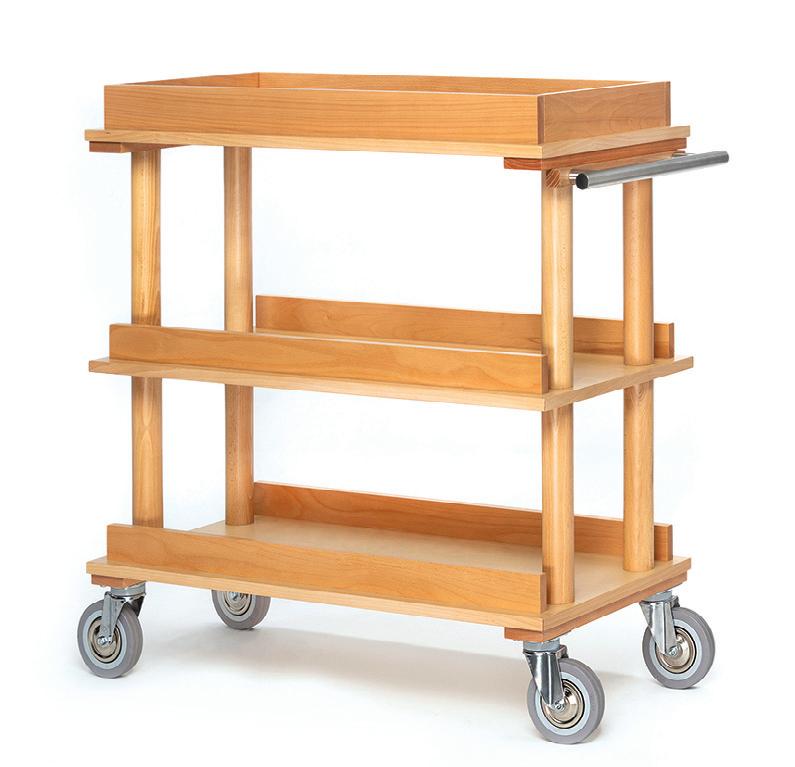

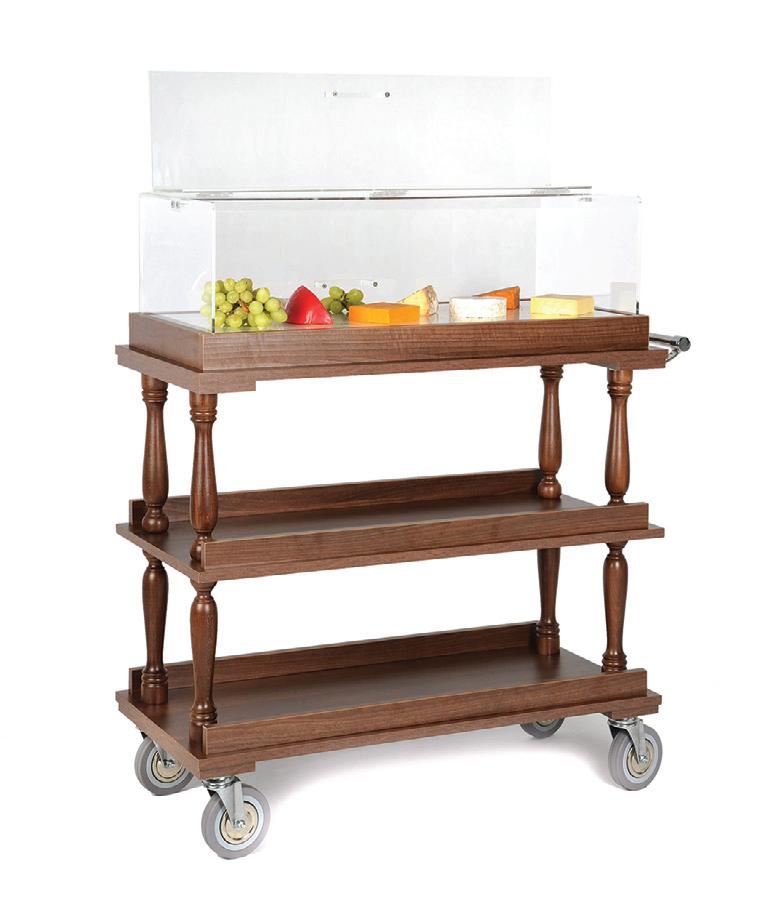
website
Nine colleagues from a Workington home are set to dip their toes in the Irish Sea to raise funds for the home.
Teresa Heatherington, Louise Hodgson, Jade Armstrong, Brenda Smith, Rihanna Tuck, Yasmin Scott, Sharon Clarke, Tracy Nicolson and Yvonne Burrows all work at MHA Amathea and will be sea dipping in the Irish Sea in St Bees.
The group of nine are hoping to raise money for the homes amenities fund and are planning to use the money raised for a Christmas Fair.
The event is set to take place on the 30th of November, and a Just Giving page has already been set up, where more than £300 has been raised.
One of the participants, Sharon Clarke, who works as an activity coordinator said: “The sea dip was my idea, as we were looking for ways to give our amenities fund a boost.
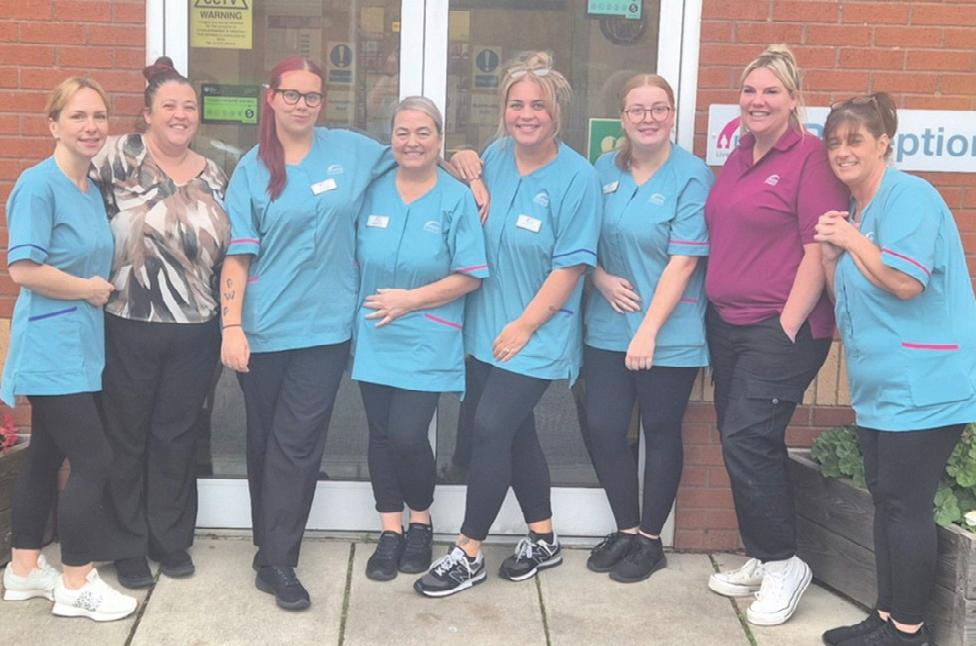
Pet therapy has become a part of the everyday routine in many care homes in the UK. The positive impact animals can have on the well-being of residents is well documented. But bringing animals into a care setting brings its own problems. It can be expensive and disruptive, they can be temperamental, and even the cleanest pets raise hygiene issues.
V-Thera virtual pets allow you to offer all the fun and engagement of a real pet, but in a clean, predictable and flexible way that fits in perfectly with your care home routine.
From the moment the resident first puts the headset on, they are engaged and delighted as the pet sits, lies down, rolls over and feeds on command. They can even throw a ball for the pet to fetch. The experience is involving, relaxing and stimulating, enhancing a positive mood while encouraging movement and communication.
The pets themselves are wonderfully realistic, not just in the way they look, but in how they act. There are four dogs to choose from, and there’s even a moggie for cat lovers. They respond to voice or hand commands, or to big buttons on the screen. It’s ideal for previous pet owners, but also people nervous of animals.
V-Thera uses the latest Japanese mixed reality technology, meaning the virtual pet appears in the realworld, viewed through the headset. Seeing the familiar surroundings of their care home lounge reduces any sense of anxiety or disorientation for residents. The app can also be used lying down, so it can be used in bedrooms.
The technology itself is completely intuitive, designed for people with no experience of gaming. The headset reads hand movements, so there is no need for hand controls after set-up. Setting the app up is
“I mentioned the idea to other colleagues, and they were happy to be a part of it.
“I can be persuasive when I want to be, but thankfully the other eight didn’t need too much convincing
“It will be an exciting challenge, especially given the time of year we are doing it, but I am sure it will be worth it.
“Most of us will just be dipping our toes in the water, which is also a big achievement as the water will be very cold.
“Weather permitting, we are hoping for some of the residents to come down and show us some support, which will be nice for them as well.
“So far the response from supporters has been very positive and we are hoping to exceed the target of £500 we have put on the page.
“It should be a good event, we are quietly looking forward to it and just want the day to come.”
easy and quick for staff, with no training required. It comes preloaded onto the latest Quest 3s headset, so it’s a simple matter of staff switching the headset on, selecting the V-Thera icon, selecting the dog – which you can name – then transferring the headset to the resident. They are immediately immersed in playing with the dog or cat.
The makers recommend sessions of up to ten minutes at a time, it’s very easy to accommodate the technology into the life of the home, and for staff it can create an excellent opportunity to bond with residents. A sharing function even means the sessions can be cast to other screens so all residents can share the experience.
The potential of new technologies like V-Thera for engaging with residents in a positive way points to an exciting future. The combination of advanced Mixed Reality with intuitive and thoughtful design means care homes can adopt the latest technology without disrupting the care routines already in place.
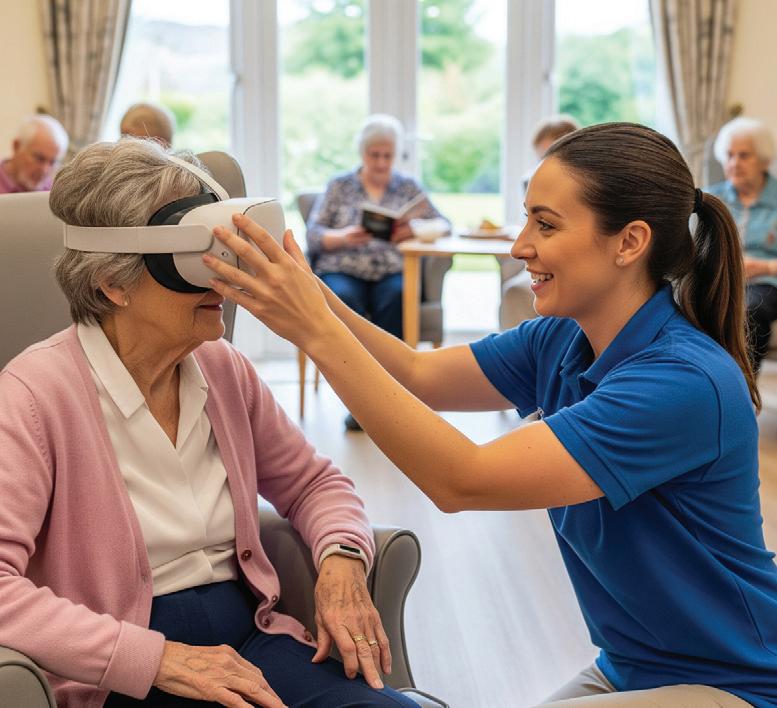
V-Thera was created in Japan by Remedy & Co and is available now in the UK through Care Activity Ltd. Managing Director Alison Lang says, “The minute we saw V-Thera, it was clear to us that this was an exciting innovation, a new way to offer something genuinely engaging to care home residents. The pets are fun, realistic and always ready to play. It is technology that brings care to life.”
Contact alison@careactivityxr.com www.careactivityxr.com
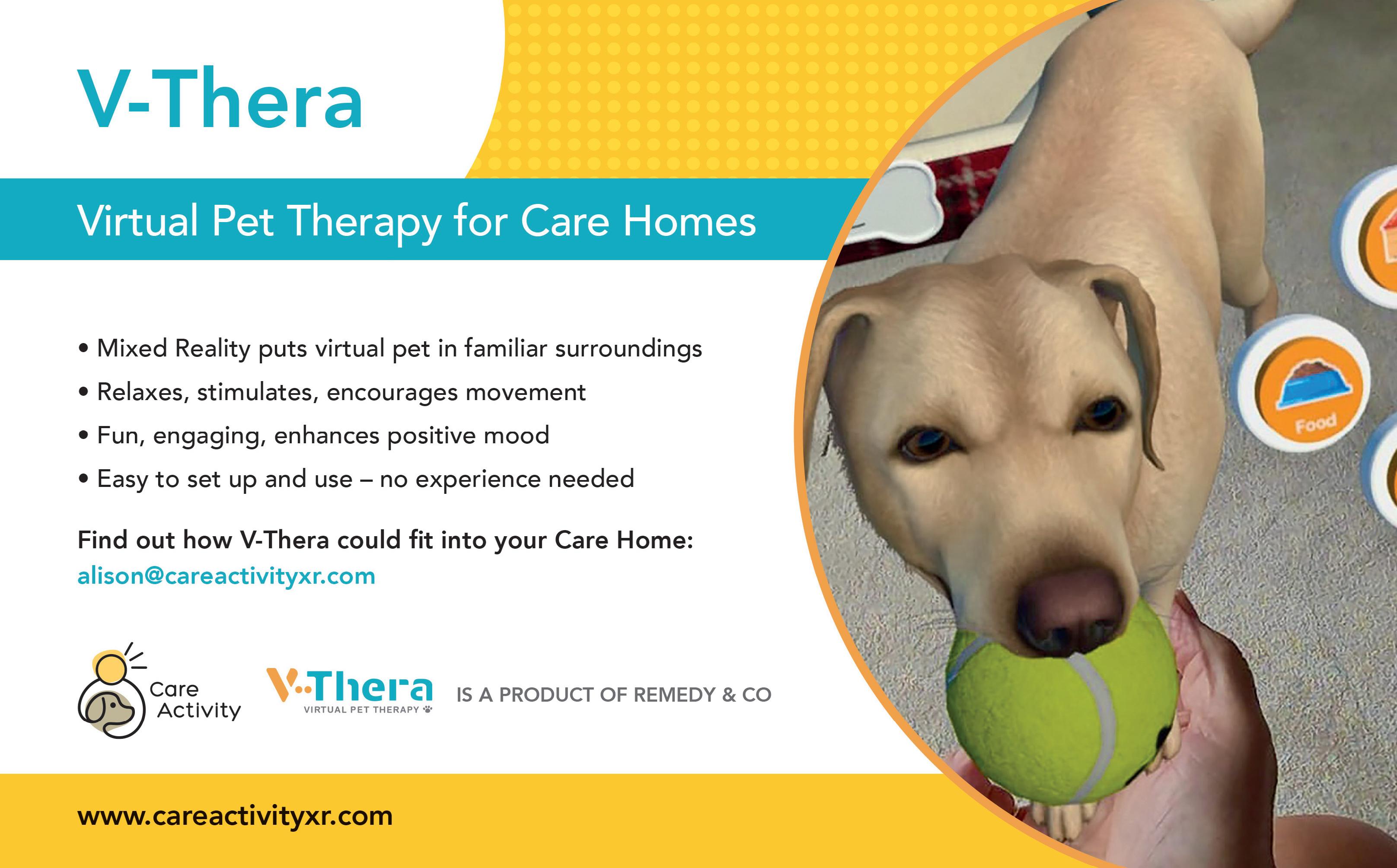
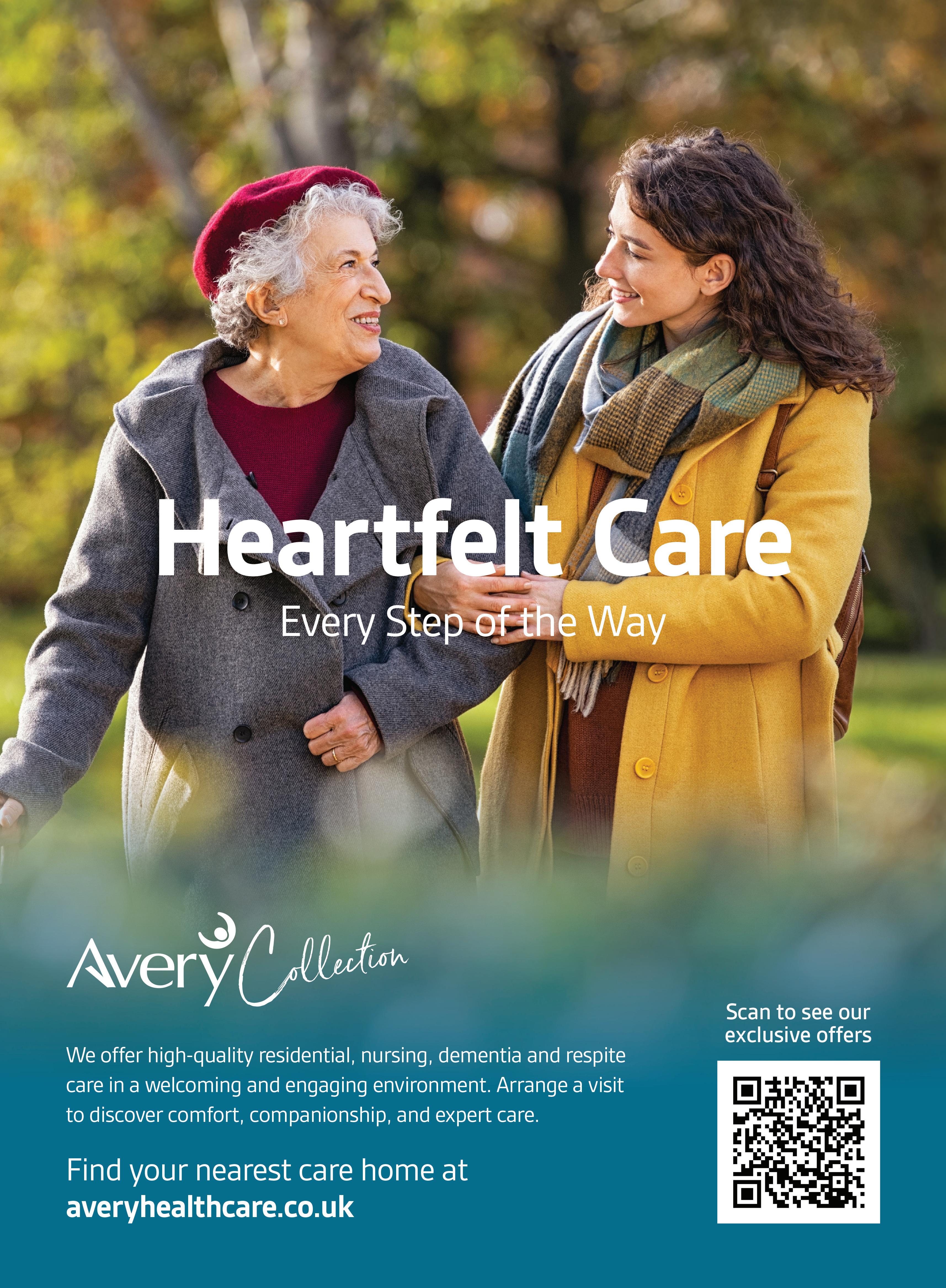



As we turn the pages of this special supplement, we are humbled by the depth of remembrance that lives within our care and nursing homes across the United Kingdom. To every reader who has taken the time to share your stories – thank you. Your contributions have created something truly meaningful: a tapestry of memory, respect, and community that honours both the fallen and those who carry their stories forward.
The accounts you have sent us reveal the profound ways in which Remembrance Day resonates throughout the care sector. From quiet moments of reflection in residents' lounges to elaborate commemorations involving local communities, each story speaks to the dedication of care staff who understand that remembrance is not merely an annual obligation, but a living connection to the experiences that shaped our residents' lives.
Within these pages, you will find stories of veterans who selflessly

served their country, residents who lived through the Blitz, who waited for loved ones who never came home, who worked in factories and fields to support the war effort. Their memories, carefully preserved and respectfully shared by the staff who care for them, remind us why this act of remembrance matters so deeply.
To the care home managers, activities coordinators, nurses, carers, and volunteers who have shared your photographs, your residents' testimonies, and your accounts of commemoration – thank you for entrusting us with these precious moments. In doing so, you have created a lasting record of how our sector ensures that the sacrifices of past generations are never forgotten, and that those who remember them are honoured in their later years with the dignity and respect they so richly deserve.
We will remember them.

Residents and staff from Park View Care Home, part of the Runwood Homes Group, came together on Remembrance Sunday, 9th November 2025, to honour and remember those who bravely served our country. The group, led by Home Manager, Dani, visited the historic Leamington Spa War Memorial to pay their respects and reflect on the sacrifices made by generations before them.
The memorial, which has stood since 1922, commemorates hundreds of local lives lost in the World Wars and other conflicts. Residents and staff dressed in remembrance-themed attire, many wearing poppies and formal wear to mark the solemn occasion. Together, they observed a two-minute silence, standing side by side in quiet reflection and unity.
As a symbolic act of tribute, the group also laid a poppy wreath at the base of the memorial, a heartfelt gesture that deeply moved everyone present.
Home Manager, Dani, shared: “I wanted to do something
meaningful for our resident, especially those with personal connections to the military and wartime memories. Visiting the memorial gave us a chance to honour those who served and reflect on the sacrifices they made. It was a simple gesture, but one filled with emotion and respect.”
Lifestyle Team Representative added: “It’s a privilege to be part of this special moment. The residents were deeply moved, and you could feel the sense of pride and remembrance in the air. These experiences are so important, they connect us to our past and bring our community closer together.”
Resident, John, reflected on the day, saying: “Being here today reminded me of the importance of remembering those who gave everything. It’s something I’ll never forget.”
The visit embodied the true spirit of Remembrance Sunday, reflection, respect, and unity. It was a powerful reminder of the importance of remembering the past while bringing the Park View community together in gratitude.
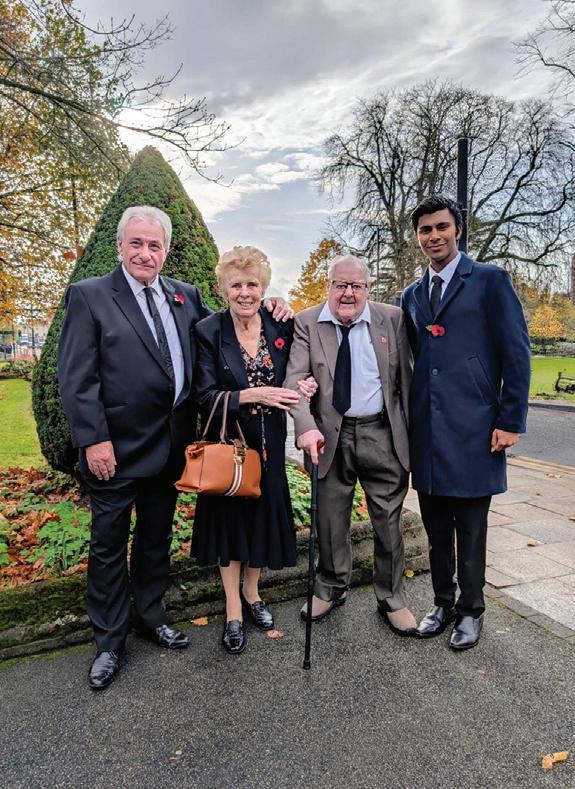


Care home residents in the south have marked Remembrance season by contributing to community events, making poppy displays, attending services and hosting visits.
The annual festival of Remembrance is a feature at all 21 Colten Care homes with residents, families and team members coming together to honour the fallen.
At The Aldbury dementia care home in Poole, residents spent a week making 106 tissue paper poppies, one to mark each year since the signing of the Versailles peace treaty in 1919 that officially ended the First World War.
Companionship Team Leader Sue Miles said the artwork project, put on display at the home, prompted conversations among some residents with their own childhood memories of World War Two.
They spoke of carrying gas masks to school in tins, sheltering when air raid sirens went off and hearing the distinctive and terrifying buzz of V-1 ‘doodlebugs’ flying overhead on enemy bombing raids.
At fellow dementia care home Fernhill in Longham near Bournemouth, residents knitted and crocheted poppies to contribute to a huge community display.
Featuring more than 2,500 handmade poppies
Ferndown, the display became a focal point with

townspeople and visitors pausing to admire the tribute and share in the spirit of remembrance.
Fernhill residents Kiki Tormey and Ron Howes were among hundreds of people who attended the town’s Remembrance parade alongside Guides, Scouts, Cadet groups, community leaders and representatives of armed forces organisations.
In a similar vein, residents at Colten Care’s Brockenhurst home Woodpeckers responded to an invite from the Royal British Legion to knit 310 poppies as part of a display at St Thomas’ Church in Lymington.
Some of the ladies who contributed their handiwork, including Phyllis Farmer, dubbed the home’s ‘champion knitter’, went out on a minibus trip to view the display at the church.
At Abbey View in Sherborne, members of the Knit and Natter group added poppies they crafted to a cascade at the entrance featuring a wooden war horse and soldier gifted by the local Countrymen’s Club.
Resident and keen knitter Joyce Withey said: “It was such a pleasure to help to refresh our amazing poppy cascade net. The display looks great and is such a fitting tribute for Remembrance Day.”
Colten Care’s Chief Operating Officer Elaine Farrer said: “Remembrance is an opportunity for our residents and their families to reflect on their experiences and share their memories.
“Spending time with each other, and in the community, to produce displays means that everyone can talk about the meaning behind the poppies.
“This is an equally important commemoration for those of our colleagues who have served, or have families who have served, in the armed forces.”



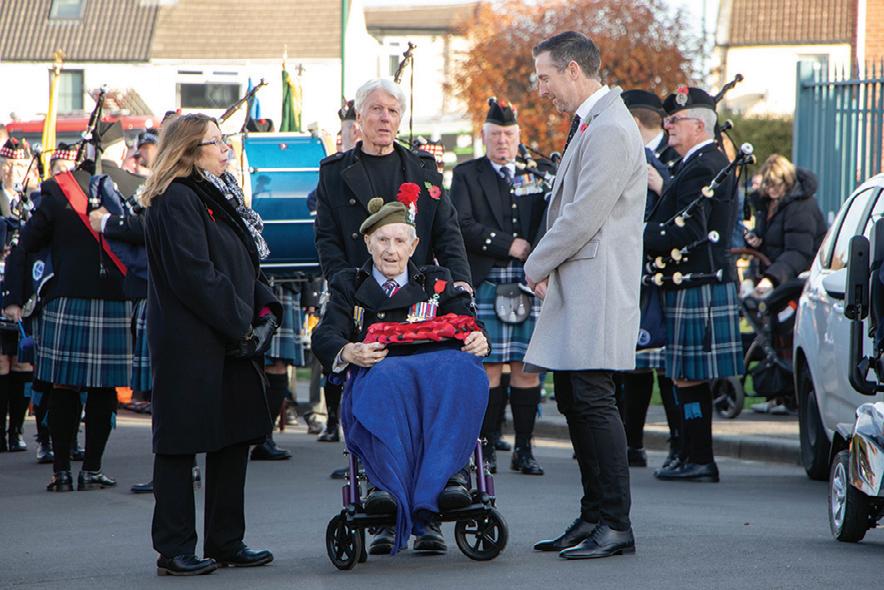
Ninety-nine-year-old Dennis Smith, a resident at Astune Rise Care Home in Eston, proudly took the salute at the town’s Remembrance Parade. Astune Rise is part of Popular Care, and both residents and staff were honoured to see Dennis recognised for his remarkable service and dedication.
His journey in the armed forces began aged 16, when he joined the Home Guard, two years before he was officially old enough to enlist. In 1944, he joined the Green Howards and was deployed to France, later serving with the Black Watch Regiment. His fought through Belgium and the Netherlands before reaching Germany, where he was based when the war ended.
Following the war, Dennis continued to serve with both the Lincoln Regiment and Worcester Regiment, taking part in peacekeeping operations in Italy before completing his military service back in Germany.
Earlier this year, his bravery and commitment were formally recognised when he was appointed to the rank of Chevalier in the Order national de la Légion d’Honneur, France’s highest distinction, awarded for his
“military engagement and steadfast involvement” in the Liberation of France during the Second World War. Astune Rise’s contribution to remembrance didn’t end there. Fellow resident Dorothea Quinn has been hand-knitting poppies all week to raise funds for the Royal British Legion, having already raised just over £100, some of which she will also use to treat fellow residents, through her efforts.
Caroline Bowstead, home manager at Astune Rise, said: “We’re incredibly proud of Dennis and deeply honoured that he continues to represent not only Astune Rise but also all those who served. His story is a living piece of history and a powerful reminder of the sacrifices made by so many. We were also thrilled to see Dorothy’s hard work supporting the Royal British Legion, she’s been unstoppable with her knitting needles!”
Steve Massey, operations manager at Popular Care, added: “It’s humbling to see residents like Dennis and Dorothy continue to inspire their community. Dennis’s lifelong commitment to service, and Dorothy’s generosity, perfectly capture the spirit of remembrance that unites us all this time of year.”
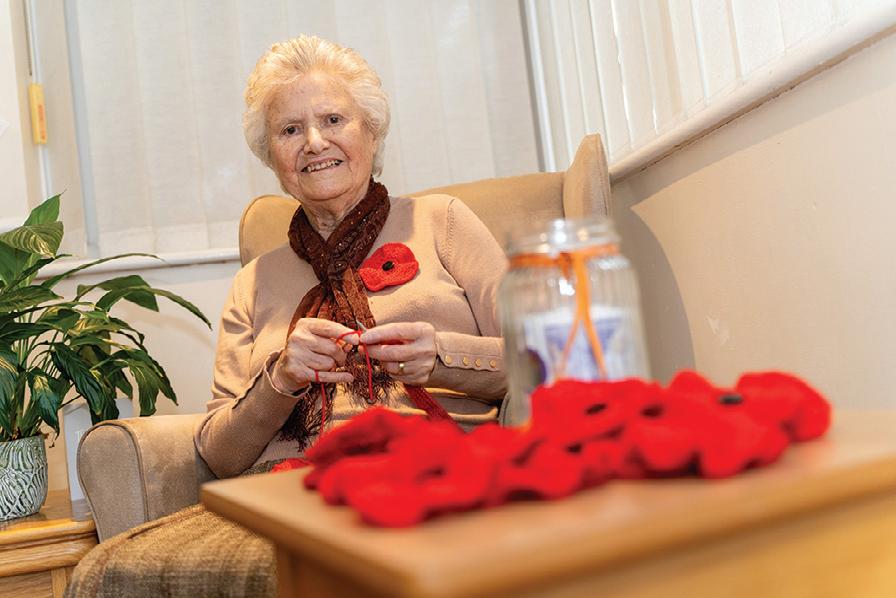
A Sanctuary Care resident was awarded a prestigious badge in honour of his military service, ahead of Remembrance Sunday.
Barony Lodge Residential Care Home in Nantwich, Cheshire proudly supports several veterans among its residents, including Colin, who was recently honoured with a commemorative badge from the Ministry of Defence. This recognition celebrates his service and the sacrifices he made during his time in the armed forces. Colin served in the Army as part of National Service, from 25 May 1957 to 25 May 1959. Much of his service was spent in Yemen, where he and his fellow servicemen faced challenging conditions. Despite the hardships, Colin speaks of his time in the military with quiet pride and thoughtful reflection.
Barony Lodge offers a strong sense of community and support for veterans like Colin. One of the highlights is the regular veterans’ breakfasts held in the nearby village, where Colin and other residents gather with current and former members of
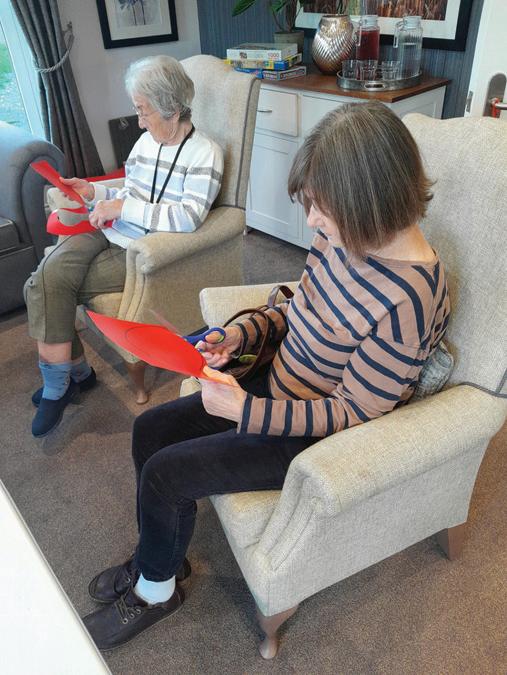


the armed forces. These events provide a space for shared stories and mutual understanding, something many veterans like Colin deeply value.
Outside of his military service, Colin built a long and successful career with Manchester City Council. He began as a clerk and worked his way up to become a Legal Executor in the City Treasurer’s Department. It’s a journey that reflects his dedication and work ethic, and one he looks back on with great pride.
One of Colin’s daughters fondly recalled how his military habits stayed with him throughout his life. “It always made me smile when Dad rolled his clothes to pack them in a suitcase (just like he’d been taught in the Army). He’s also very particular about polishing his shoes!” said daughter Ali Hughes. That attention to detail hasn’t faded. Barony Lodge’s Activities Coordinator, Claire Johnson remarked, “Colin is always impeccably dressed!”
Tewkesbury Fields in Bushley commemorated Remembrance Day on Sunday 9 November. They joined the rest of the United Kingdom in holding a two-minute silence at 11am.
As well as marking Remembrance Day by wearing poppies and watching the televised service from The Cenotaph, residents took part in therapeutic activities.
They also took the opportunity to share their amazing work that after months of dedication from their residents has been put to display at Tewkesbury Fields.
Since end of August this year, we have been very dedicated in creating one of the biggest Poppies display for the home.

It has been many hours of drawing, cutting, adding black stickers and many staples used on nets. We believe that we've cut over 2000 Poppies.
Jane a resident at Tewkesbury Fields said: “It is very important that we keep the memories of those who fought alive and that we also think about those involved in conflicts around the world today.”
Philipp Allwright General Manager at Tewkesbury Fields said:
“We have many residents with personal ties to the military and many who have experienced conflict either at home or abroad so it was important to us to mark Remembrance Day and honour the contribution of everyone involved in the World Wars and in subsequent conflicts.
Langdale House marked Remembrance Sunday with a gentle afternoon of music, silence and stories. Families came in through the front door with coats and umbrellas and soon the lounge felt busy in the nicest way. Flags were set by the windows, hymn sheets on every chair, and a table of paper poppies made in the craft group. Kerry Jean started us off and the room found its voice. It’s a Long Way to Tipperary rolled out bright and steady. Pack Up Your Troubles followed, then Going Back Home to the Place I Belong. You could see toes tapping and a few careful dance steps, the sort where someone holds your elbow and you grin without thinking. When the music paused we kept a full minute of silence. Heads bowed. A few hands held tight. The hush was deep, the sort that lets you hear the clock tick in the hall. People thought of those who served and those who never came home. After the silence the chorus rose again, softer at first, then sure and proud.
Stories began to flow. Mr T talked about the neighbour who always checked on his mum when the sirens sounded, a kind man who would knock the door, fetch a coat, and wait on the step until they were ready to go together. Mrs S remembered her father’s kit box and said the scent of polish and soap can still catch her breath. Mr A told his daughter about a street party the day a friend returned. Bunting on washing lines. Plates passed from door to door. A chair brought out for an older lady who wanted to sit near the music. Families added the tales they were told at kitchen tables and
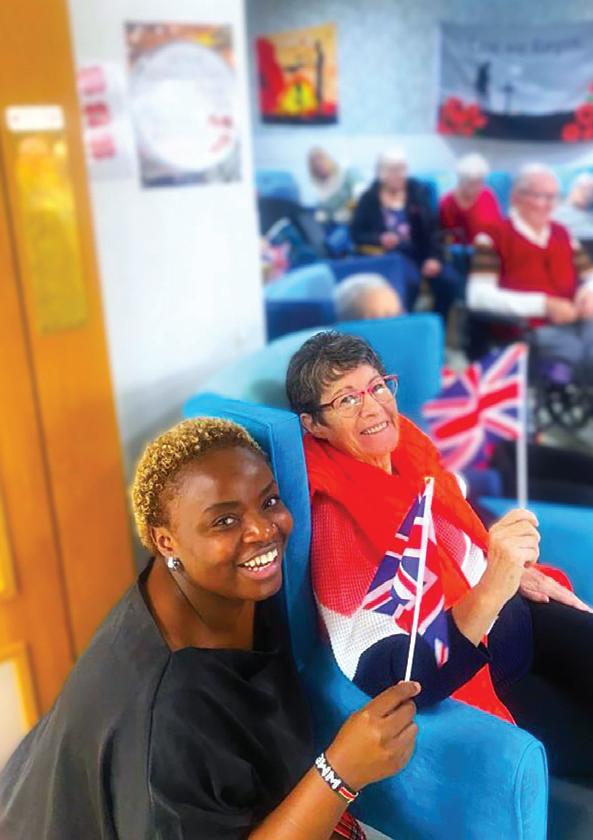
in letters kept safe for years. These small details brought the past close and you could see nods around the room.
The team shaped the afternoon so everyone could join in. Some sat close to the music. Others chose a quieter corner. We had large print sheets and comfy seating, and a member of staff on hand for anyone who needed an extra arm or a steady word. Tea and cake were never far away. Nothing fancy, just simple things done kindly so people felt included and at ease.
“It felt like the room breathed together,” said Sharon Syokau, Activities Coordinator. “The songs opened the door, then people stepped through with memories that mattered to them. It was tender and very human.”
Home Manager Joycee Jose added, “Remembrance means different things to different people. We try to keep it person centred so each resident can take part in a way that suits them. On Sunday you could feel the strength of this community.”
We finished with a last chorus and a gentle wave of flags. No rush to leave. People lingered to look at photos, thank the team, and tuck a poppy into a pocket to take home. The afternoon held both quiet and joy. It honoured service and sacrifice and it made space for togetherness. As the final note faded there was calm pride in the room and a shared promise to remember.

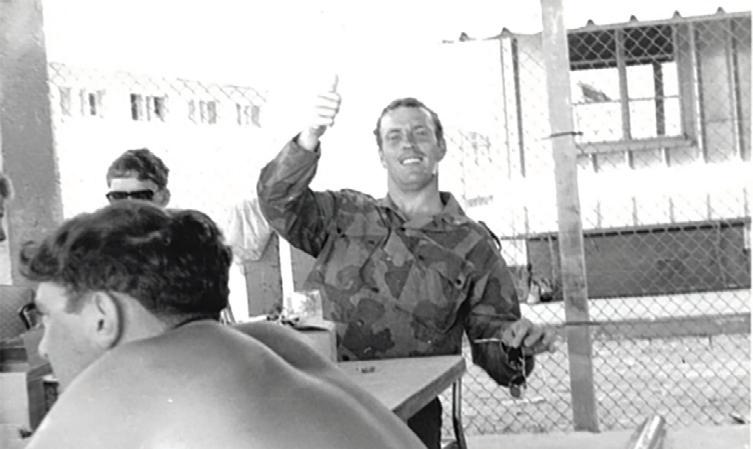
On Remembrance Day, we pause to honour former Corporal Pete Shepherd, because for him, service didn’t end when the uniform was folded away. It became part of who he is.
Pete joined the Royal Corps of Transport in 1965 at age 20. Over 12 years, he served five tours in Northern Ireland, including highrisk bomb disposal work during The Troubles. His courage in the face of danger helped lay the foundations for modern bomb disposal techniques. Pete also served in Germany and Bahrain.
Decades later, Pete was diagnosed with PTSD, a reminder of the long-term impact of military service. His story highlights the importance of charities like the Felix Fund, which support the mental health of bomb disposal personnel.
Despite hardships, Pete fondly recalls light-hearted moments, from babysitting a rabbit to mischievous regimental pranks. For his service, he received the General

Residents, staff, and visitors at Ivy Court Care Home, part of the Runwood Homes Group, have been deeply moved by a breathtaking Remembrance display created to honour those who bravely served their country. The display, unveiled on 4th November 2025, has drawn admiration and praise from everyone who has seen it, including family members, friends, and visiting professionals.
The stunning tribute was designed and built by Andy, the home’s Maintenance Operative, who worked tirelessly behind the scenes to create something truly special for the residents of Ivy Court. His dedication and creativity have made a lasting impression on the entire community.
Stacey, Home Manager at Ivy Court, said:
“Everyone visiting Ivy Court— from family and friends to visiting profes-
Service Medal with Northern Ireland clasp.
In 1971, Pete met and married Sally just two months after meeting – a love story that has lasted 53 years. After leaving the Army, he worked for 30 years at a Spam board factory, showing the same dedication he brought to military life.
Now living with a Dementia, Pete has also faced cancer and major heart surgery. His daughter Claire describes the heartbreak of placing him in care, saying, “Watching his dementia progress feels like constant grief.”
Since moving into Heanton Nursing Home in April 2025, Pete has been supported with care that honours his identity. His room is filled with military memorabilia, and he’s still proudly referred to as “Sergeant Shepherd.” His salutes and discipline reflect the deep imprint of his service, offering a sense of continuity even as his memory fades.

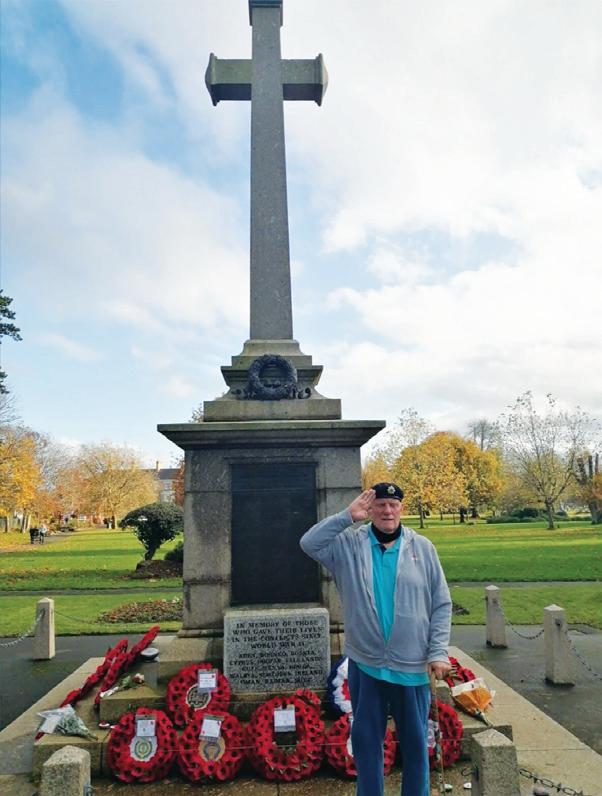

sionals — has been blown away by how beautiful the display is. This morning, our local GP even asked to meet the man behind this masterpiece. A standing ovation was given to Andy, our Maintenance Operative, for his incredible work.”
The display serves as a meaningful space for residents to reflect and remember those who fought for their country. The atmosphere during the unveiling was described as amazing and overwhelming, with a sense of pride and gratitude shared by all who attended.
Stacey added, “The feedback and praise we’ve received have been phenomenal.”
Andy’s hard work has created not just a display, but a heartfelt tribute that means so much to the residents and community at Ivy Court.
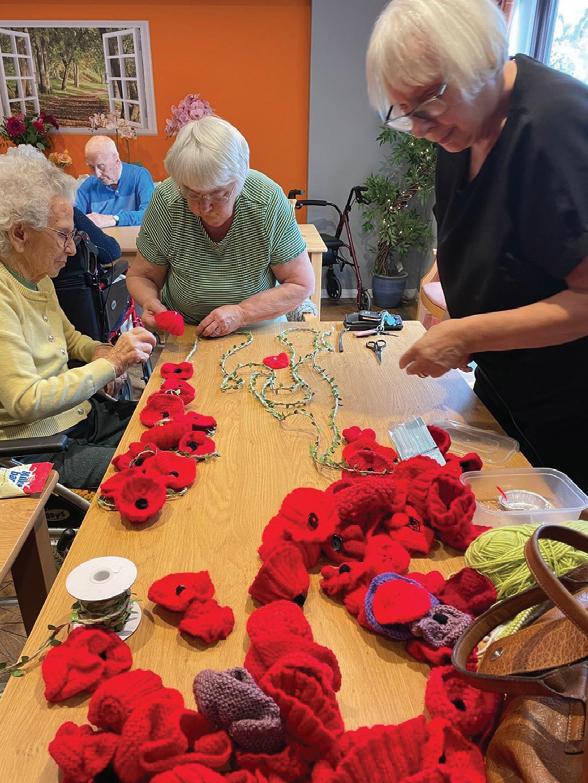
A group of care home residents at Kings Lynn residential home have created a stunning display of knitted poppies ahead of Remembrance Day.
Residents Pam, Edith, Druie, Catherine and Christine, assisted by helpers Julie (the Activities Co-Ordinator at the home) and Druie’s daughter Georgie have all been knitting poppies for the past 8 weeks to create a visually striking display.
Margaret from the local Knit and Natter group has been coming to the home on Kettlewell Lane on Tuesday afternoons to sit, knit and natter with the residents.
Julie Godfrey and Jo Taylor are the Activity Co-ordinators at the home: “We’re always keeping our residents busy doing little creative projects, and we have a special connection at the home to the Armed Forces and the Royal British Legion. All the knitters have really enjoyed working on this lovely project and the finished result is really striking.
“Remembrance week is always very poignant for so many of our residents, so to do this activity and for them to talk openly about their memories while knitting the poppies has been really special.”

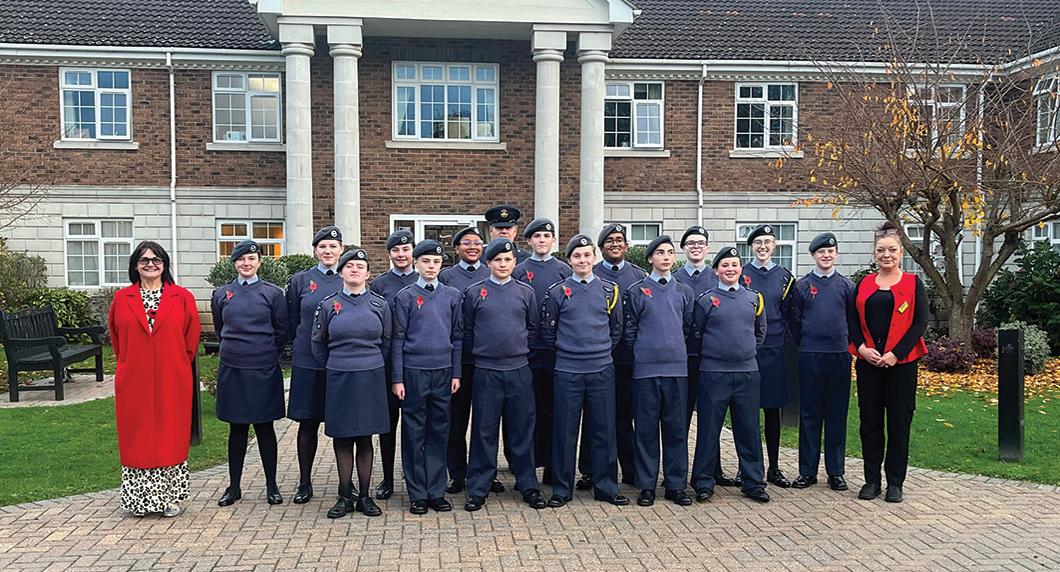
Residents, families, and members of the community came together at Rosedale Court Care Home, part of the Runwood Homes Group, on Sunday, 9th November 2025, for a moving Remembrance Sunday Afternoon Tea, featuring live wartime entertainment from singer Debbie Rainforth and a special visit from the Rayleigh 1476 RAF Squadron Cadets.
The event offered residents and guests a meaningful opportunity to remember and honour the fallen heroes who bravely served our country. The cadets performed a formal drill before joining residents and staff in a moment of silence during the Last Post.
Guests were treated to a nostalgic singalong by Debbie Rainforth, followed by a traditional afternoon tea with homemade scones, cakes, and sandwiches, lovingly prepared by Rosedale Court’s talented kitchen team, Betty and Emilio, who baked more than 80 scones for the occasion.
Louise, Lifestyle Lead, commented on the importance of the event:
“This is a very special day for our residents, as it is a part of history that can never be forgotten, and it is so important to remember our fallen heroes. Engaging our younger generation is also very important as they continue to be part of our forces for the future.”
Families and residents shared heartfelt reflections throughout the day:
“This is our first event at Rosedale and it’s been amazing.” said family members of resident, Peter.
“It’s been such a wonderful day and so emotional.” Added daughter of resident, Jean.
“I can’t believe you managed to get the RAF Cadets in to perform a drill and respect the Last Post with us all—it was fantastic.” Commented daughter of resident, Norman.
Residents also expressed their joy:
“Dancing with the cadets has been an honour,” said Clifford.
“The homemade scones are delightful,” beamed Dorothy.
“It’s just lovely that the air cadets have come to see us and join in our party.” said Reginald.
The Rayleigh 1476 RAF Squadron also added:
“Thank you so much for having us. We loved talking with the residents and helping throughout the day. It was an honour to meet those who lived through our wars and to perform a drill for them too. We can’t wait to come back and see you all soon.”

The atmosphere throughout the event was patriotic, emotional, fun, and deeply respectful, culminating in a powerful moment as sixteen cadets marched into the home and stood in silence for the Last Post, a highlight that deeply moved everyone present at Rosedale Court.


A veteran who served in the RAF for 32 years has spoken about the importance of observing Remembrance.
Bill Wheeler, who rose to the rank of Squadron Leader during an RAF career which saw him based in Canada, Pakistan, Kenya, Germany and the Middle East, said “it was more important than ever” to remember the sacrifices made by the Armed Forces.
The 98-year-old marked Remembrance at Royal Star & Garter’s Home in Solihull, where he now lives.
The charity provides loving, compassionate care and support for veterans and their families, living with disability or dementia, through its Homes in Solihull, Surbiton, High Wycombe and Worthing. It also provides services reaching into the community, including Lunch Clubs, Day Care and a national Telephone Friendship Service.
Bill joined the RAF in 1943 at 15 and went on to become a navigator, before leaving in 1975. During that time, he helped train fledgling Air Forces in Pakistan and Kenya, flew photographic reconnaissance missions in the Persian Gulf and along the North African coast, and worked on nuclear deterrence.
He said: “During Remembrance I like to think back on my time in the RAF and the people I served with. I think Remembrance has always been important but it’s probably even more important now with all these small campaigns that the military get involved in. Unless we have some sort of remembrance afterwards they will be forgotten completely. I think it’s important to remember the sacrifices that generations have made for this country.”
After leaving the RAF aged 48, he retrained as a teacher and taught maths and computer studies. He and
his wife Betty had a smallholding which allowed them to live self-sufficiently.
In their later years Bill and Betty moved to Birmingham and when his wife died in 2022, Bill was able to remain in the house and live independently. He kept fit and active and went on three-mile walks daily. However, when he required an operation on his leg which affected his mobility, Bill chatted to his sons and chose to move to Royal Star & Garter, becoming a resident at the Solihull Home in 2024.
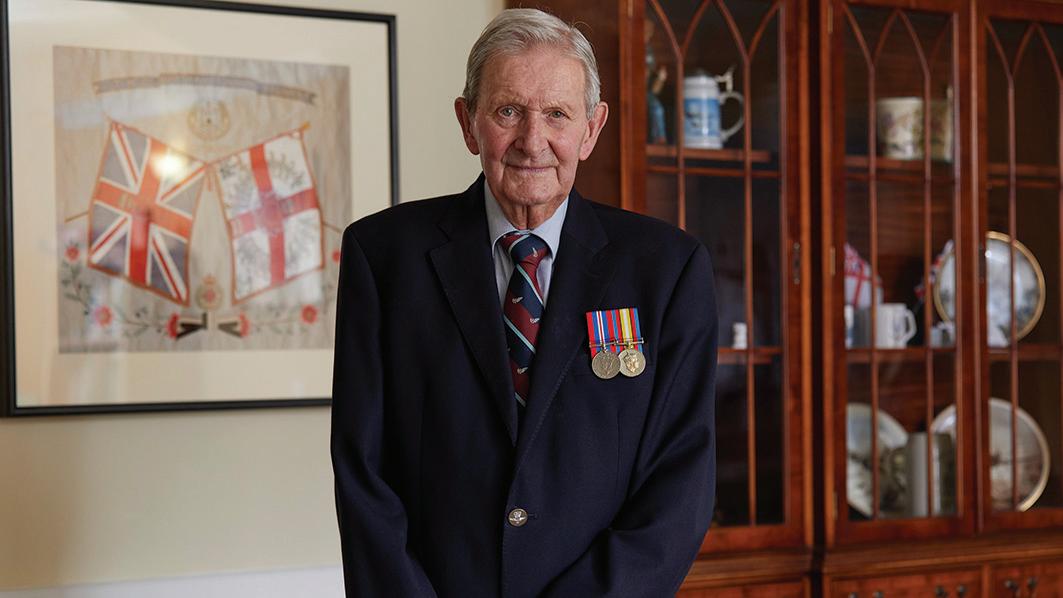
He said: “I wanted to come here because of its links to military service, which really appealed to me. And I enjoy being with other people who have also served and have similar experiences to me.”
Bill also said he values the emphasis the Home puts on key dates in the military calendar, such as Remembrance, Armed Forces Day and VE Day, and enjoys the visits from service personnel, plus outings to the nearby National Memorial Arboretum and other venues with military connections. “I feel that the shared experience and history of veterans and their partners is understood here, and it helps me feel connected to the past,” he said.
Residents, colleagues, and visitors at HC-One's Littleton Lodge Care Home in Hednesford, Cannock, came together to mark Remembrance Day with a heartfelt service on 12th November.
The Hednesford Branch of the Ex Staffordshire Regiment joined residents for the special ceremony, honouring the memory of those who served and sacrificed for their country. The event proved to be a moving occasion, featuring traditional elements such as the laying of wreaths, readings, and the two-minute silence, observed to remember the fallen.
The service took place in the home's beautifully decorated communal lounge, which was adorned with poppy displays created by residents and colleagues in the lead-up to the event. Music, poetry, and reflections were shared throughout the afternoon, providing a touching tribute to all those who have served in the Armed Forces, past and present.


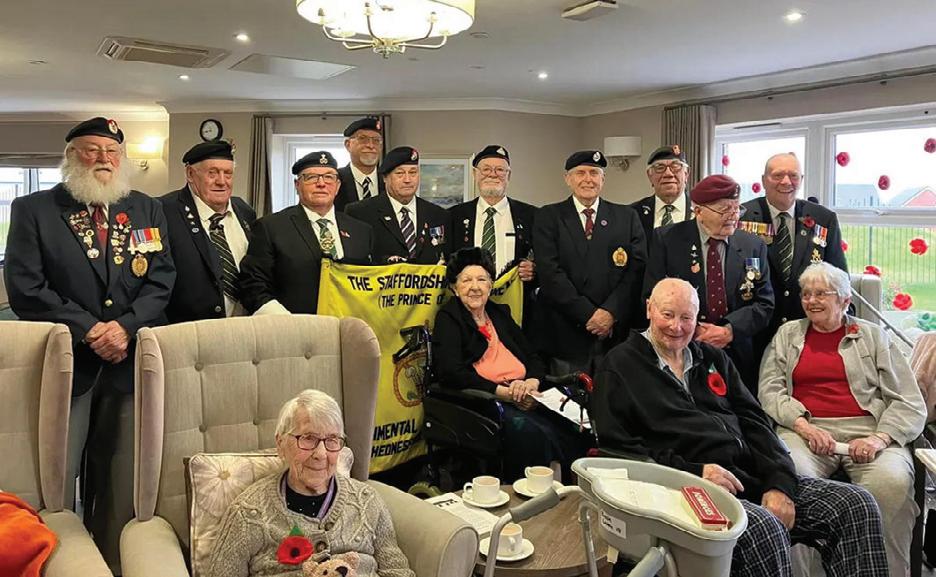
Following the ceremony, attendees were invited to enjoy light refreshments prepared by Littleton Lodge’s hospitality team, giving everyone the opportunity to share memories and connect with members of the local community and the visiting veterans.
Morgan Munroe, Front of House Manager at HC-One’s Littleton Lodge Care Home, said:
“Remembrance Day is a deeply significant time for many of our residents and families. We’re truly honoured to welcome members of the Ex Staffordshire Regiment to Littleton Lodge for what promises to be a meaningful and memorable afternoon. Our residents have been working hard on handmade poppies and displays to show their respect and gratitude to those who have served.”
Residents at Connell Court care home have been commemorating the 80th anniversary of Remembrance Day through a series of poignant activities honouring those who served.
Among the highlights was a special outing for resident Jim, who visited Southport to see the iconic Spitfire aircraft. The excursion proved to be a memorable experience, offering Jim the chance to connect with an important piece of wartime history.
Back at the home, residents have been participating in creative poppy craft sessions, providing an opportunity for quiet reflection during this significant time of national remembrance.
The activities form part of Connell Court's commitment to marking meaningful occasions and providing enriching experiences for residents throughout the year.
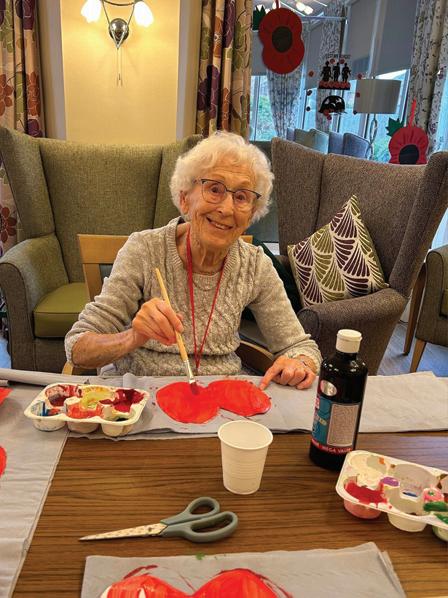

Residents and colleagues from HC-One’s Dove Court Care Home in Burnley, Lancashire, came together on Remembrance Sunday to honour those who made the ultimate sacrifice in service to their country.
Residents Margaret Phenix and Stephen Beardswood were escorted by Dove Court colleagues to Burnley Town Cenotaph, where they joined the local community for the annual parade and remembrance service. The event was well attended, with people from all walks of life pausing to observe the two-minute silence and pay their respects.
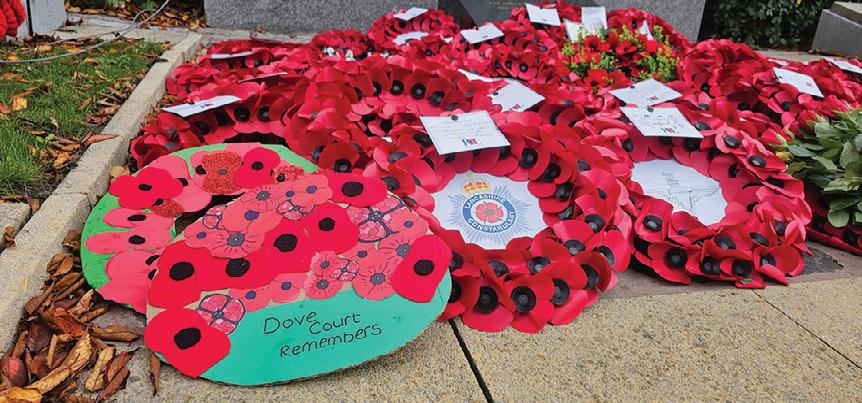
Margaret, a proud RAF veteran who will soon be celebrating her 100th birthday, will be celebrating her milestone celebration at Dove Court in style. During the event, Margaret met with many community leaders, including the Bishop of Burnley, Reverend Dr. Joe
Kennedy, with whom she enjoyed a heartfelt conversation. After the service, Dove Court residents placed handmade wreaths at the foot of the cenotaph in memory of the fallen.
Margaret Phenix, resident at HC-One’s Dove Court Care Home, commented:
“It brought back a lot of memories from when I used to come and visit the memorial.”
Lauren Kelly, Wellbeing Coordinator at Dove Court Care Home, said:
“It was a lovely service, so well attended, and we were pleased to give our residents the opportunity to pay their respects. We’re very thankful to all the dignitaries who came to wish Margaret well and took the time to hear her story.”

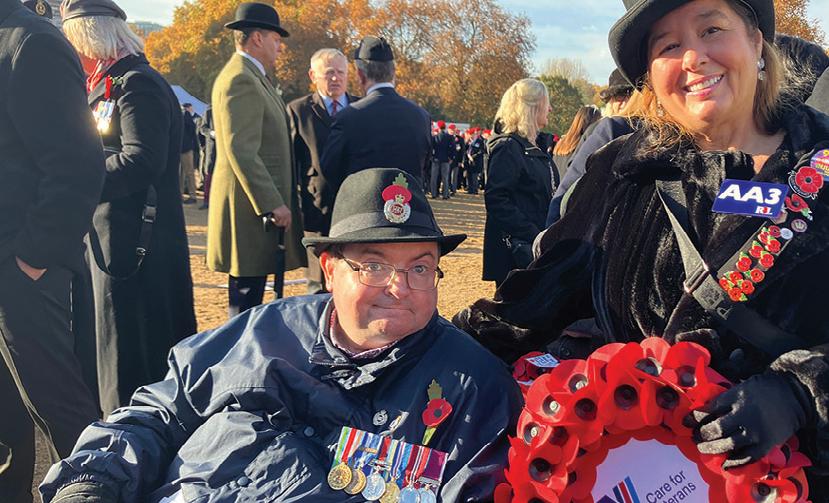
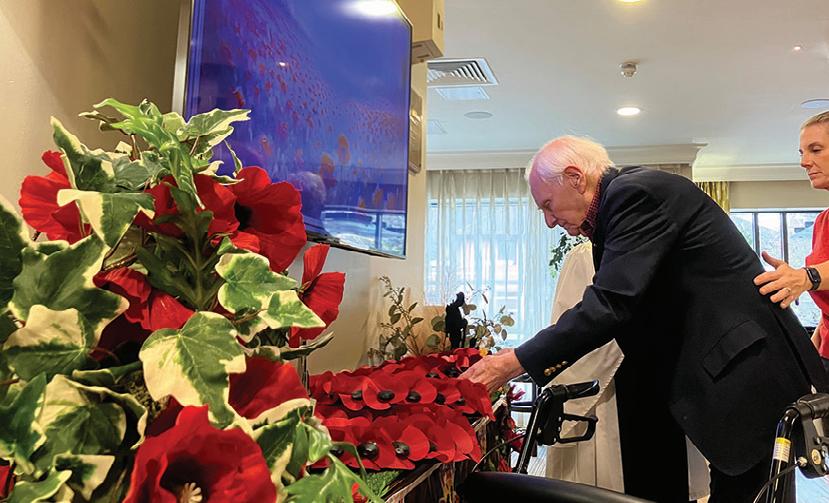
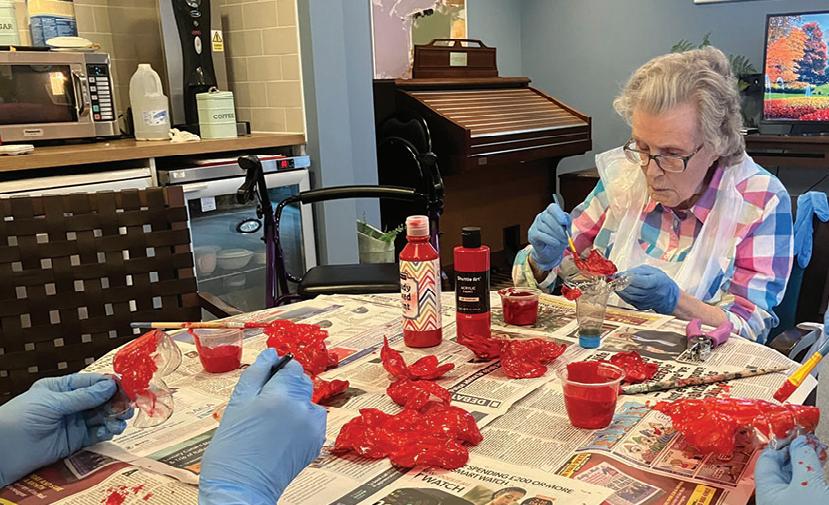
Veteran residents from Royal Star & Garter have marked Remembrance with events at their Homes and London’s Cenotaph.
They took part in services in the charity’s four Homes, while several attended the National Service of Remembrance at The Cenotaph on Remembrance Sunday 9 November.
Royal Star & Garter provides loving, compassionate care and support for veterans and their families, living with disability or dementia, through its Homes in Solihull, Surbiton, High Wycombe and Worthing. It also provides services reaching into the community, including Lunch Clubs, Day Care and a national Telephone Friendship Service.
Veterans from Surbiton, High Wycombe and Worthing were applauded by fellow-veterans and members of the public as they marched along Whitehall and past The Cenotaph on Remembrance Sunday. At the end of the March they were saluted by The Duke of Edinburgh.
Royal Star & Garter in Surbiton held its service on Armistice Day, Tuesday 11 November.
Trumpeter Vic Gilder played The Last Post, while Air Force veterans Vera and Michael gave readings. Army veteran Michael raised the Union Flag outside the Home. Afterwards, residents enjoyed tea, cakes and music.
The Solihull Home held its service on Monday
10 November, which featured a two-minute silence, a bagpiper, a bugler playing The Last Post and hymns. There were readings from staff, relatives and a Day Care user, before poppy wreaths were laid. Also attending were Armed Forces representatives from Queen Elizabeth Hospital and Birmingham City Football Club Foundation. Residents later took part in a Remembrance quiz.
At the High Wycombe Home, the Padre from RAF High Wycombe delivered a Remembrance service on Monday. The Home held a second service on Armistice Day, complete with bugler and wreath-laying. This was followed by a Remembrance tea party which was attended by High Wycombe Mayor Majid Hussain and personnel from RAF High Wycombe.
Care for Veterans held its service on Armistice Day. The two-minute silence started and ended with the ringing of the bell from HMS Fearless, which was presented to the Home over 50 years ago. The service was led by Father George Butler, who also read the names of residents from Care for Veterans who had died in the past year.
In the run-up to Remembrance, residents took part in various poppy-based arts and crafts, which were later used to decorate the Homes.

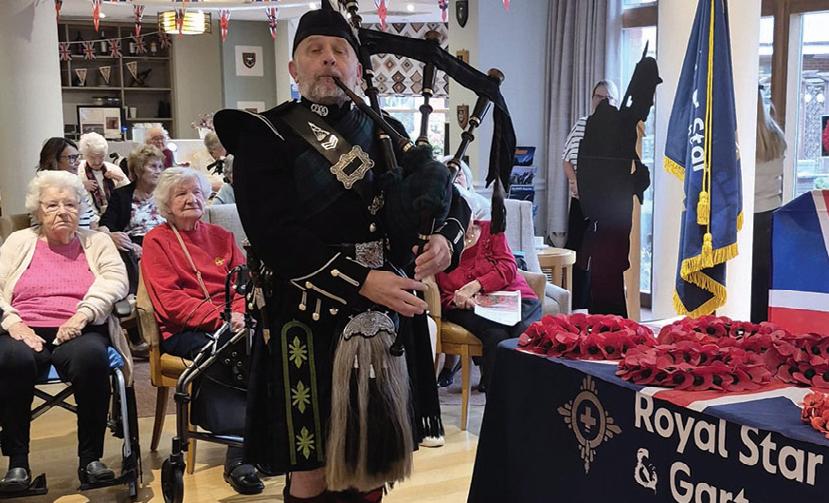
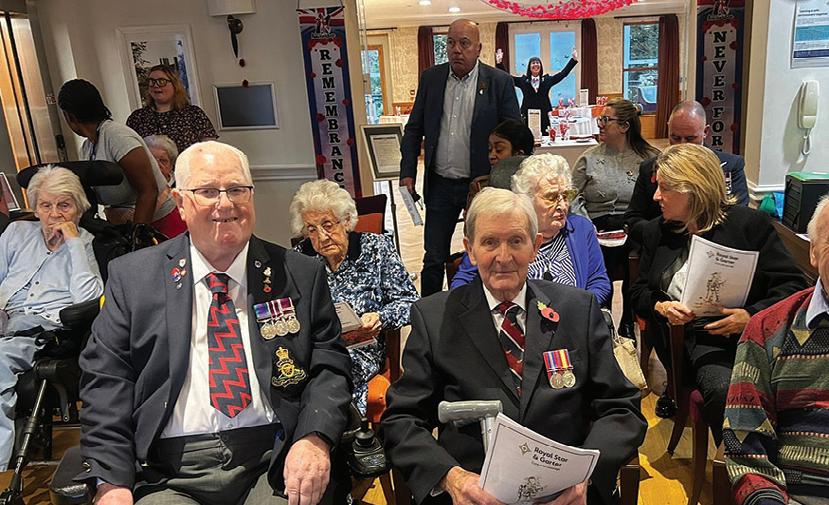

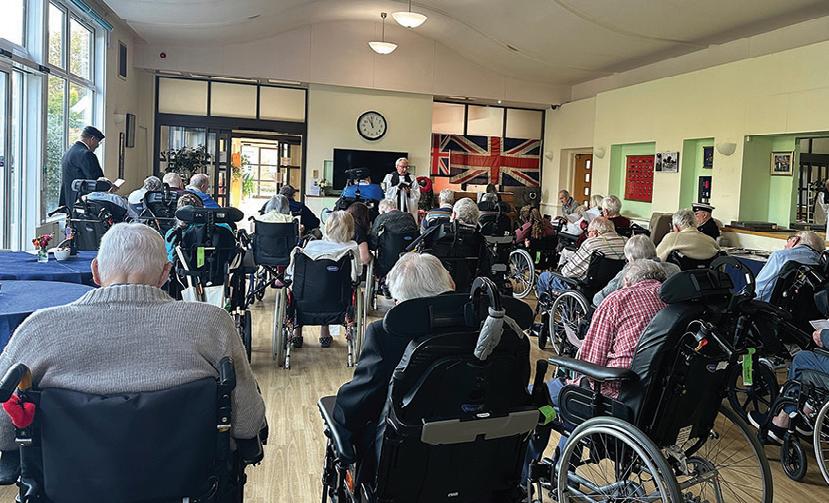
House, hosted the launch of the Midlands Royal British Legion's Poppy Appeal.
For many years, the residents, staff, and volunteers have got involved in the Poppy Appeal, showing our support for the Armed Forces community. At Galanos we’re very honoured to be able to provide a high standard of care to those who have served in the Armed Forces and the families who have supported that service. We also celebrated the families that have been invested in the care home through the generations, focusing on the Fardon family.
Wearing a poppy is a simple act with a powerful meaning; it sends a personal message of thanks and support.
The Lord Lieutenant of Warwickshire, Tim Cox, presented our seven res-

idents who are 100 years or over with a Poppy – our centenaries! At the other end of the generational scale, the High Sheriff of Warwickshire, Karen Lynch, presented the winners of our Poppy colouring competition. It was a pleasure to have both Karen and Tim join us.
Hosted by our Registered Manager, Jo-Anne Wilson MBE we welcomed the JLR Armed Forces Poppy Marathon team who ran from Gaydon to Galanos raising funds, and in preparation for pushing 102yr old D-Day Veteran Jack Mortimer around the 2026 London Marathon.
Our guests also included RBL Director of care home services Kirstan Sparshott, Kineton MOD, Volunteers, Legion Riders, Galanos Branch, Midlands Poppy Appeal Team, Southam AFVBC, VCP, Southam Men's Shed and our competition winners.
A war horse sculpture handmade by residents as part of Remembrance season activities has taken pride of place at a north Dorset care home.
Several contributors living at Colten Care’s Newstone House in Sturminster Newton, including members of its dementia community, worked on the piece before it was put on display in the reception area.
Standing 40cm high and 30cm from nose to tail, the shiny black sculpture is made of clay fashioned around

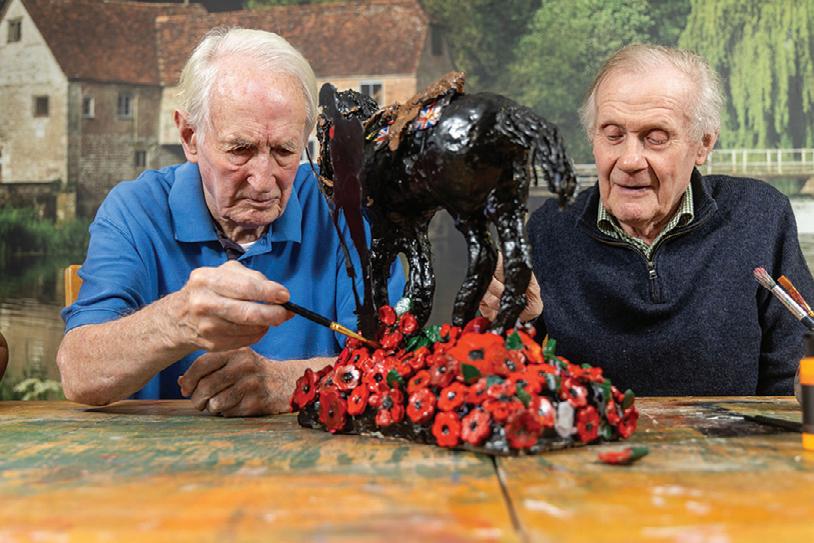
trainer who took an expert interest in guiding the
and proportions of
He was joined in the sculpting and painting by former Merchant Navy serviceman Tony Stock, while the poppies underneath the horse were made by fellow residents Joyce Ware, Sylvia Pearce and Muriel Haskell.
Tony said: “The poppies really added to the whole design and we were all very pleased with how it turned out.”
Companionship Team member Ruth Telford, who worked with the residents on the project, said: “We wanted to do something different for Remembrance this year. The idea of making a model war horse, especially with Ian’s professional eye for equine proportions, proved just right.”

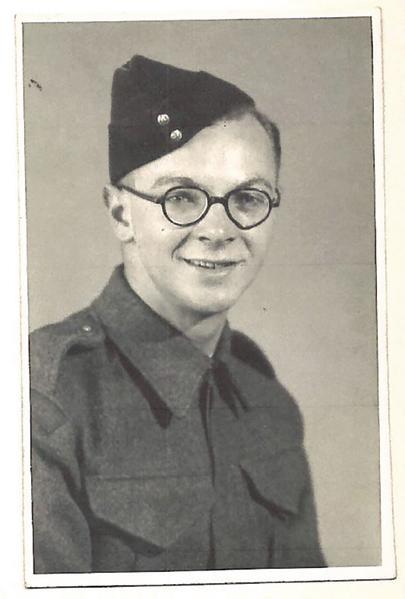
Ken Grant, a 101-year-old D-Day veteran, said that he was “honoured” this year to place a wreath of poppies on Chipping Campden’s war memorial.
At the town’s service of remembrance, Ken, together with other members of the Chipping Campden community, remembered all those who served in the World Wars and other conflicts.
Whilst laying the wreath, Ken said he was “just thinking about getting the job done right.” He added that he “just needed to lay the wreath in the right place, step back safely and stand to attention to follow instruction,” just like he did during the war, although “it’s not easy at over 100!”
After finishing school, Ken began working as an engineer before being called up to serve in the army. At just 19 years old, Ken
took part in the D-Day landings, launched by the Allies on 6th June 1944. Ken recalled the extraordinary sight of the sea filled with ships of all sizes as he stepped onto the deck ready to join the fight.
Post-war, Ken returned to his career as a civil engineer, eventually becoming a board member of a construction company involved in various high profile civil projects in Cardiff, including the police headquarters.
Ken continued in his dedication to the army in addition to his civic duties, rising through the ranks to become a Major in the Royal Monmouthshire Royal Engineers Regiment.
Ken shared his secret to a long and healthy life: “Keeping my mouth shut, and having never smoked – everyone in my generation smoked.”
Ken is now a resident at Mill House Care Home in Chipping Campden. Louise Keys, Home Manager at Mill House, said of Ken: “Ken’s such a lovely man, and it’s a real joy to have him in our home. His service record is outstanding, and he’s got some truly wonderful stories to tell! The people are what make Mill House such a special place to live and work, and Ken truly is one of a kind.”
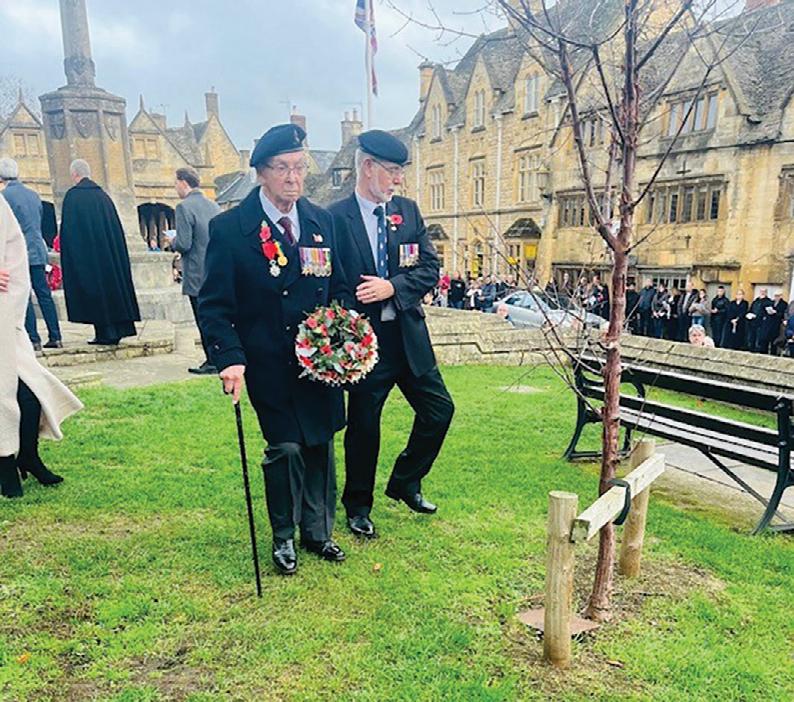
Merry Den's Mark and Fiona joined their community in paying tribute to fallen servicemen and women at this year's Royal British Legion Remembrance parade and service.
Mark and Fiona, who receive support from National Care Group's Merry Den Care service in Gloucestershire, attended the solemn occasion alongside members of their local activities club, Together We Can. Mark dressed with particular care for the event, demonstrating his deep respect for the occasion by wearing full formal attire appropriate to the significance of Remembrance Day.
National Care Group expressed pride in Mark and Fiona's participation, highlighting the importance of community integration and social activities for those receiving care support.

The Together We Can activities club provides opportunities for local residents to engage with their community and participate in meaningful events throughout the year. The Remembrance Day service in Cinderford saw strong turnout from local residents, veterans, and community organisations.
National Care Group's Merry Den Care service supports individuals across Gloucestershire, helping them maintain active and fulfilling lives within their local communities.
The annual Remembrance parade and service at the Royal British Legion remains one of the most significant dates in the Cinderford community calendar, bringing residents together to honour those who served their country.

In the run up to Remembrance Sunday, a Sanctuary Care home in Chester which was recently awarded Veteran Friendly Framework status, proudly celebrated the veterans living in its care home community.
Upton Dene Residential and Nursing Home was recently awarded VFF status in recognition of the team’s dedication to supporting the practical, emotional and social needs of the armed forces community.
Following this accolade, the team proudly celebrated the service of their own veterans.
One of those is 99-year-old Tom Parker, who served in the Royal Corp of Signals (RCS) between 1944 and 1947.
Tom drove 20-tonne trucks, carrying his colleagues and supplies, spending two and a half years stationed in Malaysia and Singapore.
Local veterans come to Upton Dene for afternoon tea with Tom and his fellow residents. Tom also proudly attends remembrance events with the team at the local cathedral and has visited the Hack Green Secret Nuclear Bunker in Nantwich.
The home’s activities coordinator, Kirsty Wood, said: “We are so proud of our veterans and the sacrifices they have made. Our VFF status is just another way we can recognise their service.”
Residents and team members at HC-One’s Coopers Croft Care Home in Stoke-onTrent have come together to create a touching display in honour of the brave servicemen whose names grace the streets of their local community.
The home, located on a street named after Mr Robert Knox, who fought for his country, sits within an estate where each street bears the name of a courageous individual who gave their all in service. To pay tribute to these local heroes, residents and friends of Coopers Croft have lovingly crafted a Remembrance display outside the home.
Each poppy in the display has been hand-painted by residents and members of the community, making it a deeply personal and heartfelt symbol of gratitude and remembrance.
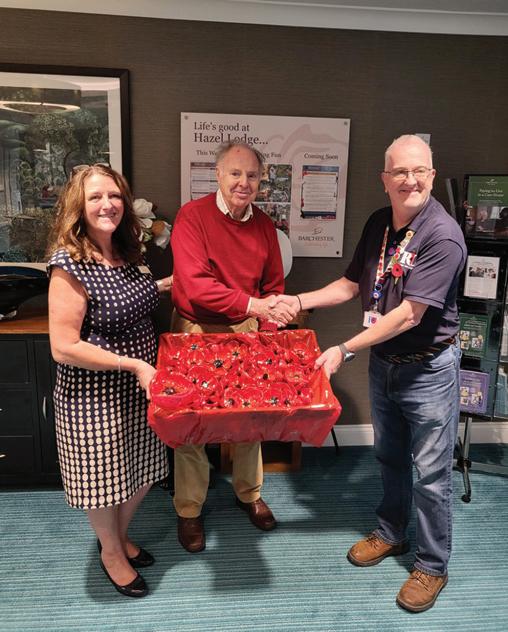

As the country prepares to mark Remembrance Day, the team and residents at Coopers Croft hope their tribute will encourage reflection and pride among all who pass by.
Anita Rawlingson, Lifestyle Manager at HC-One’s Coopers Croft Care Home, said:
“Our residents take great pride in being part of a community with such a strong connection to our nation’s history. This display is a small way for us to show our appreciation and to remember those who made the ultimate sacrifice.”
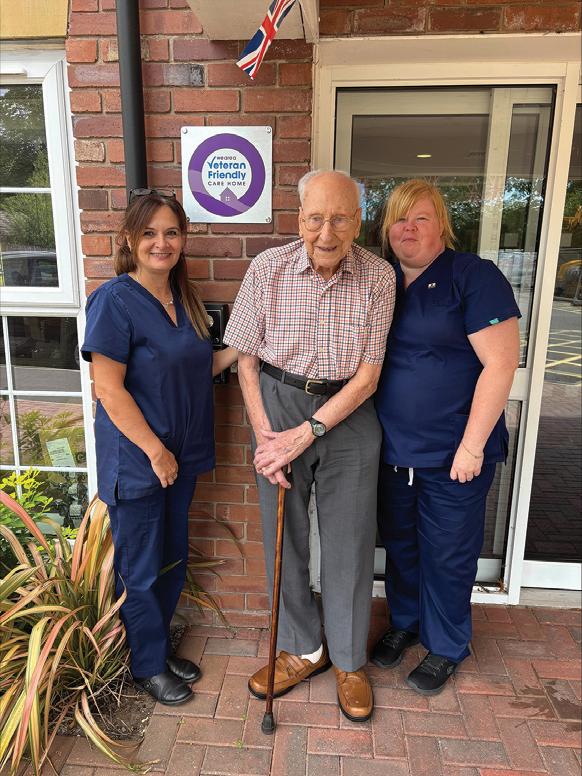
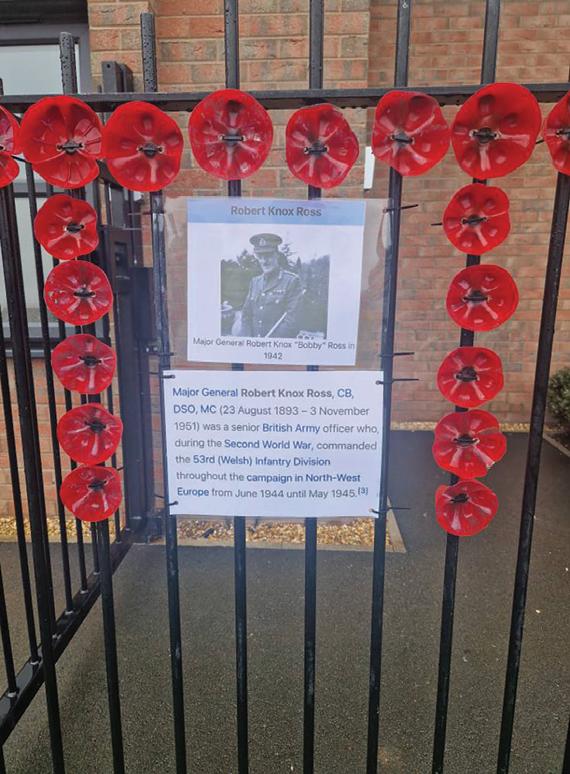
Hazel Lodge Care Home in Battle have joined forces with other volunteers and businesses to help Battle Poppy Appeal turn the town red with poppies to mark Remembrance Sunday and Armistice Day 2025. 11th November signifies the signing of the Armistice Day agreement on the day that the guns finally fell silent at the eleventh hour, on the eleventh day, of the eleventh month. As well as wearing poppies, sharing memories and observing the national two-minute silence, residents and staff have been busy over the past few weeks transforming plastic bottles into beautiful red poppies that can be found decorating roundabouts and other communal areas around the town of Battle.
Kieran and Deborah Doyle from Battle Poppy Appeal, said “Sharon and the team made hundreds of amazing plastic poppies for the town. True Community spirit. We couldn’t recommend Hazel Lodge more highly.”
Sharon Ward, Home Services Advisor at Hazel Lodge, said: “It is very important that we keep the memories of those who fought alive and that we also think about those involved in conflicts around the world today. We’ve loved being able to support Kieran and the Battle Poppy Appeal and to see our small contribution come together in remembrance with the other amazing Poppy displays around the town.”


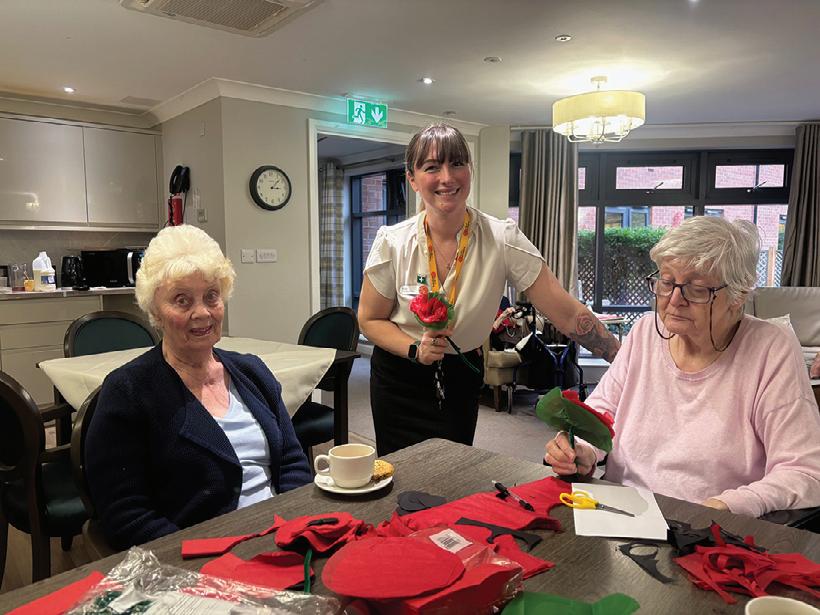
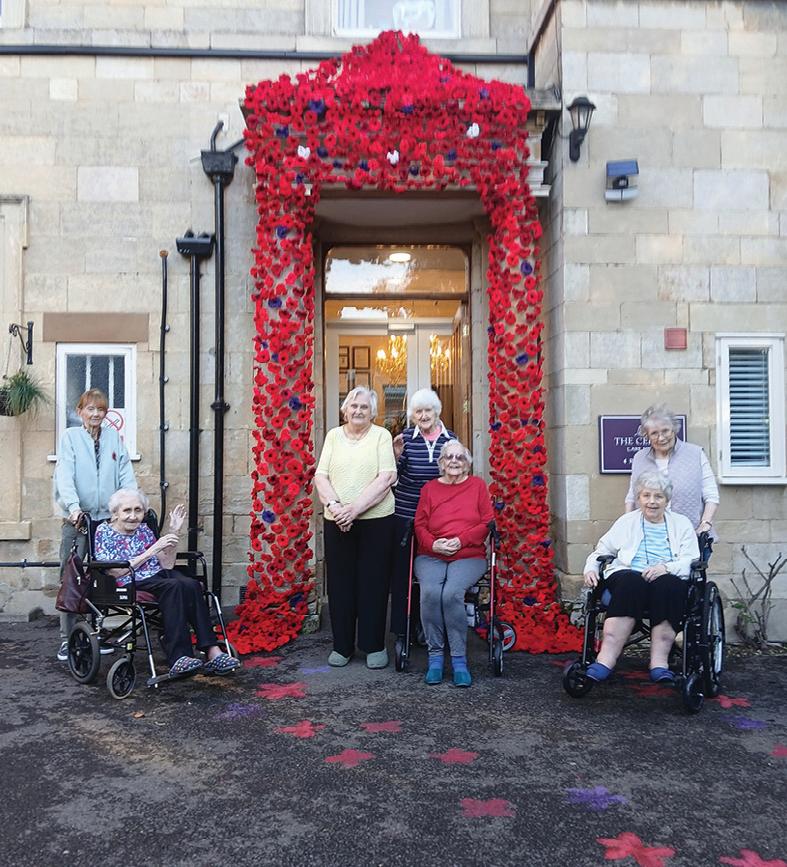
Residents of HC-One’s Windsor Court Care Home in Wetherby paid their respects to the nation’s service men and women on Remembrance Sunday in a variety of heartfelt ways.
Some residents attended local church services or visited the Wetherby War Memorial and the Bridgefoot Remembrance Service, while others watched the televised service from The Cenotaph and observed a two-minute silence at 11am. The Wetherby Silver Band and parade also added a magnificent touch to the centre of Wetherby, providing a moving tribute to those who served.
At Windsor Court, creativity and remembrance went hand in hand as residents made large decora-
tive poppies, which were displayed around the home to symbolise their care and respect.
Windsor Court Care Home continues to encourage residents to engage in meaningful activities that connect them to the wider community, while remembering the bravery and dedication of those who have served the nation.
Ursula Herbert, Activities Co-ordinator at Windsor Court, said: "It was very important to our residents and staff to show their respects. Some of our residents served in the armed forces while others have family who served. We will not forget their service and sacrifice."

The Cedars Care Home in Bourne have chosen to commemorate the signing of the Armistice Day agreement on the day that the guns finally fell silent with a giant handmade poppy cascade.
Starting back in March, staff, residents, friends and volunteers have been knitting and crocheting a huge number of poppies to display at the home. The poppies cascade from the upper windows, winding down the pillars before crossing the path to the walkway. It was a major project that everyone was happy to be a part of- and if you wish to make a guess as to the number of poppies made you could even win a prize!
The project was the brain-child of activities assistant Lisa Ferris, who said ‘it’s such a poignant time of the year and so many expressed how much their
involvement in this project meant to them and their families. It’s so important to remember and commemorate, especially with our residents; who lived through the war and were directly impacted’.
Relative ambassador Paula Finch said ‘the home always support Remembrance Day with such passion as many of the residents recall their lives entwined with those who served across all our forces. It is an amazing display’.
Rebecca Aldred, Senior General Manager at The Cedars Care Home added: ‘We have many residents with personal ties to the military and many who have experienced conflict either at home or abroad so it was important to us to mark November 11th and honour the contribution of everyone involved in the World Wars and in subsequent conflicts’.
Residents, families, and staff at Redbond Lodge Care Home, part of the Runwood Homes Group have been admiring a truly remarkable new display, a handcrafted poppy dress, marking the start of the home’s annual Poppy Display in honour of Remembrance this month.
The beautiful creation has been months in the making. Karen Briggs, Lifestyle Coordinator, shared how the idea began as a small personal project and blossomed into something extraordinary with the help of her mother, Diane Briggs.
Karen explained:
"I asked my mum if she could spare the time to crochet and knit some poppies for a project I had in mind. Mum has actually crocheted and knitted over 200 poppies! I didn’t ever expect her to make so many, but she has been tremendous in dedicating so much time and wool for this project. Not following a pattern, Mum made up many designs of

poppies to give me lots of variety, in all sizes, too. Over the months I gradually attached them on a dress to give it structure, which was not a mean feat too."
The result is a stunning poppy dress that now takes pride of place within the home, symbolising remembrance, creativity, and love. Residents and families have been full of admiration, with many commenting on how breathtaking the display looks.
"The residents and families in our home have said that it is so stunning," said Karen.
The project has not only added beauty to Redbond Lodge but also strengthened the bond between generations, as Karen and her mum worked side by side to create something meaningful for the community.
Both Karen and Diane take great pride in their creation, a heartfelt tribute and a reminder of the power of creativity, dedication, and remembrance, all close to many hearts at Redbond Lodge
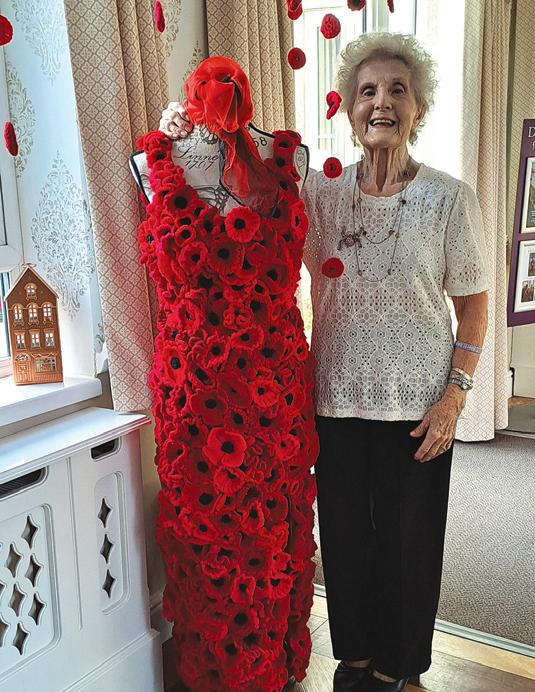
Residents took part in Malvern’s Remembrance Sunday service and observed the silence at 11am at the Great Malvern Library. Elgar Court Care home residents Pictured with their medals L-R – Ken Pennington, Peter Robinson & Hugh Richards Elgar Court Care Home in Malvern commemorated Remembrance Day on Sunday 9 November. They joined the rest of the United Kingdom in holding a two-minute silence at 11am.
As well as marking Remembrance Day by wearing poppies and watching the televised service from The Cenotaph, and residents representing the Care home attended the Great Malvern Priory Church service and watched the parade down to the War Memorial at Malvern Library, where a wreath-laying service, including a two-minute silence at 11am, was observed.

It was particularly poignant for one of our resident's, as this is the first time he has felt able to wear his medals after serving during the war and has felt great sadness about it since.
Ken Pennington an ex RAF serving veteran at Elgar Court Care home said: “It is very important that we keep the memories of those who fought alive and that we also think about those involved in conflicts around the world today.”
Sarah Cadwallader, Senior General Manager at Elgar Court said: “We have many residents with personal ties to the military and many who have experienced conflict either at home or abroad so it was important to us to mark Remembrance Day and honour the contribution of everyone involved in the World Wars and in subsequent conflicts”.
HC-One's Brandon House Care Home in Bell Green, Coventry, West Midlands, hosted its annual Remembrance Service on Tuesday 11th November 2025, from 10:30am to 11:30am, in the care home's car park alongside St Lawrence's Church. Now in its fifth year, the service had become a cherished community tradition, bringing together residents, staff, local schoolchildren, and members of the public to honour and remember the fallen. Pupils from St Lawrence's School and Church joined residents and staff to take part in readings and hymns during the service. Residents Gayle Dobson and Diana Fleet gave heartfelt readings, while the Minister from St Lawrence's Church led the service.

pies had been lovingly crafted over the past five years by residents, relatives, staff, and local knitting groups, with the display growing each year as new creations were added.
The display is currently on show and will remain in place until Friday 14th November, offering the local community an opportunity to reflect and pay their respects.
Home Manager Sheryl Davis, said:
“Our Remembrance Service is such an important part of the year here at Brandon House. It brings our residents, families, and the local community together to remember and give thanks to those who served. We’re proud of how this event has grown over the past five years, and our ever-expanding poppy display is a beautiful symbol of that shared remembrance.”


This Remembrance Day 2025, we are immensely proud of our wonderful Oaktree Court Care Home resident, Ken, who travelled to London, with his family and Activities Lead Nicky, to take part in The National Service of Remembrance Parade at The Cenotaph in Whitehall.
At 101 years old, World War II veteran Ken led the front of the procession alongside fellow centenarian veterans - a truly emotional and unforgettable moment of national pride. Following the parade, Ken and his companions enjoyed special seats at the Festival of Remembrance at the Royal Albert Hall, surrounded by dignitaries, families, and fellow servicemen and women.
To mark this special day, Ken was interviewed by BBC One and Sky News, where he shared his wartime experiences and spoke about how humbled and fortunate he feels to be here today!
A WWII VETERAN'S REMARKABLE LIFE OF SERVICE
Ken’s story is one of courage, resilience, and gratitude. He served in the British Armed Forces during World War Two from 1942 to 1946, before joining the reserves until 1951.
Ken recalls how his life was saved by Operation Zipper - a British plan to capture Port Swettenham and Port Dickson in Malaya. Although the operation was scaled back following the end of the war in the Pacific, some of its landings went ahead.
In recognition of his bravery, Ken was awarded the Burma Star Medal after nine years of loyal service.
“I’m so humbled and lucky to be here,” Ken reflected.
This year marked Ken’s first national Remembrance Day Service. He shared that he decided to attend the 2025 Cenotaph Parade because he felt he was “missing out on something in life” - and the experience
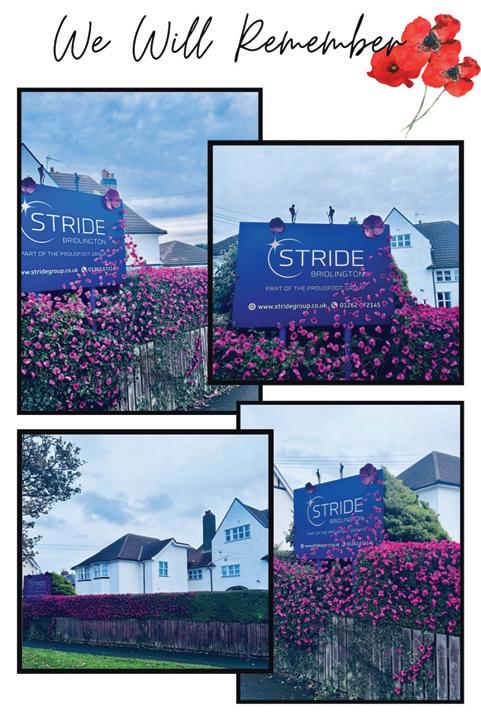


proved deeply meaningful.
LIFE AT OAKTREE COURT CARE HOME, WELLINGTON
Now living at Oaktree Court Care Home in Wellington, Ken continues to share his extraordinary wartime stories with residents, team members, and visitors alike. His warm personality and storytelling bring history to life for everyone around him.
Away from his heroic past, Ken enjoys life’s simple pleasurescrosswords, movie nights, and a glass of red wine with dinner. He also remains deeply involved in the veteran community, regularly meeting with the local Royal British Legion and hosting a monthly Veterans’ Breakfast at Oaktree Court, where local veterans gather for food, conversation, and friendship.
HONOURING
At Majesticare’s Oaktree Court Care Home, we proudly celebrate every moment that honours our heroes. Earlier this year, we held a wonderful 80th Anniversary of VE Day celebration, where Ken wore his medals with pride alongside new generations of veterans. The Oaktree Court team dressed in their 1940s finest as we raised a hot cup of coffee and funds for the brave veterans who’ve served around the world.
80 YEARS OF VE DAY AT OAKTREE COURT
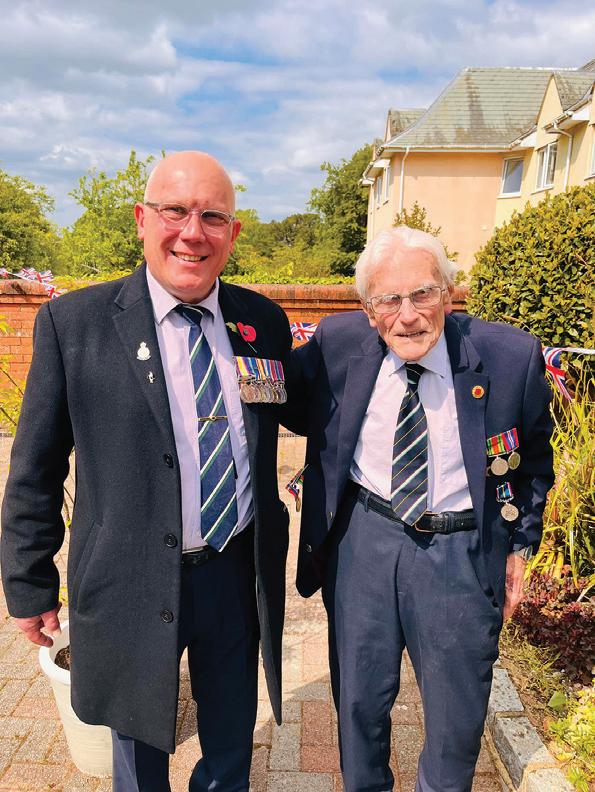
Ken truly represents the heart and spirit of Majesticare - kind, humble, and full of wisdom. His presence reminds us of the sacrifices made by so many, and the importance of sharing and preserving their stories.
WE WILL REMEMBER THEM
This Remembrance Day, as we reflect on the courage of all who served, we are incredibly proud of Ken, a WWII veteran, a true hero, and a cherished member of our Oaktree Court Care Home family.
“At the going down of the sun and in the morning, we will remember them.”
From all of us at Majesticare and Oaktree Court Care Home, thank you, Ken, for your service, your kindness, and your inspiration.
Staff at a Bridlington mental health service created a striking tribute to fallen service personnel, installing 1,800 poppies across the front of their residential home.
Stride Bridlington, which supports adults with complex mental health diagnoses, transformed its frontage with the moving Remembrance display, with each poppy carefully positioned on netting stretched across the property's front hedging.
The initiative was led by manager Sam Noble, a Royal Navy veteran who served as a medic during Operation Herrick 5 in Afghanistan as part of the trauma team. Sam worked alongside the Stride team to install the extensive poppy display as a mark of respect for
those who made the ultimate sacrifice.
The residential service, which provides specialist mental health support in the East Yorkshire coastal town, has become a focal point in the local community with its poignant tribute during the Remembrance period.
The installation represents a significant collaborative effort from the care team, demonstrating their commitment to honouring military personnel while continuing their vital work supporting vulnerable adults in the area.
HC-One’s Jack Dormand Care Home in Horden, County Durham, embraced creativity and community spirit ahead of Remembrance Day, thanks to the fantastic support of local college students. Over the past few days, students have been hard at work helping to create meaningful decorations to honour those who served.
From 70 pieces of paper to cardboard and even an eight-foot MDF display, the contributions have been as impressive as they are heartfelt. Special thanks go to Dillan Harkness, the son of one of the home’s wellbeing team members, whose brilliant finishing touches and artistic talent have brought the decorations to life.
The team at Jack Dormand would like to extend a huge well done to everyone involved and looks forward to sharing more of the decorations with residents, families, and the local community soon. Jack

Dormand have gifted one of the Remembrance Day pieces to their local parish councillors at their local church and one to their local veterans.
Marie Shillaw, Senior Home Manager at HC-One’s Jack Dormand Care Home said:
“We’ve been busy at Jack Dormand putting our hard work with our Remembrance Day display. It’s a small way to honour those who served, and this is just the start.
"We’re incredibly proud of everyone who has helped bring our Remembrance Day commemorations to life. Seeing our residents and local students come together to create something so meaningful is truly special. It’s a small way to honour those who served, and we can’t wait to share the full display with our community."
Residents and team members from Claridge Place Care Home, part of the Sanders Senior Living Group, recently came together to fulfil a heartfelt wish, a visit to the National Memorial Arboretum on 6th November 2025.
The trip was inspired by Ray, a resident who proudly served in the Royal Air Force and wished to visit the Arboretum to pay his respects. He was joined by fellow resident George, a former Royal Electrical Engineer, along with members of the Wellbeing Team and other residents from the home.
The day was a time of reflection and gratitude, as residents walked among the memorials, sharing stories and honouring those who bravely served their country. The visit provided a meaningful opportunity to remember and give thanks for the sacrifices made
by so many.
Stacey, Senior CRM at Claridge Place, said: “Both Ray and George proudly served their country, and it was a privilege to help make this special visit possible. When I asked Ray why this trip was so important to him, he said, ‘It’s always important to remember! They gave their todays so we could have our tomorrows.’ Joined with fellow residents from Claridge Place, they enjoyed reminiscing and sharing memories.”
Claridge Place’s visit to the National Memorial Arboretum was a powerful reminder of the importance of remembrance, honouring the past while bringing comfort, connection, and meaning to the present.

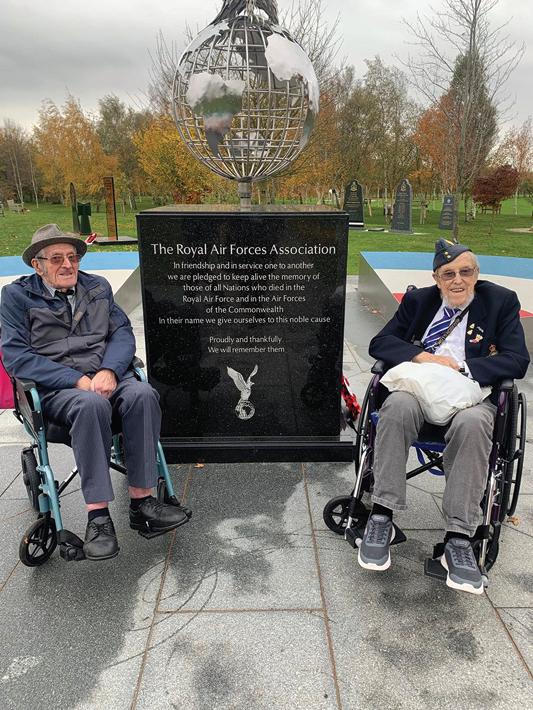

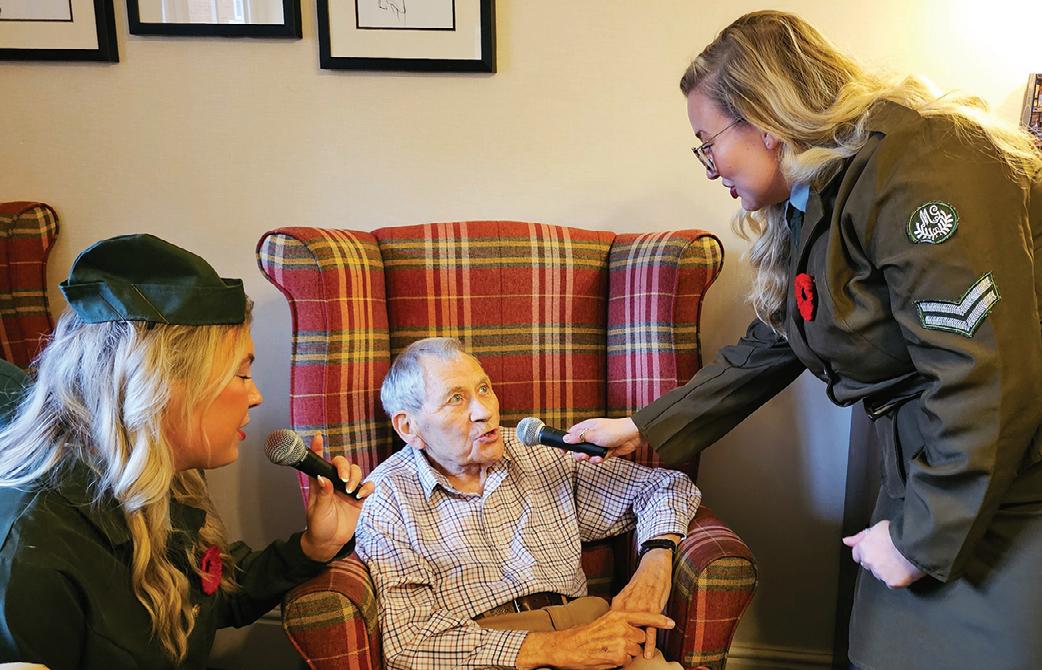
Elm Bank Care Home in Kettering, residents, staff, and families enjoyed a truly special and moving Remembrance Sunday this year, thanks to a spectacular performance from Mini Concerts.
The talented singers brought the spirit of the 1940s to the care home, performing a wonderful selection of songs from times past. Their energetic and heart-warming performance created a powerful moment of joy and nostalgia for everyone gathered.
Activities Co-ordinator Tina said: “The performance was wonderful, the residents, many of whom have vivid memories of the era, for them the music was deeply moving. The familiar melodies and harmonies evoked fond recollections, prompting many of our residents to sing along and even dance in their seats. The concert really provided a chance for residents to connect with their history in a joyful and uplifting.”
General Manager Larisa Bledea said: “The morning performance meant so much to us here at the home, it was such a lovely way of marking Remembrance Sunday, remembering the past but also celebrating life.”
Our varied life enrichment programme keeps residents active, and provides a daily choice of engaging physical, mental and spiritual activities tailored to residents’ interests and abilities.


Merseyside charity Autism Together held a Remembrance Day service in historic Bromborough Pool Village to remember those who lost their lives in war.
This was the charity’s second year marking Armistice Day with a public service, and this year it was conducted by Autism Together service managers Steve Davis (who previously served in the armed forces) and Dean Ravera.
Held outside the village’s former church building, there was a fantastic turnout as local people mingled with Autism Together staff and people we support, all gathered around the village's refurbished war memorial.
There was a very respectful 2-minute silence, followed by a rendition of ‘The Last Post’ expertly performed on electric guitar and saxophone by two of our staff members - Alex Harris and Tom Luke.
For Remembrance Day, many of the people we support created their own handmade poppies which were beautifully displayed around the church building.
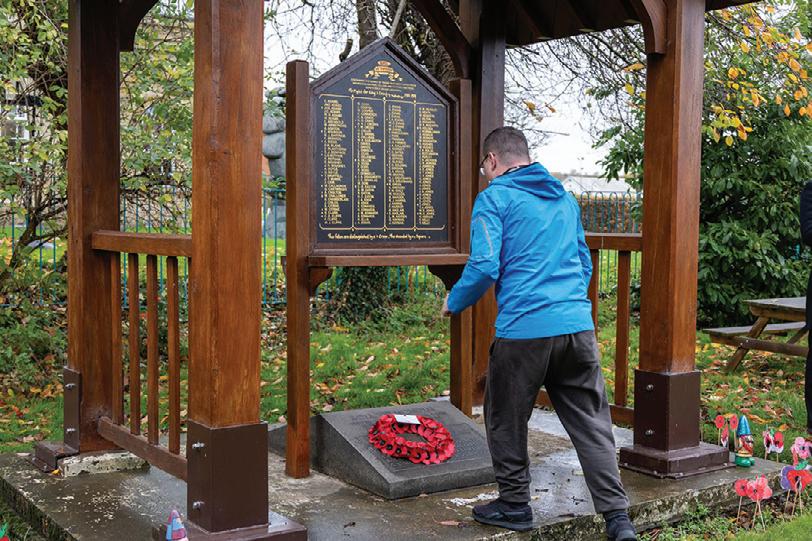


Residents and staff at The Gables Rest Home in Kidderminster marked Remembrance Day with a moving programme of commemorative events.
The day began solemnly with a two-minute silence, as the home community came together to honour those who made the ultimate sacrifice. The atmosphere then lifted as The Barrack Boys entertained residents with a spirited sing-along and dance session, bringing smiles and encouraging participation throughout the morning.
The afternoon saw residents gather once more for a poignant moment of reflection, as everyone took time to salute our servicemen and women, both past and present.
The day provided a meaningful balance of remembrance and celebration, allowing residents to pay their respects while also enjoying the camaraderie and entertainment that helps keep wartime memories and spirits alive.
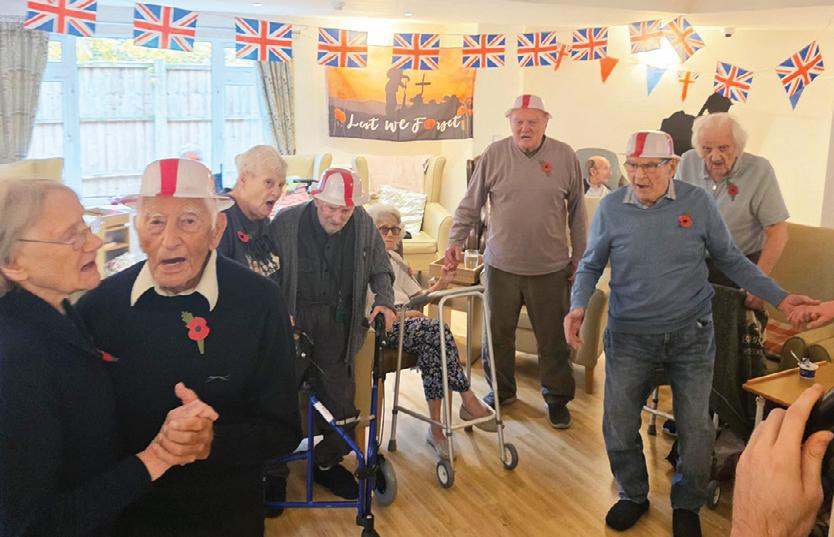

Generations came together at Broughton House Veteran Care Village in Salford on Remembrance Day to pay tribute to fallen servicemen and women, current veterans and those still serving in the armed forces.
The moving ceremony was attended by residents, staff, relatives, supporters, community representatives and pupils from nearby St Philip’s RC Primary School.
D-Day veteran Peter Belcher, 101, was among the residents who took part in the service. Peter, who was a sergeant in the Parachute Regiment during World War Two, read the Lord’s Prayer.
Captain Bob McMillan, 93, who served with the Royal Electrical and Mechanical Engineers, laid the wreath.
darkness of war, and honour the ultimate sacrifice by the people who served in the first and second world wars.
Outdoor events company Challenge the Wild is the custodian of the lamplights. Its founder Dan Searson, a former captain in the Royal Army Medical Corps, led the service at Broughton House.
He said: “It’s incredibly important to have a service of this kind, not just to remember those who fell, but also to recognise the current veteran community. I was very proud to lead the service, surrounded by such amazing individuals who have given their time, life and service. I was very humbled.”
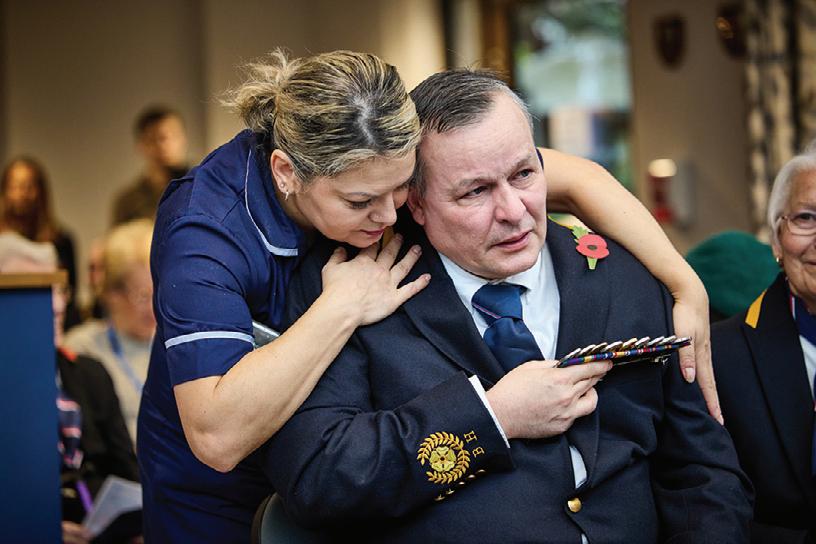
MBE, 78, who served with the Cheshire Regiment, read the Exhortation.
Major Andy Dinning, 81, who served as a commando with the Royal Marines, read the poem In Flanders Fields, and
the Argyll and Sutherland Highlanders, read The Kohima Epitaph. Residents wore their Broughton House blazers, medals and berets for the ceremony.
The service also included the placing of five Lamplights of Peace from World War Two alongside an original
from the 1916 Battle of the Somme.
are traditional oil lanterns which represent the ‘lights of peace’ that emerged from the
Jane Green, director of care at Broughton House, said of the occasion: “It was very special. It’s the most important day in our entire calendar and it was a pleasure to share it with all of our residents and so many of their relatives, along with community partners, the school, Challenge the Wild and local religious and police representatives.
“Remembrance Day is about honouring the fallen and those who have served, but also gives an opportunity to reflect on how important it is to protect our democracy and our values into the future.
Peter Belcher said: “Remembrance Day is a day when we remember our many comrades, and it’s important to involve the next generation so they learn about our history and the sacrifices made.”


Residents at St Olaf Care Home in Nairn were hard at work creating a spectacular poppy display ahead of Remembrance Sunday.
Supported by family members and colleagues from the Meallmore-run care home, residents spent weeks hand painting poppies made from plastic bottles, to create a cascade of poppies at the entrance of the home.
Inspired by a summer activity of making poppies for the commonwealth war graves in Tunisia, St Olaf Care Home Manager, Kath Allan came up with the idea of recreating the Tower of London display at St Olaf.
The display was assembled by the team, with help from Brian MacAngus, from the Ross-shire branch of the Seaforth Highlanders Association, before he laid a wreath beneath it on behalf of the Association.
The poppies will be on display at St Olaf for two more weeks.
Kath Allan, Care Home Manager at St Olaf said: “At St Olaf we honour the brave men and women who gave their lives for the country, and we are proud to show off our poppy display.
“This is the culmination of weeks of hard work by our residents and colleagues. Everyone seems to knit or crochet poppies, but as we all enjoyed our summer project painting poppies, I thought we could make a display like the one at the Tower of London. The result is absolutely beautiful. A huge well done to our residents and a special thank you to everyone who helped, and of course to Brian for assisting with the assembly of it and for the lovely wreath.”

Residents of a Lymington dementia care home welcomed a Remembrance visit by school children and members of the town’s Royal British Legion (RBL).
Together, the hosts at Colten Care’s Linden House and their uniformed visitors, including eleven pupils from Lymington Infant School, held a special service to honour all those who served and gave sacrifice in war.
Residents and children looked on as RBL representatives ‘raised the standard’, flying the Legion flag alongside the Union Jack, and held a minute’s silence.
There was also an opportunity to speak with the RBL visitors and children,
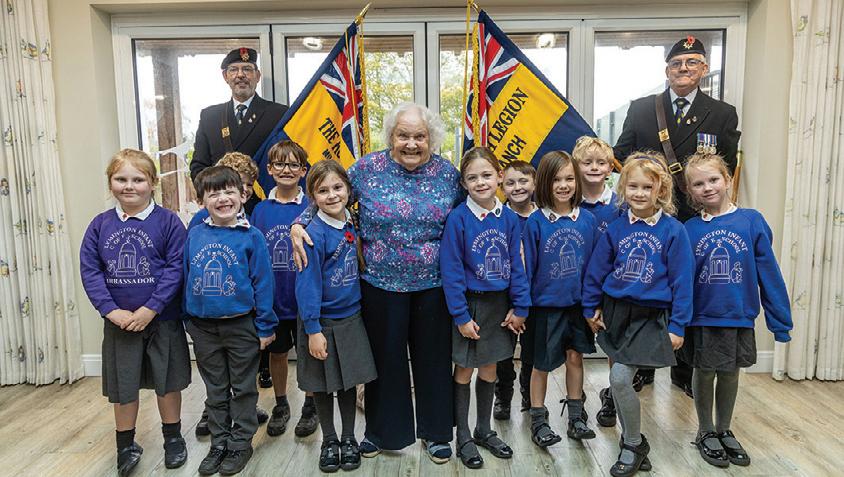
creating a multi-generational experience for those residents present. One, Megan Atkinson, was the centre of attention as she posed for a photo. Sian Harris, Companionship Team Leader at the home, said: “It is rare for the RBL to come out and stage such a personalised Remembrance service.
We sincerely thank them.
“Some of our residents may have been unable to attend external services so hosting an event such as this in the home is ideal.
“It created a meaningful and accessible opportunity to honour those who have served. It really was a lovely visit and a multi-generational experience for our residents.”

This week, The Chase care home in Huntingdon marked Remembrance Day 2025 with a visit from a truly extraordinary guest. Chester, the celebrated horse from Bedfordshire known affectionately as the “The Floppy Ear Pony”, came to the home draped in his trademark coat made from hundreds of hand-knitted and crocheted poppies created by his fans.
He was accompanied by his owner, Samantha Wenn, a former British Army soldier who created Chester’s coat with her mother Eileen as a way to honour the memories of fallen veterans. In 2023, she led Chester on a Remembrance Day procession through her hometown of Sandy, Bedfordshire – and he has since become a powerful emblem of national memory and pride.
Chester made an instant impression as he trotted through The Chase’s garden to greet his hosts. There, the residents spent the afternoon stroking his mane, admiring his coat, and sharing anecdotes from their own lives during wartime. Many still have vivid memories of the war – from being evacuated as children, to having family members sent off to serve on the front.
Jessa Avila, General Manager at The Chase, reflects on the day:
"It was so wonderful welcoming Chester and Sam to the home. At this time of year, remembering all the brave souls who fought and lost their lives in the Second World War is crucial – and for many people Chester has become a symbol of that honour and pride. Many of our residents' lives were personally
touched by the war – so whilst it was an enjoyable day, it was also very poignant and emotional at times as well”.
His magnificent poppy coat isn’t the only reason Chester cuts a striking figure. A remarkable brown Irish draft gelding who measures over 7 feet long, he is also an energetic and spirited horse who loves meeting new people. In recent years Chester and Sam have done multiple tours through the country and have raised thousands of pounds for veteran associations like the Royal British legion, and charities and hospices.
Reflecting on Chester’s unexpected rise to fame, Sam said she believes he has become a way for many thousands of fans to honour and acknowledge not only fallen veterans – but also the brave animals that served alongside them. Indeed, over the course of the Second World War many millions of horses, donkeys, and mules died whilst transporting supplies and evacuating injured soldiers from battle.
Unfortunately, their contribution to the war effort is often overlooked – another reason why the team at The Chase wanted to bring Chester to the home for Remembrance Day 2025. Jessa Avila again:
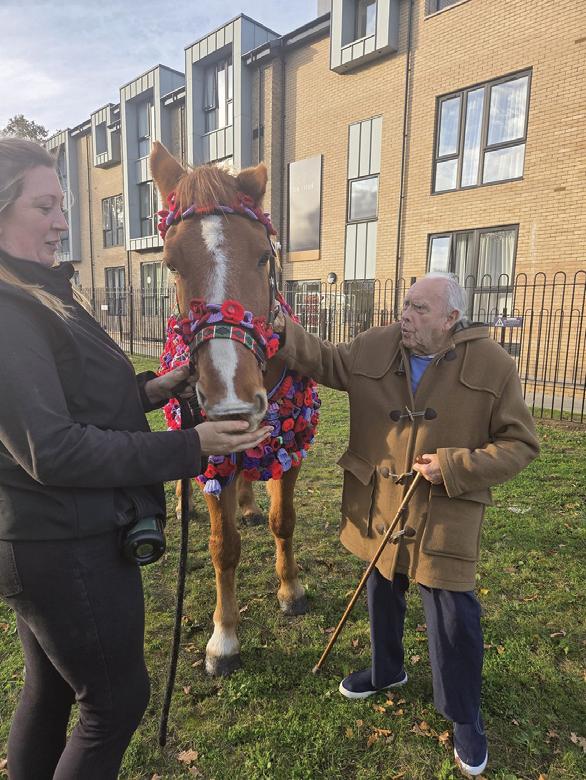
"This Remembrance Day, we are taking the time to honour the valiant soldiers of the Second World War and the brave beasts who accompanied them into battle. The contribution of animals to Britain's victory is often overlooked, which is why it’s so wonderful to have a mighty stead like Chester out there to keep their memory alive. 'Lest we Forget', indeed."
Bayleaf Care Home in Huntingdon commemorated Remembrance Sunday on Sunday 9 November. They joined the rest of the United Kingdom in holding a two-minute silence at 11am.
As well

and
tant that we keep the memories of those who fought alive and that we also think about those involved in conflicts around the world today.”
Katie Wilkinson, General Manager at Bayleaf Care Home, said: “We have many residents with personal ties to the military and many who have experienced conflict either at home or abroad so it was important to us to mark Remembrance Day and honour the contribution of everyone involved in the World Wars and in subsequent conflicts.


SEE US ON STAND J20 AT THE CARE SHOW
Healthcare workers in Northern Ireland are set to receive a pay rise that will bring their salaries in line with colleagues across the rest of the United Kingdom, according to Health Minister Mike Nesbitt.
The increase follows recommendations made by independent pay review bodies in April. Nursing staff in the region had previously indicated they were prepared to take industrial action if the recommended 3.6% rise was not implemented.
Speaking about the development, Mr Nesbitt explained that the Northern Ireland Executive has authorised the delivery of pay parity for health service employees. The percentage increases, as suggested by the pay review bodies, will be applied retrospectively from 1st April 2025.
Health and social care workers are expected to see the uplift and backdated payments reflected in their February 2026 salaries.
The Health Minister has also pledged to prevent similar delays in future by ensuring pay awards are given priority in budget allocations at the beginning of each financial year, with adjustments made as required to maintain parity.

Medical representatives have acknowledged the approval of the outstanding pay increase, though they have expressed disappointment at the length of time taken to reach this resolution. There are hopes that healthcare worker remuneration will be given greater priority in future budget planning, with concerns raised about the strain placed on professional goodwill during the delay.
Image Crown Copyright, reproduced under Open Government License
Nursing representatives met with Mr Nesbitt recently to discuss the matter. They have welcomed confirmation that pay parity will be restored for healthcare staff, noting that the loss of equivalence with UK colleagues had been a source of considerable frustration among their members.
The commitment to avoid future delays in pay award implementation has been particularly welcomed, though professional bodies have indicated they will examine the proposals in detail before making final recommendations to their membership.
The Health Minister had previously authorised the 3.6% pay rise in line with Pay Review Body recommendations in May, though funding challenges within the department meant additional resources needed to be secured from the powersharing Executive.
By the previous month, only half of the required funding had been identified, with discussions continuing to find the remaining amount.
Alan Perry, GMB Senior Organiser, said: “This looks like a massive step forward for Northern Ireland’s health workers to have pay parity with colleagues across Great Britain. GMB will wait for more details about the before consulting with our members.
“But we must say it is hugely disappointing that it’s taken so long to resolve this.
“We sincerely hope lessons have been learnt and pay will be prioritised in next year’s budgeting process.”
Alzheimer’s Society has appointed Michelle Dyson as its new chief executive, bringing nearly three decades of health and social care expertise to the leading dementia charity.
Ms Dyson, who joined the organization on 1 November 2025, most recently served as Director General for Adult Social Care at the Department of Health and Social Care. Her appointment comes as she transitions from a distinguished civil service career spanning almost 27 years.
The new chief executive’s contributions to the sector were recognized in the 2025 New Year’s Honours List, where she was awarded a CB (Companion of the Order of the Bath) for her services to health and social care.
Michelle Dyson said: “I am thrilled to be joining Alzheimer’s Society as Chief Executive Officer. I am so impressed by the scale of what Alzheimer’s Society does – in terms of its direct support services, hugely ambitious programmes of research and innovation and wide-ranging partnerships across the UK.
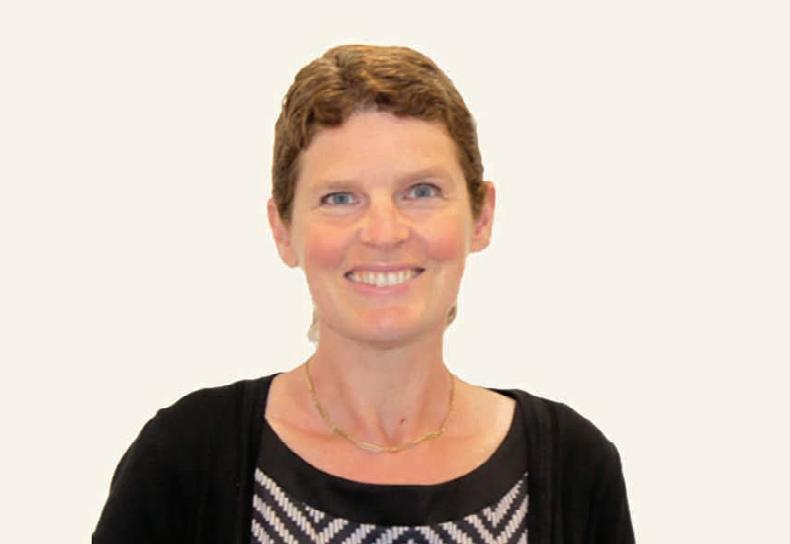
“The challenge of dementia is enormous, a cruel disease which is already the leading cause of death in the UK. Three of my grandparents had dementia so I have personal experience of the terrible human con-
sequences.
“The sense of ambition and possibility at Alzheimer’s Society is striking, and I am honoured to lead the charity at this important time.”
Dame Suzi Leather, Chair of Alzheimer’s Society, said: “I am absolutely delighted to announce Michelle Dyson’s appointment as our new Chief Executive Officer. Among a highly competitive and talented field of applicants, Michelle emerged as the outstanding candidate.
“A hugely bright dedicated public servant, Michelle has wide experience of different policy fields in central government and has led in some tough areas of public policy. Her unwavering commitment to driving positive change and making a difference to people’s lives shines through her professional career. I know she will bring a passion for the dementia cause and a determination that in all that we do, Alzheimer’s Society excels.
The entire organisation, board, staff and volunteers, welcomes Michelle and looks forward, under her leadership, to increasing our impact as the leading charity working to ensure that dementia no longer devastates lives.

The Cabinet Secretary for Finance and Welsh Language, Mark Drakeford MS, delivered a moving talk to Cardiff Metropolitan University and Bridgend College BSc Social Work students.
Mr Drakeford, who was the First Minister of Wales from 2018 to 2024, spoke about his career as a probation worker, youth justice worker and Barnardo’s project leader in Cardiff.
“Social workers try to make a difference to social circumstances. This is hard. It requires effort and bravery. It is an occupation that speaks up on behalf of the people it works with,” said Mr Drakeford. Defining good social work, he urged students to be properly informed, “You will be asked for help all the time. When you give advice, make sure it is accurate and helps people begin to resolve the issues that face them.”
Mr Drakeford, who is also a Professor of Social Policy and Applied Social Sciences at Cardiff University, highlighted the importance of resilience and persistence in the sector, “Keep going. Pick yourself up. Hang on in there in people’s lives. I couldn’t always stop young men in my area from getting into trouble with the law, but I could try to stay involved in their lives, so that help would be on hand, when they were able to change things for the better.”
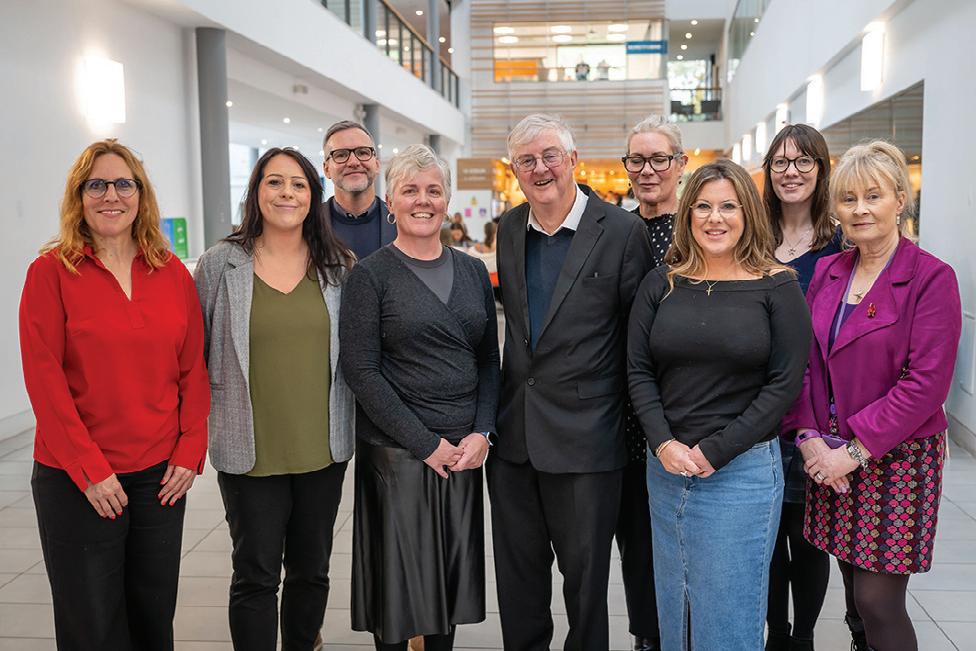
When asked about his advice to his younger self, he was clear: “Hold your nerve. Be prepared to be bolder than you think you can be. Do more to make sure you are linked with other people doing this job. “Never feel you are on your own. Form alliances with others who do the same job. Draw the collective strength of those around you.”
Mr Drakeford also spoke about how his frontline social work moved him into politics, citing repeatedly visiting a tower block where the smell of damp “could knock you back”. “This made me realise that the way to improve things is not to change one at a time, but to change the system,” he said.
He also expressed gratitude for the skills he developed during his social work career, explaining how they helped him in politics – particularly when he encountered a woman in his first constituency surgery who had just attempted suicide.
Acting Dean of Cardiff School of Education and Social Policy, Dr Cecilia Hannigan-Davies, said, “On behalf of the School and Cardiff Met, I would like to thank Mr Drakeford for his inspirational and moving talk. Social work is a demanding career and his insights are highly valuable to them as they undertake their degrees.”
After hearing from the former First Minister, the social work students listened to Dr Andrea Cooper and David Mckinney from the Older People’s Commissioner Office for Wales.
Dr Cooper, who works as the Safeguarding Lead, talked about the sobering impact of ageism on the abuse of older people and the impact this has on supporting them. This allowed students to discuss the implications for their future practice.
David Mckinney, who is the Ageing Well Lead at the Commission, spoke about the challenges we face in supporting older people to age well in Wales. He also focused on the unique opportunities this presents to social workers to get involved with community networks and become part of the solution.
A Leamington Spa home has taken inspiration from the town's lantern parade as they aim to replicate something similar at the home.
MHA Homewood is planning to put up the lanterns made from plastic bottles around the home in the month of December.
The idea came from The Leamington Lantern Parade, which started in 2010 and was inspired by the historic ‘Lights of Leamington’ annual lights spectacle and illumination hosted in Jephson Gardens from 1951-1961.
The re-imagined spectacle invites the local community to creatively illuminate Leamington with handmade Lanterns that are paraded through the town centre.
A resident at the home, Pat Dyer (90) has painted 100 plastic bottles in preparation for their very own lantern parade.
MHA Homewood provides personalised residential care for 50 residents.
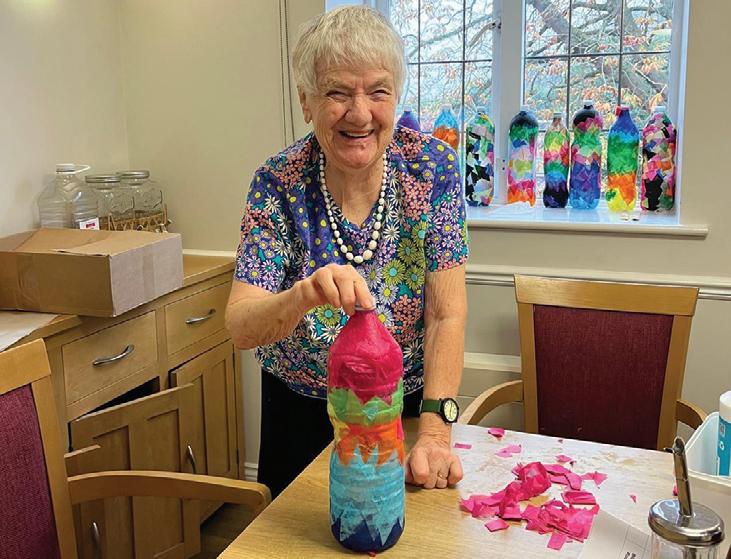
Jackie Tudor, activities coordinator said: “Pat is very keen on anything related to arts and crafts so when we told her about what we were planning on doing she was very excited.
“She has had a little help from other residents, but she has contributed to all 100 plastic bottles being painted.
“It’s a great way of reusing the bottles and I am sure the parade will look great once it is up.
“We are planning to cut the bottles and insert battery operated tea lights and then hang them up around the outside of the home.
“The inspiration came from the Leamington Lantern Parade which is something that brings the town together and we wanted to play our part.
“It’s a time of year when community spirit is always highlighted and I am sure the town of Leamington Spa will appreciate our efforts.”

How technology-driven engagement is boosting morale, staff retention, and wellbeing in UK care homes.
In today’s social care environment, the pressures on providers have never been greater. Rising costs, recruitment uncertainty, and increasing expectations from families and the CQC are leaving many care homes stretched thin. Yet, amid these challenges, one innovation is quietly reshaping daily life for both staff and residents - the Mobii Interactive Projection System from OM Interactive.
Drawing on OM Interactive’s 2025 Nationwide Survey of care professionals, The Mobii in Care: Executive Insights 2025 reveals powerful evidence that interactive technology can do more than engage - it can rebuild morale, reduce workload, and help care teams deliver the quality of care they aspire to.
LIFTING MORALE AND STAFF RETENTION ACROSS CARE TEAMS
Care work is among the most rewarding professions, but it is also one of the most emotionally demanding. Many care teams report that introducing the Mobii has brought back a sense of joy, pride, and connection to their daily work.
“Staff feel able to offer a more meaningful experience for service users,” says Marion Hunt, Advanced OT/Sensory Lead at The Hatherton Centre, MPFT.
That feeling matters - because it directly supports staff retention and resilience. When staff see residents light up with engagement, they’re reminded why they chose care in the first place.
Most managers surveyed said the Mobii has made a positive difference to staff workload, reducing stress and freeing up time to focus on genuine interaction. “It’s very easy to set up and use, which frees up the team’s time to spend more time engaging in a group activity,” shares Celia Milton, Activity Champion at Anchor’s Limegrove Care Home.
For carers, it’s not just about having a new tool - it’s about having something that makes their day feel easier, more purposeful, and more connected.
ENHANCING WELLBEING FOR RESIDENTS AND STAFF
The impact on residents is equally remarkable. An overwhelming 90% of care homes said the Mobii has enhanced wellbeing and engagement for both residents and staff. Through light, sound, and movement, it brings interactive experiences directly onto any surface - sparking laughter, movement, and conversation.
“The residents who would seem lethargic and unalert would be revived when the therapeutic games are played,” explains Carolyn Weisey, Activities Coordinator at St Annes Care Home.
Even residents living with advanced dementia have shown renewed participation. “Increased participation, especially from our residents living with more advanced dementia,” adds Celia Milton.
For many homes, this shared experience creates a calmer, happier environment - one where relationships thrive, and residents and carers alike feel more connected.
In a sector where inspections and accountability are central, the Mobii also provides measurable support for achieving CQC excellence. Homes using the Mobii report improved outcomes within the “Caring” and “Responsive” categories - both areas where person-centred engagement is critical.
“It can be used for person-centred activities as there is something to suit all needs - and CQC love that,” says Colette Yuksel, Activities Coordinator at Stocks Hall Nursing Home Burscough.
This ability to provide inclusive, evidence-based engagement demonstrates a home’s commitment to meaningful care - something inspectors, families, and staff all value highly.
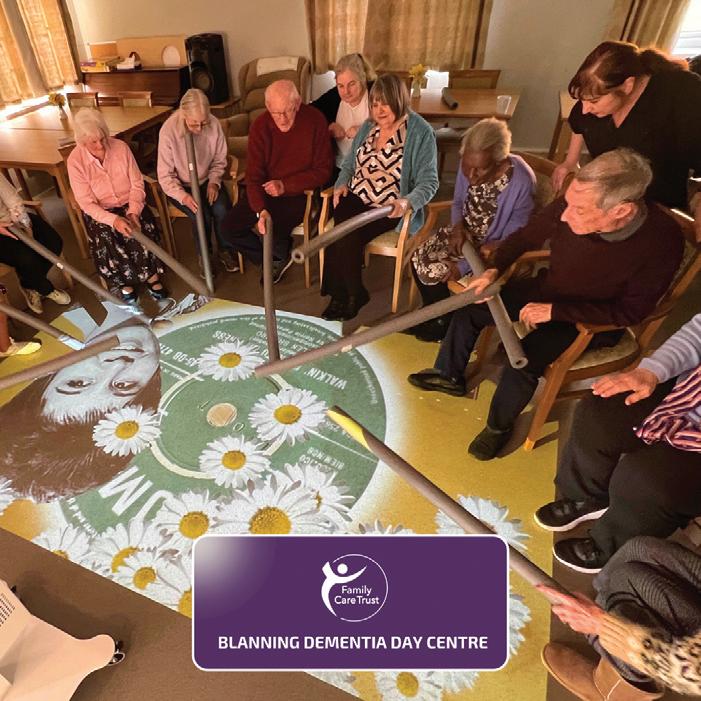
With the upcoming Immigration Bill expected to limit access to overseas care workers, providers across the UK face mounting pressure to retain and support their teams. Recruitment challenges, rising agency costs, and burnout are creating a perfect storm - one that demands creative, proactive solutions.
The Mobii offers exactly that. It simplifies activity planning, empowers staff to deliver more meaningful sessions, and helps build a workplace culture centred on pride, teamwork, and connection.
As Katherine Huntley, Activities Lead at Dewdown House, puts it:
“Staff love playing with this alongside the residents - it really helps with bonding.”
Real-World Results from UK Care Providers
The survey findings speak for themselves:
• 94% said the Mobii enables more quality time with residents.
89% saw improved mood and interaction.
81% reported enhanced wellbeing and engagement.
90% saw improved memory recall.
93% would recommend the Mobii to other care providers.
These numbers reflect what many care professionals already see every day - a calmer, happier, more connected environment where both residents and carers can thrive.
TECHNOLOGY WITH HEART
As social care continues to evolve, the most successful innovations will be those that combine practicality with compassion. The Mobii proves that technology doesn’t have to replace the human touch - it can enhance it, helping carers do what they do best: connect, comfort, and care.
For care providers looking to strengthen staff wellbeing, enrich residents’ lives, and demonstrate excellence to the CQC, the question isn’t whether they can afford to invest in engagement technology.
It’s whether they can afford not to.
The NHS has issued a ‘flu jab SOS’, with England’s top nurse warning people to get protected now, with only weeks to go before the worst of the flu season typically bites.
Eligible adults are being urged to come forward now, so they are fully protected ahead of the usual flu season peak in the winter months.
In response, the health service is making 2.4 million vaccination slots available next week – enough to vaccinate the whole of Greater Manchester or Botswana.
The NHS is calling on eligible adults to get their jab as soon as possible to stamp out the early wave of flu hitting the NHS more than a month earlier this year, with cases triple the same time last year.

It follows the biggest flu season in Australia’s history – often an accurate predictor of what is around the corner for people in England.
Today’s weekly data shows NHS teams across the country have now delivered more than 13 million flu vaccines since the rollout kicked off (13,299,775).
Three in five of all care home residents have now been protected against flu (59.4%) thanks to efforts across the country to link up vaccination and care home services to deliver jabs in-house, as well as moving the vaccines closer to home via mobile buses or by local community pop ups.
Monthly data for the first time breaks down uptake figures for two- and three-year-olds by area to help identify and tackle regional variation across the country.
Eligible adults can book an appointment to get their flu vaccine now via at their local pharmacy via the NHS App, GP practice, online at www.nhs.uk/bookflu to find your nearest walk-in service.
Duncan Burton, Chief Nursing Officer for England, said: “With just weeks left to ensure best protection against the worst of the flu season, we are issuing an urgent SOS to the eligible people who have yet to get jabbed this year.
“It is vital that the public use the over 2.4 million available appointments we have running next week to stamp out this early wave of flu cases and help shield themselves ahead of winter, when viruses tend to circulate and the NHS faces increased pressure on its services.
“The vaccine is proven to be safe and help prevent those at risk from getting seriously ill and even hospitalised from flu – so please check your local pharmacy, book an appointment online or by calling 119, or speak to your GP practice today about your winter flu vaccine”.
Flu vaccines are available for everyone aged 65 and over, under 65s in clinical risk groups, pregnant women, care home residents and carers, close contacts of those who are immunosuppressed, frontline social care workers, and health and social care staff as well as children.
COVID-19 vaccinations are available to adults aged 75 and over, older adult care home residents, and people who are immunosuppressed.
3.8 million COVID-19 vaccinations have also been delivered since October (3,859,980) and for those people eligible for both Covid and flu vaccines, over 2.6 million received them at the same time in a bid to make every contact count for those who need it most to receive their winter vaccines.
Public Health Minister Ashley Dalton said: “Vaccination is the best form of defence against flu – particularly for the most vulnerable.
“With flu cases already triple what they were this time last year, I urge everyone eligible to take up one of the 2.4 million appointments available next week.
“Getting vaccinated now means you’ll have the best possible protection in place for yourself and your loved ones, and will also be protecting our NHS as we approach the challenging winter months.”
Last year, the NHS delivered more than 18.5 million flu vaccinations to adults and children – including over half a million to 2and 3-year-olds.
The UK Health Security Agency (UKHSA) found that the flu vaccine is estimated to have prevented around 100,000 people from being hospitalised in England last winter.
Dr Suzanna McDonald, National Lead for the Influenza programme at UKHSA, said: “Flu has hit early this year and will only spread in the coming weeks. Many people often think they have flu when they only have a bad cold. If you get flu, it is nasty and for some more vulnerable it can be deadly. If you’re eligible it is because you are at greater risk. If you’ve not yet had a flu vaccine, don’t regret it later – stay strong and get vaccinated – as soon as possible”.
The NHS also recommends the RSV vaccine to pregnant women and older adults, as well as the pneumococcal vaccine to over 65s, to help protect against serious illnesses that are more common in the winter, like pneumonia.
Over 75s and those that are immunosuppressed can book their COVID-19 vaccine directly with their local pharmacy, GP practice, via the NHS app, online at www.nhs.uk/bookcovid or via 119.



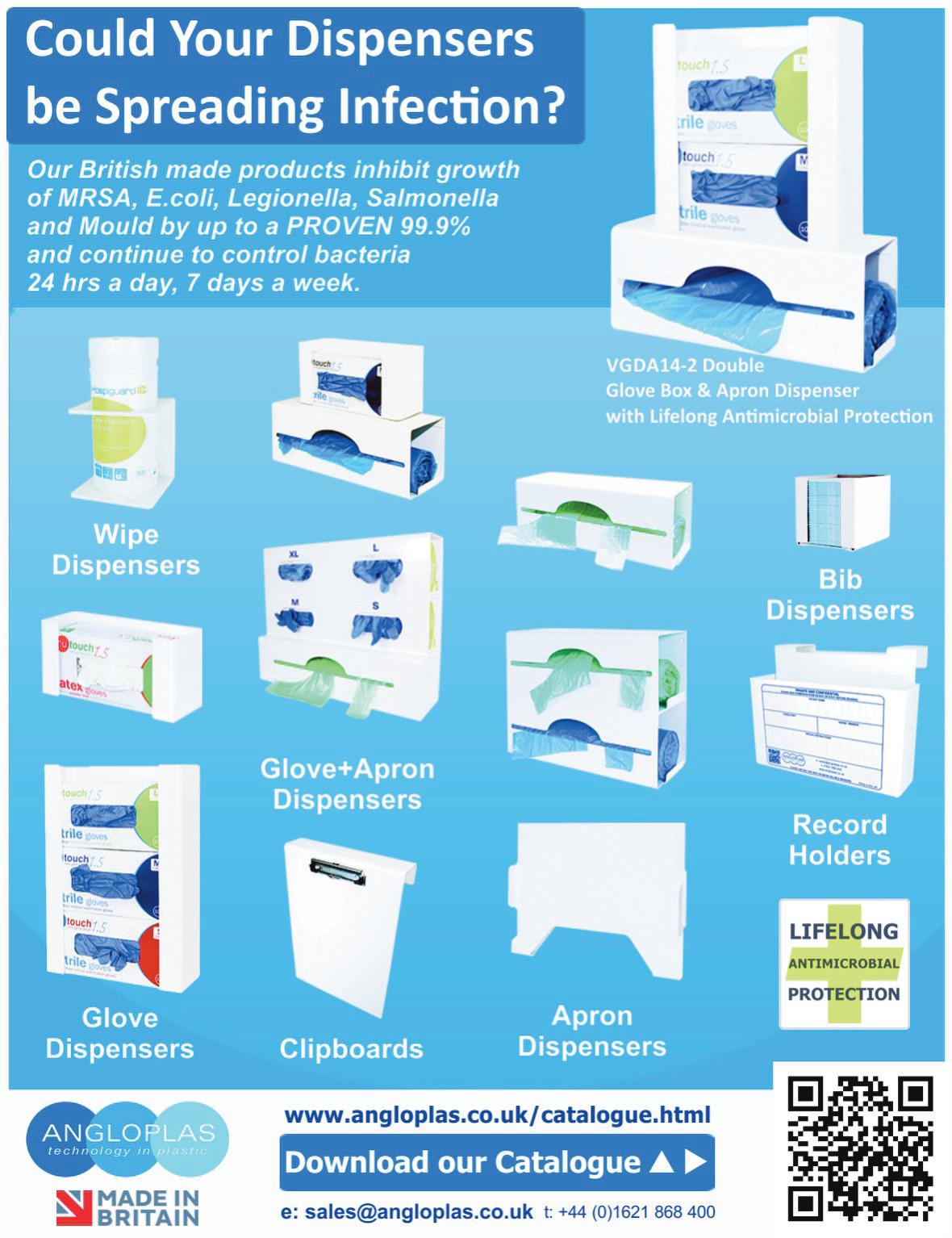

As sustainability rises up the agenda for care organisations, heat is a natural target for efficiency improvement. Andy Green, Head of Technical Solutions at Baxi, discusses the importance of planning a net zero pathway and some of the achievable options for care home operators
The UK’s circa 17,000 care homes may vary in size and age, but reliable heating and hot water is essential in each to prioritise the wellbeing and comfort of their residents. As this service is typically the largest user of energy in care home facilities, it’s also a good starting point for reducing operating costs and associated carbon emissions.
Let’s consider some of the achievable measures to improve the efficiency of the heating system and reduce its carbon impact
In our recent survey of over 400 care homes managers, budget pressures, eligibility for funding and technical understanding of achievable options were the top challenges listed when considering decarbonising heat in their buildings. Subsequent focus group sessions also revealed that unplanned replacements are common, frequently resulting in a like-for-like distress purchase rather than enabling the care home operator to plan and implement a phased approach to net zero. But with care homes coming under increased pressure to adopt sustainable practices in line with the nation’s wider 2050 net zero target, putting a roadmap in place is absolutely key. Fortunately, care home managers have access to heat experts like Baxi for support. We work closely with care homes first to understand the viable options for improved system efficiency and then to help them plot their unique net zero pathway.
The first step should always be to understand how and where energy is being used in the building. Identifying and limiting any heat loss to the environment will not only immediately improve operating costs but can significantly reduce the size or capacity of plant required when refurbishing the system – which in turn will lower the required capital expenditure.
Practical examples might include building fabric upgrades such as roof and wall insulation, draught proofing and/or improving the thermal performance of windows and doors. Adding lagging to poorly insulated pipework will also prevent heat losses within the system for improved performance. Where necessary, adjust the heating controls and thermostat settings to optimise the temperature regimes and balance energy efficiency with thermal comfort.
Light refurbishment still accounts for much of the work in the care home sectors according to our focus group research, despite the willingness shown for embarking on heat decarbonisation projects.

If upgrading to more efficient gas condensing boilers or direct-fired water heaters, use this opportunity to prepare the heating system for the integration of low temperature heat pumps at a future stage.
Addressing the system’s distribution pipework and heat emitters will allow the system to operate more efficiently at a maximum flow temperature of 55°C (or lower), in line with Building Regulations. This will also allow the condensing boilers and water heaters to operate in condensing mode, where they achieve their maximum efficiencies.
Replacing existing gas boilers or water heaters with heat pumps is the ultimate goal. New build care homes will be designed to require less heat for operational use and optimised for a decarbonised electricity grid. In buildings like these, a fully electric approach to heating and domestic hot water (DHW) based around renewable solutions such as our Auriga mid temperature and Auriga HP + high temperature heat pumps will be the favoured approach, particularly when combined with solar thermal and/or solar PV solutions.
In care homes with complex refurbishment challenges, a phased pathway may be necessary. In such buildings, a hybrid heat pump system combining heat pumps with existing boilers and/or water heaters is often a fast, affordable solution to partial decarbonisation. This will enable a large portion of the heat in the building to be decarbonised while meeting safe operation requirements.
Each care home project and building will have its own requirements, so it is advisable to consult with the experts. Experienced heating and hot water solutions providers like Baxi can help break down the complexities for care homes by clearly explaining the options and outlining the associated carbon, energy and cost impacts of each. Working together, we can help ensure that the right decision is made to meet the specific needs of your building to set it on its path to net zero.
For more information, visit: Baxi Commercial Heating and Hot Water Solutionswww.baxi.co.uk/commercial
Bennett Lodge Care Home, part of the Runwood Homes group, is proud to celebrate a truly inspiring resident, Geoff, whose passion for colouring has transformed his bedroom into a vibrant gallery of joy and self-expression.
Since moving into Bennett Lodge in July 2024, Geoff discovered a renewed love for colouring, a hobby that quickly grew into a daily routine and a treasured part of his life. By August 2024, he had begun filling his walls with completed pieces, and today, just over a year later, Geoff has displayed an incredible 727 artworks in his room.
“I really enjoy colouring, and it makes me happy to know that other people enjoy looking at my pictures too,” said Geoff. “If my artwork can make someone smile, that makes me smile as well.”
Geoff’s artistic journey is supported by his family and the team at Bennett Lodge, who helps hang each new piece proudly on the wall. The result is a room bursting with colour,
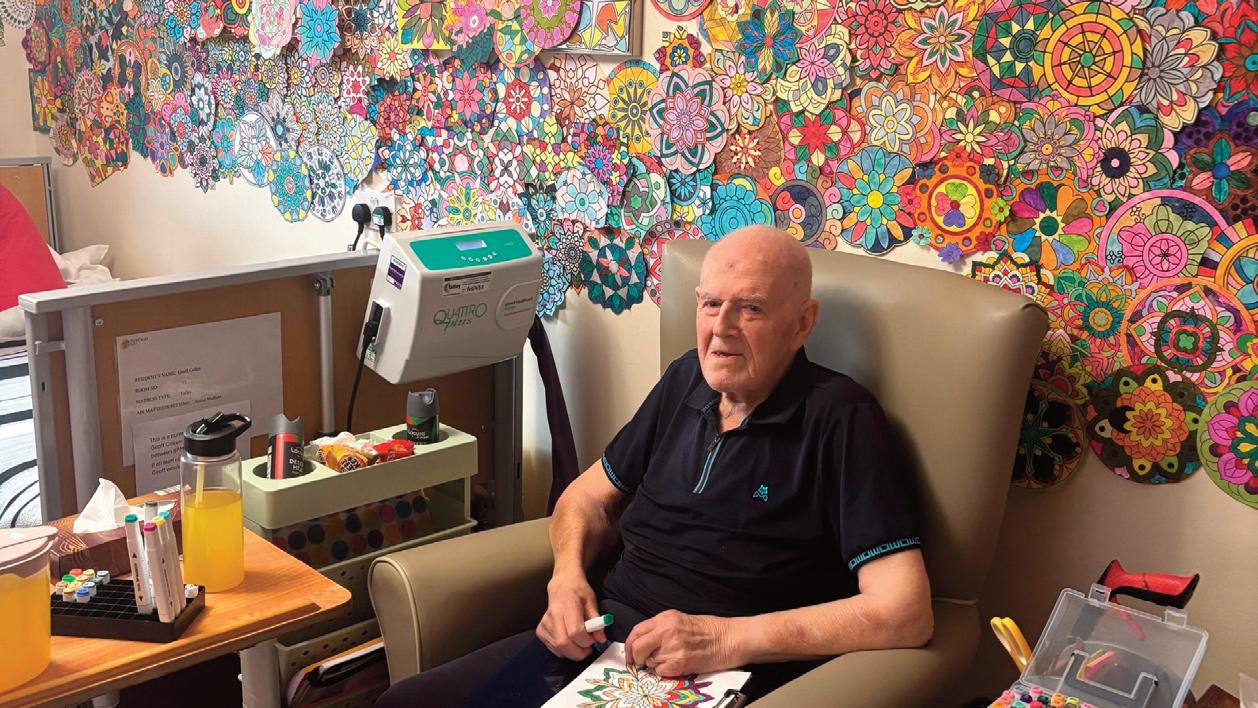
creativity, and a real sense of personal achievement.
“Engaging in colouring is not only a source of enjoyment for Geoff, but also an important way for him to express himself, stay mentally active, and maintain a sense of purpose and routine.,” said Jack, Lifestyle Coordinator at Bennett Lodge.
“His room is now a bright, uplifting reflection of his personality and happiness he finds through art.”
Even during family visits, Geoff continues his colouring, often with loved ones joining in. The activity has become a powerful source of connection, routine, and fulfilment which contributes to Geoff’s emotional and mental wellbeing.
This creative outlet has not only kept Geoff, now 97 and soon to be 98, mentally active and engaged, but also allows him to express himself in a meaningful and uplifting way.
Geoff’s story continues to inspire residents, staff, and visitors alike at Bennett Lodge, proving that small daily actions can add up to something truly extraordinary.
In April 2025, the Supporting the Provider Market (STPM) team in County Durham published a new report evaluating the use of pobroll® — a waterproof bed-bathing wrap designed to improve dignity, comfort, and ease during personal care.
This evaluation was carried out across 10 care homes with high numbers of residents living with dementia. Each setting was given one or more pobroll® units and invited to share feedback through a structured survey. The findings reveal how even simple tools can make a significant difference in everyday care.
How was pobroll® used?
Most care homes used pobroll® daily or several times per week, showing it quickly became part of regular practice. Staff noted that one of the biggest challenges was not having enough units — all homes requested additional stock after the trial, highlighting a clear appetite for wider adoption. What did care teams think?
Feedback from the care homes showed strong support for the tool:

• Ease of use was rated highly, with an average score of 4.4 out of 5. Staff found pobroll® straightforward to incorporate into care routines.
• Training was rated slightly lower, at 3.8 out of 5, suggesting that while the wrap is easy to use, additional training resources could improve onboarding for new users.
Written by Pat O’Brien of pobroll
Resident response was positive. Three in ten care homes reported improved mood or behaviour during bed bathing for dementia patients.
• Key benefits included greater warmth, coverage, and dignity for residents, especially those who might find conventional methods distressing. Some teams also found it particularly useful for end-of-life care
Would they recommend pobroll® for bed bathing for dementia patients?
Absolutely. Homes rated their likelihood to recommend pobroll® at 4.3 out of 5, with half of respondents giving it a full 5 out of 5. The overall feedback was clear: this is a valued, meaningful addition to personal care.
Would they recommend pobroll® for bed bathing for dementia patients?
The results of this trial reinforce what many professionals already believe — that small, thoughtful design changes can significantly improve care. For residents who are bedbound or living with dementia, personal care can often be a distressing experience. But with the right tools, it doesn’t have to be.
The pobroll® isn’t a complex device. It’s a simple, dual-layered cotton towelling wrap. But its thoughtful design — offering full coverage, comfort, and support — makes a real difference where it matters most.
If you’re part of a care home, hospice, or hospital and would like to explore how pobroll® could benefit your residents or service users, get in touch. We’re here to support compassionate, dignified care — one small change at a time.
See the advert on page 9 for details, or visit www.pobroll.co.uk

A care home in East Kilbride has been awarded a national Gold Standards Framework (GSF) Quality Hallmark Award in recognition of the excellent end-of-life care it provides.
Cathkin House in Nerston, East Kilbride, received the accolade at the GSF annual conference and awards ceremony on Friday 26th September in Birmingham, being recognised for their high standards of care for residents in the later stages of life.
Developed in 2004, GSF is a practical and evidence-based end-oflife care service improvement programme. It is centred around ensuring people live well in the last years of their lives and pass away comfortably in the environment and manner of their choosing.
One example of the team’s continuous excellence when it comes to palliative and end-of-life care is the Purple Butterfly initiative. Adopted from the University of Brighton, this initiative takes the purple butterfly motif and uses it as a form of visual communication to identify where a resident is in their final hours and who is caring for them. This brought more clarity to their process and allowed the team to focus on where they could do better during palliative care.
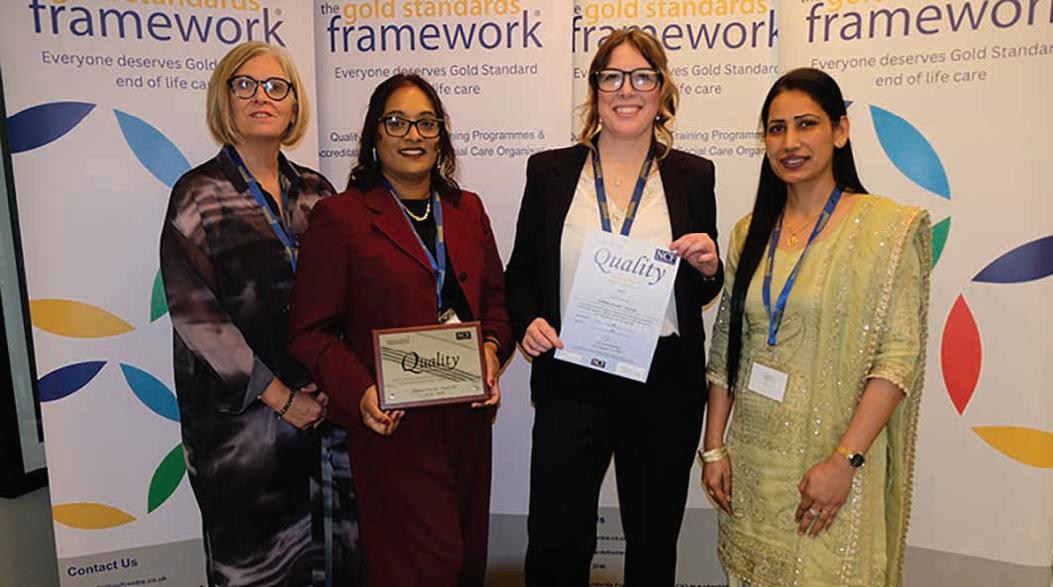
It has meant that residents and their families were allocated a specific member of the team, which greatly
reduced the number of people entering the resident’s room, optimising their dignity and peace in their final hours.
Home Manager Nisha Sujeewon said: “As a team we were very honoured to have been asked to participate in the gold standard framework for end-of-life care. This is something we have always taken pride in at Cathkin House, the delivery of excellence end of life care. End of life care is very close to my heart as I have experienced it myself with my close relative and I wanted to make sure the journey to end of life for my residents and their families to be comfortable. We considered the choices and wishes of the residents and their families to our utmost priority and staff went above and beyond making sure it was delivered. Proper communication and understanding were key factor in our care.”
Julie Armstrong-Wilson, Chief Operating Officer for GSF said: “We are delighted to congratulate all the organisations that have achieved accreditation and received the Quality Hallmark Award this year. The quality of care and the compassionate cultures we have seen is truly inspiring, reflecting a deep commitment to ensuring people receive the right care at the right time, making a real difference to them and their families, proving that generalist services can and do provide good palliative and end of life care.
A NEW Knit and Natter club at a Chesterfield care home has taken on their first charitable project – helping vulnerable children in Romania.
The club, which brings together residents at Holmewood Care Home, on Barnfield Close, for knitting and conversation, recently turned its attention to how their skills could help others.
During one of their latest sessions, the chat turned to being useful to those in need, and the group decided to knit hats and blankets for babies and young children.
Initially, they reached out to local charities to offer their handmade items. While many organisations welcomed food donations, clothing was not currently being accepted – so the residents looked further afield.
They discovered Precious Life Romania, a charity supporting children in need across the country, which welcomed the offer of warm knitted items ahead of their often harsh winter.
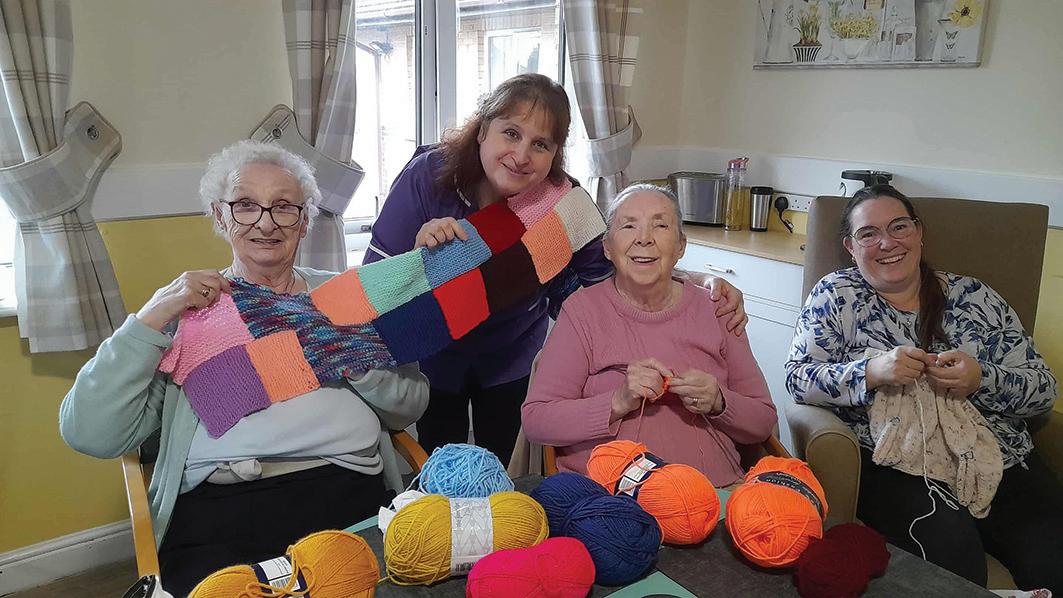
The residents, supported by their relatives, set a goal to complete their first batch before winter arrived, succeeding in producing, packing and shipping blankets and hats to Romania in time for the cold season. Betty Jones, 94, said: “It was such a pleasure to contribute to these children in need. I made a square every day for the blankets, and it felt so meaningful. I only wish I could see the children receiving the hats
and blankets.”
Vilo Turner, 93, said: “I really enjoyed it. Knitting helped me spend my time in a useful and peaceful way, and I was so happy to help in this small way.
“I have a baby grandson too, and I just love children. The time passed so quickly while making these squares.”
Corina Mihailici, activities coordinator at Holmewood Care Home, said: “We are so proud of everyone involved. The residents were so motivated, bringing in new knitted squares every day.
“The sense of purpose and joy was truly inspiring. It’s amazing how, after we decided to do this, my residents found a new sense of purpose. Every day they bring me three or four squares for the blankets.”
Cathy Shaw, home manager, added: “This Knit and Natter club has changed our residents for the better. It gives them joy, meaning, and connection.
“I’m so proud of them and I know the children in Romania will be so happy to receive their gifts."
The club’s next project is already underway, as residents are now knitting poppies in preparation for Remembrance Day – part of Holmewood’s wider commemorative activities as a certified Veteran Friendly Framework (VFF) care home.
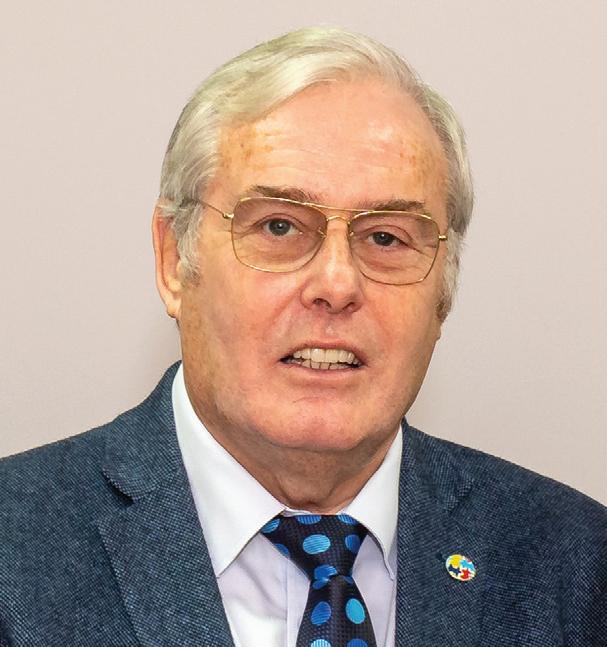
BEYOND CQC/ CIW/ CI STANDARDS
In today’s highly regulated health and social care environment, providers face the dual challenge of ensuring compliance while striving to deliver safe, high-quality, and commercially sustainable services. Care Inspections UK Limited (CiUK) has emerged as a trusted partner in this landscape, providing a professional and independent inspection service that goes beyond the standard requirements of the Care Quality Commission (CQC), The Care Inspectorate Wales (CIW) and the Care Inspectorate (Scotland), collectively “The Inspectorates”
What sets CiUK apart is its status as a registered inspection body, operating with the highest levels of professionalism and governance. This official recognition imbues care providers with confidence that inspections are carried out with rigour, objectivity, and an unwavering focus on evidence. Every report is underpinned by validated, research-based methodology, ensuring the outcomes are credible, balanced, and practical.
While CQC/ CIW/ CI inspections focus on fundamental areas such as safety, effectiveness, responsiveness, and leadership, CiUK’s approach extends further. Each CiUK inspection covers all the domains CQC/ CIW/ CI would expect, but also incorporates additional layers of analysis essential for continuous improvement. This Includes:
• Operational risk management involves identifying risks before they become incidents, reducing exposure for service users and providers.
• Quality enhancement: Assessing opportunities to raise standards in care delivery, staff engagement, and governance.
• Commercial sustainability: Offering insight into how operational practices influence financial performance, helping providers balance compliance with business viability.
The result is an inspection report that is not only regulatory-ready but also a strategic tool for improvement.
Professionalism is at the heart of CiUK’s ethos. Inspections are conducted by highly experienced professionals who bring frontline expertise from clinical, managerial, and governance roles in the care sector. This depth of knowledge allows CiUK to deliver meaningful feedback that resonates with staff at every level, from frontline carers to boardroom directors.
Independence is equally vital. As an external registered inspection body, CiUK reassures providers that its findings are unbiased and transparent. In a sector where credibility matters, this impartiality is invaluable in preparing for CQC inspections and demonstrating accountability to commissioners, investors, and the wider community.
Care providers today operate in an environment of heightened scrutiny and rising expectations. CIUK’s inspections do more than highlight compliance gaps; they provide a clear roadmap for reducing risk, enhancing quality, and driving organisational improvement.
By identifying weaknesses early, providers can take corrective action before issues escalate. At the same time, CiUK’s focus on strengths and opportunities supports a culture of positive development. This balanced approach ensures that inspection outcomes are constructive, not punitive, fostering continuous organisational improvement.
One of the most overlooked aspects of care provision is its commercial dimension. Poor compliance and weak governance inevitably carry financial consequences, from reputational damage to contract loss. CiUK recognises this and integrates commercial insight into every inspection. CiUK helps providers achieve operational excellence and commercial resilience by aligning care quality with business performance.
THE CIUK DIFFERENCE
Choosing Care Inspections UK Limited means selecting a partner committed to professionalism, independence, and comprehensive excellence. CiUK inspections do more than prepare organisations for regulatory visits—they empower providers to deliver safer, higher-quality care while protecting their reputation and commercial future.
CiUK delivers evidence-based assurance and actionable insight for providers who want more than compliance.
A new academic report from the University of Oradea has placed a spotlight on the urgent need for the adoption of better prevention, training, and safer treatment technologies to reduce harm from the growing volume of healthcare waste produced worldwide, says leading independent healthcare waste management company, Anenta. Shedding light on hazardous medical waste and its rising risks to clinical staff, healthcare workers, and those who handle medical waste, Anenta believes that the ‘Healthcare Waste Toxicity: From Human Exposure to Toxic Mechanisms and Management Strategies’ report is a sharp reminder that producers of healthcare waste need to be vigilant and diligent.
In Anenta’s view, this is particularly important in relation to the disposal of sharps, infectious, pharmaceutical, pathological, cytotoxic, and chemical waste, and applies to GPs, hospitals, laboratories, pharmacies, research centres, dental clinics, care and nursing homes.
“The findings of this study reiterate just how important segregation, governance, and training are in preventing harm to staff and the wider community,” said Kim Ormsby, Assistant Director at Anenta, adding: “It’s vital that every measure, including handling, transportation, treatment, storage, and disposal is properly understood, implemented, and audited, which is exactly why we’ve created a free e-learning module on healthcare waste to help businesses in the primary care sector.”
Covering a number of topics such as waste segregation, simplification of waste processes, waste reduction, and colour-coded containment, the 45-minute training module is accessible free of charge to care homes, and healthcare professional via the Health Education England online portal. These courses help those in the primary care sector meet duty of care obligations and ensure consistent adherence to environmental and CQC standards.
This, in turn, helps smooth the pre-acceptance and duty of care

audit process, which is essential for compliance under the Environmental Protection Act 1990, and helps avoid the risk of waste contractors refusing to make collections due to instances of ‘non-compliance.’
Aided further by Anenta’s remote hazardous waste audits, which give care homes, nursing homes and producers of healthcare waste the ability to conduct compulsory duty of care and pre-acceptance audits in as little as 40 minutes, Anenta has removed the need for tedious third-party on-site audits, which can take up to 6 days. In addition to saving time, Anenta’s online solution also reduces costs by up to £800.
Combined, this process helps to ensure compliance for care homes
whose staff are exposed to a range of different types of waste, including sharps, clinical, infectious, and offensive waste.
“Protecting workers and the wider community from the dangers of medical waste is critically important,” says Ormsby. “Without consistent training and clear policies, staff can all too easily be put at unnecessary risk, which is why we work closely with care and nursing homes to ensure that their waste management processes are streamlined and effective, ensuring a safer healthcare environment for all.”
Anenta, which was awarded the Healthcare Waste Management Company of the Year title at the prestigious Healthcare Business Review Europe Awards 2025, acts as an external contract manager delivering bespoke, affordable, and professional services across recycling, general waste, saniwaste, confidential, and clinical waste streams. Managing over 450,000 collections annually from more than 20,000 locations, Anenta has saved its clients over £13 million directly, while introducing workplace efficiencies that have generated a further £35 million in savings.
Much of these savings are possible thanks to Vector, Anenta’s proprietary, multi-stakeholder system, which equips all parties in the healthcare waste supply chain with real-time updates on documentation, billing, compliance and outcomes. Highlighting inefficiencies and providing data-driven insights to improve service, delivery and operational performance, Vector ensures the delivery of fair billing practices through the analysis of thousands of invoices to identify and address any instances of overcharging.
Free training module: https://portal.e-lfh.org.uk/Component/Details/763177 Website www.anentawaste.com
Contact page https://www.anentawaste.com/contact-us/ Call 03301222143
Ringwood care home residents attended a reflective candlelit event in Wimborne Minster to honour loved ones.
Residents from St Ives House care home, which is run by not-forprofit care provider, Care South, attended Lewis-Manning Hospice Care’s Candles on the Green event which took place in Wimborne Minster. Care South were proud to be the headline sponsors of the event in support of Lewis-Manning Hospice Care, which provides support to people with life-limiting illnesses and their families across East Dorset.
St Ives House residents were also joined in VIP seating reserved at the front of the church by residents and the team from Elizabeth House care home in Poole, which is also run by Care South. Hundreds of people turned out for the event which aimed to bring the community together to reflect and celebrate the memory of their loved ones. Candles were lit and placed on the minster green in candle bags displaying handwritten dedications in memory of family, friends and loved ones who have passed away. Inside the packed church, which was left with standing room only, guests listened to speeches from Jo Sharkey from Lewis-Manning Hospice Care’s Family Support and Bereavement Team, and Simon Bird, CEO of Care South. Music on the day was provided by the Salvation Army Band, Cantilena Voices, and Rock Choir. Betty, a resident at St Ives House, said: “It was a very nice service and it was nice to come out and be

part of the local community.”
Ken, another resident at the home, added: “I enjoyed it. I thought the choirs were especially good and looked as though they were enjoying themselves.”
Emma Cotton, Home Manager at St Ives House, said: “It was a privilege to enable our residents to attend Candles on the Green to join other members of their local community. Our residents really appreciated the opportunity to be part of such a meaningful, thought-provoking occasion, particularly as we head towards the festive season, which can sometimes be an emotional time for many as they reflect on missed loved ones. At St Ives House, we are always keen to support local events like this that bring people together and strengthen community connections.”
Anna DuRose, Events Fundraiser for Lewis-Manning Hospice Care, said: “We were delighted to welcome the residents and team from St Ives House to Candles on the Green. It is a very special event for our community, giving people the opportunity to remember loved ones while supporting the hospice’s work.” St Ives House, on Horton Road in Ringwood, provides residential, respite, and dementia care. Residents enjoy a daily programme of events led by an in-house activities team helping them to socialise and build friendships.
Repose Furniture is one of the UK’s leading manufacturers of bespoke seating solutions, with a reputation built on craftsmanship, innovation, and a strong commitment to improving the quality of life for its customers. Established in 1999 and based in the West Midlands, the company has grown from a small family business into a trusted supplier to both the domestic and healthcare markets. Every chair produced by Repose is handmade in the UK, with an emphasis on quality, durability, and comfort, ensuring that each product meets the specific needs of its user.
Whether for home use or demanding healthcare environments, Repose combines skilled upholstery techniques with modern engineering to create chairs that provide postural support, pressure management, and ease of use. Their wide product portfolio includes rise and recline chairs, hospital and care home seating, bariatric solutions, and specialist products designed to address particular medical and lifestyle needs. An essential element of their offering is flexibility: customers can choose from a range of back styles, seat cushions, mechanisms, and fabrics, allowing each chair to be tailored to the individual. Interchangeable parts mean that a chair can adapt as a user’s requirements change, extending the product’s longevity and ensuring value for money.

The healthcare sector is a particular area of expertise for Repose. They strive to design chairs that balance comfort with clinical functionality. Features such as tilt-in-space mechanisms, adjustable cushioning, and pressure relief options make their healthcare seating particularly suited to long-term use in hospitals,
hospices, and care homes. The company’s bariatric range demonstrates the same careful attention to detail, offering robust yet comfortable solutions for larger users.
While customisation is the centre of the Repose offering, they also recognise the urgency often faced in healthcare settings. To address this, Repose have developed their Healthcare Express Chairs, designed to deliver high-quality healthcare seating at speed. The models in this range can be despatched within just five working days. The Multi Bari Express and bestselling Boston Express, for example, are available on this five-day lead time, offering care providers a rapid solution without sacrificing quality or functionality. For less specialist needs, some homecare models are even available on faster turnaround times, demonstrating Repose’s ability to balance responsiveness with craftsmanship.
Repose’s reputation is further reinforced by its after-sales support, 5-year manufacturing warranty, and commitment to ethical and sustainable practices. With a UK-based factory, a dedicated distribution network, and close relationships with healthcare professionals, the company continues to be a trusted partner in multiple sectors throughout the country and beyond.
In combining bespoke design with reliable express options, Repose Furniture stands out as a manufacturer that truly understands the diverse needs of its

HC-One’s Primrose House Care Home in Haslington, Crewe, has proudly won the Training and Development of the Year award at the National Care Awards 2025 on Friday 7th November at Park Plaza West Minster Bridge in London, recognising its outstanding commitment to staff development and excellence in dementia care.
Over the past year, three senior team members, Jasmin Desingco (Deputy Home Manager), Chloe Taylor (Nursing Assistant), and David “Craig” Joinson (Nursing Assistant), led a transformative initiative by completing Tier 2 Dementia Coach Training. This enabled them to deliver a comprehensive six-part dementia training module to all 62 colleagues at Primrose House, fostering a culture of compassionate, informed, and person-centred care.
The training has not only enhanced the skills and confidence of staff across all roles, including ancillary teams, but also had a measurable impact on resident wellbeing. Notably, the home achieved an Outstanding rating for dementia care in its most recent internal inspection. Furthermore, the initiative contributed to an 80% reduction in “as required”

antipsychotic medication, addressing behavioural triggers through improved understanding and support.
Primrose House’s innovative approach has inspired wider adoption across HC-One, with team members invited to speak at internal events and develop a condensed version of the training for residents’ families and friends.
Dawn Sadler, Home Manager at Primrose House, said: “We are absolutely thrilled to win the Training and Development of the Year award. This recognition reflects the dedication and passion our team shows every day, empowering colleagues to provide the very best care.
I am incredibly proud of Jasmin, Chloe, Craig, and the whole Primrose House team for creating a truly kind and compassionate care environment.”
The National Care Awards celebrate excellence across the adult social care sector in Great Britain, highlighting individuals and teams making a real difference in the lives of those they support.
and
Students from the school’s Sycamore Class visited the home to hand-deliver letters to each resident. In their letters, the pupils introduced themselves and shared their favourite subjects and hobbies.
The Pen Pals initiative follows a series of visits from Barrow URC Primary School, including a performance from the school choir.
One resident said, “I really enjoyed reading my letters from the school children and finding out all their hobbies. I received letters from two pupils, so I wrote back to both. I’m looking forward to
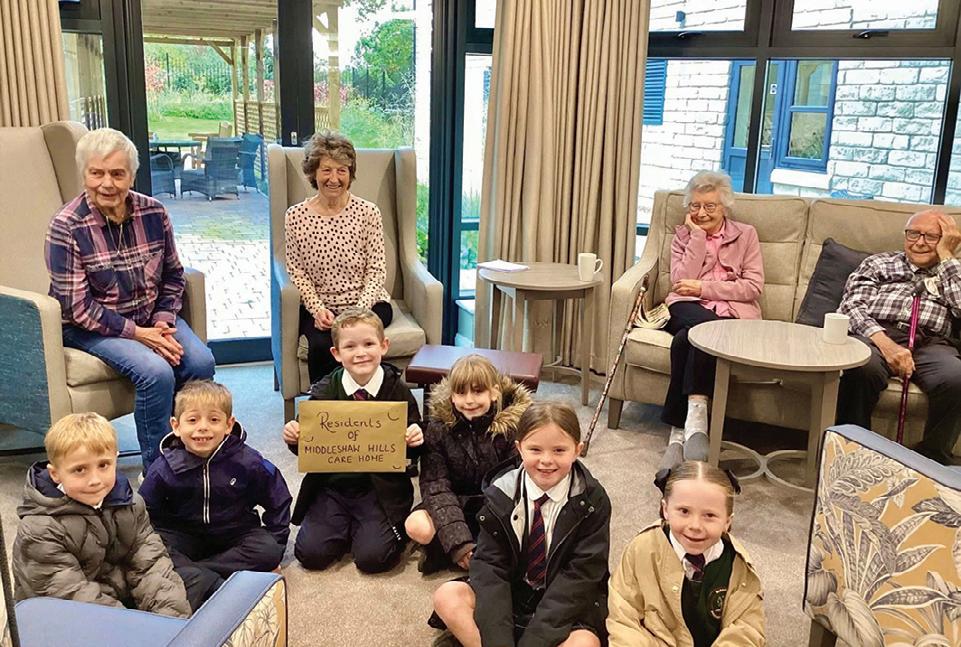
hearing back from them!”
The Middleshaw Hills team is now organising a return visit, where residents will personally deliver their letters back to the Sycamore Class.
On 5th November, the children will join residents for a Remembrance Day craft session to create poppies. Together, they will also establish a commemorative area in the home’s garden, where poppies will be planted as a lasting tribute.
Charlottle Pardon, the General Manager at Middleshaw Hills, added, “Our ongoing relationship with Barrow URC Primary School has been invaluable for our residents, and the Pen Pals scheme is another great way for them to connect with the younger generation.
“Community is a huge part of life at Middleshaw Hills, and we can’t wait to see the students again in November.”
Home adaptations teams have a unique tool to help expediate fast, efficient aids to help people be safe at home.
The number of, and wait time for, adaptations continues to grow, with stairs being the second most common hazard in the home. In conjunction with Occupational Therapists, AAT has developed its Universal Seat System for its brand-leading S-Max Sella stairclimber.
The combination amplifies adaptations teams’ ability to optimise use of budgetsusually without even requiring DFG funding- to deliver a safe stairway transfer solution within days, by recycling (re-issuing) the equipment.
The S-Max Sella provides a safe stair transfer solution in 99+% of cases which AAT assesses. The portable Class 1 Medical device certified kit requires no installation nor structural alteration to the home. The addition of the Universal Seat System means the Sella can be easily set up to ensure almost every potential user is safe and supported when using the Sella, irrespective of their physical and/or mental impairment. It is achieved without the need to purchase extra accessories. No other stairway transfer
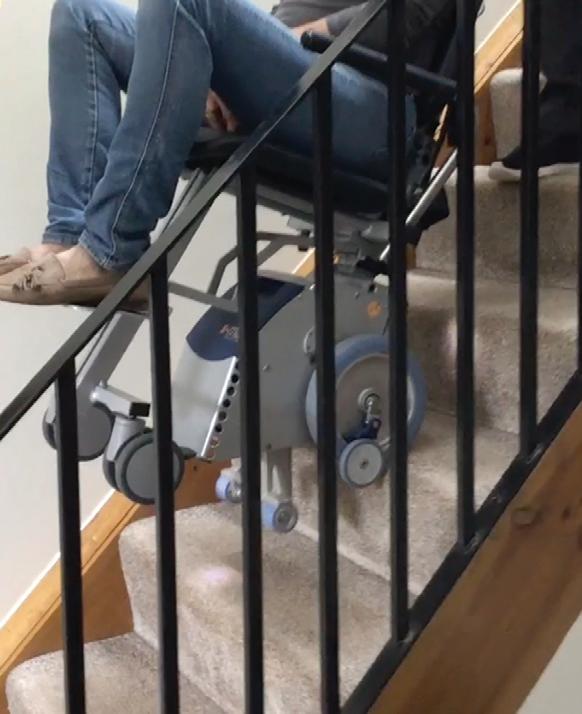
system offers such flexibility.
As part of the offering, AAT will also support the adaptation team in the assessment process, to ensure the relevance of the solution for the person, the occupation and the environment, and personally train the carer in the Sella’s safe operation.
“We have numerous examples of community equipment services (eg Nottinghamshire & Nottingham City) now buying not just additional Sella stairclimbers, but Universal Seat Systems, to have in equipment stores ready to go, so they can quickly deliver a solution for a client,” says Peter Wingrave, AAT Director.
“Even if it is a short-term solution whilst a larger and/or more permanent adaptation is undertaken, our Sella/Universal Seat System and re-issue capability gives a highly cost-effective and fast way to manage the potential risk of someone falling on the stairs: a genuine adaptation without delay.”
Full details of the Sella and Universal Seat System can be found on AAT’s website @ https://www.aatgb.com/s-max-sella/, where adaptations teams can also book a free, no obligation client assessment or team demonstration session.
According to data from carehome.co.uk, there are approximately 441,479 people residing in care homes across the UK.
For these individuals, the supported, structured environment of a care facility affords them a degree of independence and autonomy, alongside the medical and professional assistance needed to lead a healthy, safe, and fulfilling life.
Yet care homes are not without risk. Research suggests care home residents are three times more likely to experience a fall compared to those living in their own homes. Fortunately, advancements in technology, engineering, and facility design are actively tackling these risks, increasing the safety for those living in supported environments.
Pinpoint’s P2 alarm system is one of these solutions.
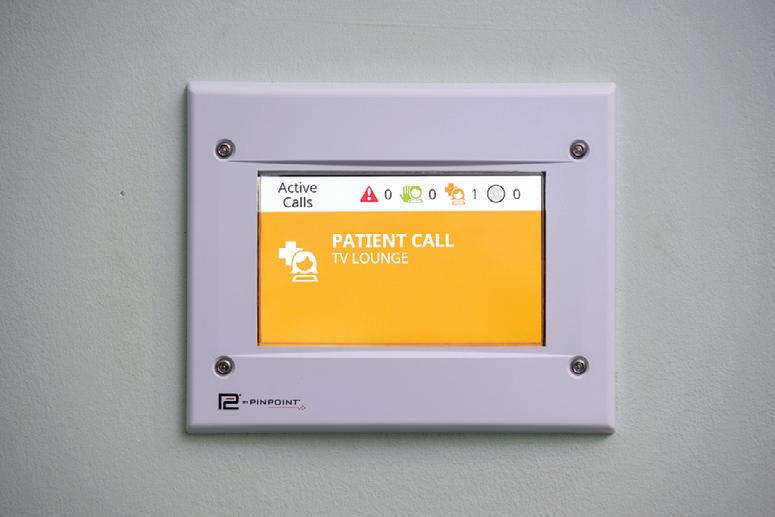
Enabling care home residents to summon professional support instantly, the Pinpoint System establishes a clear line of communication between residents and care staff. By pressing a button on a Patient Call Button, the user alerts staff members to the need for help and the exact location of an active call. This information, displayed on a staff communication device, elicits an immediate response to deliver the required support.
For individuals more vulnerable to falls or accidents, the Pinpoint System ensures that medical assistance is readily available, offering reassurance to care home residents and their families that help is always at hand and that high-risk incidents are handled efficiently.
On a day-to-day basis, the Patient Call Buttons are used by residents in need of extra assistance, such as when using the bathroom, to get out of bed or to access certain rooms within the facility. In this way, the Pinpoint System gives individuals a greater degree of control over their routine and avoids the need for 1-1 supervision, enhancing their quality of life.
The Pinpoint Patient Call Buttons come in various forms, including Wrist PITs, which are worn on the wrist of the individual, and wall-mounted alarms. Wander Leads of up to 2 metres in length can also be plugged into wallmounted alarms to allow resident with limited mobility to activate the alarm from their bed or armchair.
Biomaster technology provides 24/7 antimicrobial protection for all devices, preventing the spread of bacteria in care facilities, while an Ingress Protection rating of 67 allows Patient Call Buttons to be installed in bathroom and kitchen facilities where residents may be more vulnerable to slipping.
The presence of the Pinpoint System gives care home residents the chance to maintain a level of independence, while being safe in the knowledge that professional assistance can be accessed quickly and easily. This balance between site security and individual autonomy instils residents and their families with confidence that support is always available, and the peace of mind that the wellbeing, safety and health of the individual is the care home’s top priority.
Please see the advert on the facing page or visit www.pinpoint.ltd.uk
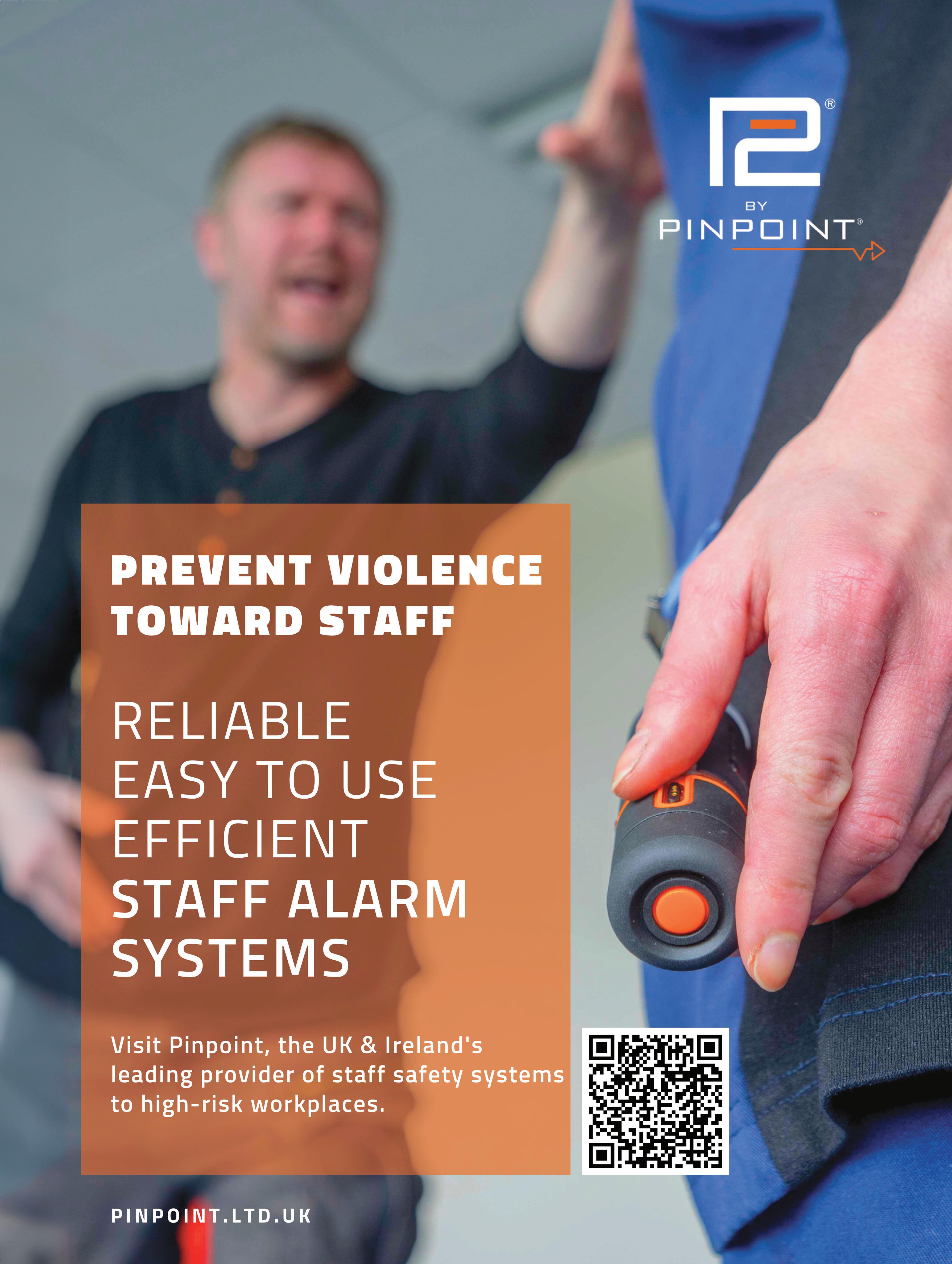
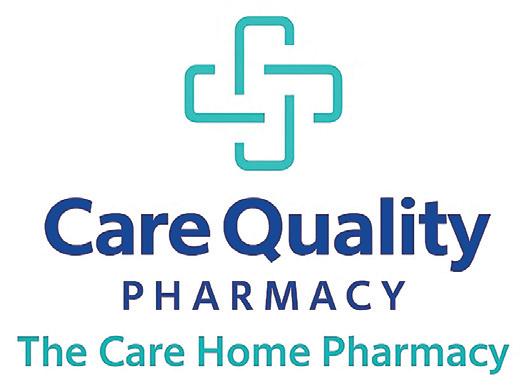
In the complex world of care-home medicine management, consistency and reliability are everything. From ensuring the right medicines arrive on time, to providing specialist support and training for staff, a single weak link can jeopardise the safety and well-being of residents. That is why more and more care providers are turning to Care Quality Pharmacy – a national, care-home-only distance-selling pharmacy – to deliver a true one-pharmacy solution.
CONSISTENCY AND SIMPLICITY
Running multiple homes often means juggling relationships with several local pharmacies. This can lead to variations in service levels, communication gaps and unnecessary administrative burden. By partnering with a single specialist pharmacy, care providers enjoy a unified approach across every home. Care Quality Pharmacy provides guaranteed monthly delivery dates, centralised prescription management and a dedicated Key Account Manager, ensuring that every home receives the same high standards of service.
ADVANCED TECHNOLOGY AND COMPLIANCE
Care Quality Pharmacy harnesses advanced AI-driven prescription checking and integrates seamlessly with leading electronic MAR (eMAR) systems. These innovations reduce the risk of dispensing errors and give care
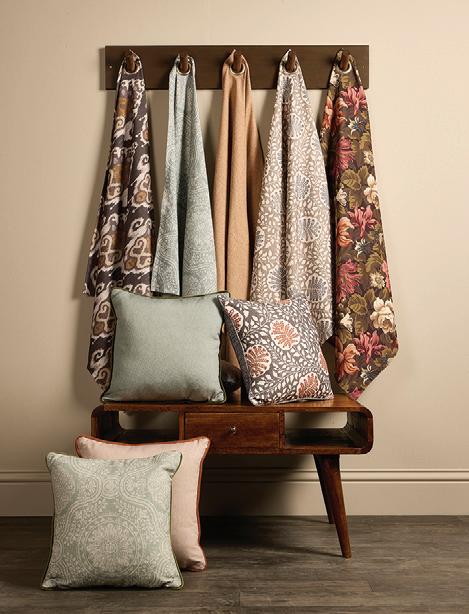
teams real-time oversight of residents’ medication records. The pharmacy’s robust auditing and returns collection processes support full regulatory compliance, while scheduled annual training sessions keep staff confident and up to date with best practice.
OPERATIONAL EFFICIENCY AND COST SAVINGS
A one-pharmacy solution eliminates duplicated processes and frees up valuable staff time. With Care Quality Pharmacy’s dedicated communications team liaising directly with GPs, homes save hours previously spent chasing prescriptions or clarifying medication queries. Interim requests are handled swiftly – often the same day –and returned medicines are collected routinely, further reducing workload and waste.
A PARTNERSHIP BUILT ON TRUST
Perhaps the greatest benefit is peace of mind. Care Quality Pharmacy’s national infrastructure, experienced team and proactive approach mean care-home operators can focus on delivering exceptional care while knowing that every aspect of their medicines management is in expert hands.
In a sector where safety, compliance and resident well-being are paramount, a one-pharmacy solution is not just convenient – it is transformative. Care Quality Pharmacy brings together specialist knowledge, cutting-edge technology and a commitment to personalised support, making it the trusted partner for care homes across the UK.
See the advert on the back cover for further details.
Each year Skopos launch new fabric collections, developed specifically with Care interiors in mind. Specialists in key attributes which help keep homes looking fresh and stylish (soil resist, antimicrobial) interior schemes can easily be pulled together using a mixture of prints, textures and plains. Leading the way at this year’s show, Skopos will be highlighting their new range of printed designs, from the Skopos STUDIO. Available on base-cloths for upholstery, bedding and curtains, the fabric choices have grown, to include a waterproof and antimicrobial velvet upholstery and a textured woven upholstery. Designs from the STUDIO are split into different categories, including stripes, florals, geometric and textures. Skopos can offer a fabric-only service or a full service; with site measure, product manufacture and installation. The Skopos team produce approximately 25,000 made-up items
CareZips® Classic are patented, easy dressing unisex adaptive pants designed for older and disabled people suffering with problems associated with continence, mobility, mental function and cognition. Suitable for persons living in care institutions, receiving care at home or living independently at home, CareZips® Classic enable people to dress themselves or with assistance from carers.
CareZips® Classic feature patented 3-zipper system, which opens the front of the pants from the waist to the knees for quicker access during toileting, continence pads changes and personal hygiene. The forward positioning of the two side zippers lessens pressure on sensitive hip areas, helping to eliminate discomfort. The third zipper facilitates simple full frontal opening for faster more dignified diaper changes, catheter adjustments, personal cleansing and hygiene routines.

CareZips® Classic have many benefits for the older and disabled users and their carers:
• People dressing themselves enjoy the practical functionality and versatility of the CareZips®
Classic, all day comfort and easy garment care.
• People dependent on assisted dressing appreciate quick easy dressing process with less stress, embarrassment and greater dignity offered by CareZips® Classic.
• CareZips® Classic offer practical gains to the carers, helping them to provide better care, whilst reducing physical efforts and saving valuable time.
CareZips® Classic are unisex, available in 6 sizes and 3 practical colours (i.e. black, charcoal and navy). Tapered fit at the ankles gives a tidy appearance. Made from breathable moisture-wicking 4-way stretchy crease-free and easy-care durable fabric, CareZips® Classic are comfortable, practical and conveniently functional.
For more information, contact Win Health Medical Ltd - 01835 864866www.win-health.com
See the advert on page 3 for further information on Win Health’s product range.
Angloplas are a UK manufacturer who specialise in producing dispensers for the health and hygiene industry. Although these are designed to keep the workplace tidy and uncluttered they are, more importantly, built knowing the control of healthcare-associated infections (HCAIs) are a priority for healthcare providers, and who are employing a combination of infection prevention and control strategies, including hand hygiene, cleaning, training and the adoption of new technologies, to tackle the problem. As a result, a wide range of infection control products and technologies are emerging on the market, including antimicrobial technology. Angloplas’ range of dispensers are produced in the world’s first proven

Antimicrobial PVC with silver ion technology and which is exclusive to Angloplas. This helps reduce the risk of cross infection by stopping the growth of bacteria and mould and works continuously for the lifetime of the product, reducing levels of bacteria such as MRSA, E Coli, Legionella, Salmonella and mould by up to 99.99%.
For non-clinical environments Angloplas has recently launched its new Budget Range of products which are made to the same exacting standards as the antimicrobial protected ones but with lower price tags. You can order Angloplas products directly from its website at www.angloplas.co.uk See page 17.
each year, including bed-throws, cushions and pairs of curtains, all manufactured by a highlyskilled team of machinists, cutters and pattern makers; items that are delivered and installed into different contract environments.
As with all Skopos prints, the lead-times are under one week and everything is produced locally, in Yorkshire.
Skopos also offers a Bespoke design service, for statement interiors that require something different. Our design team will work alongside you to develop ideas which can make your caring interior personal, branded and unique.
For samples of any of our collections visit www.skoposfabrics.com
In today’s care sector, where equipment failure can directly impact patient safety and service quality, proactive asset management is nonnegotiable. Enter Assetain, Medaco’s pioneering solution designed to manage the complete lifecycle of patient-handling equipment - from first supply to planned obsolescence.

Launched in August 2025, Assetain delivers three core benefits: comprehensive asset visibility, budgetwise maintenance, and strategic replacement planning. Rather than reactively repairing faulty devices, care homes, NHS Trusts, and SEND schools can now oversee the health of all moving and handling equipment with confidence and clarity.
At its heart lies a meticulously maintained, data-rich register. The programme initiates with a full audit of existing assets; each entry is ported into a dynamic system setting tailored maintenance thresholds, repair-vs-value benchmarks, and clear end-of-life triggers.
Field engineers play an essential role - capturing photographic evidence of faults and functional assess-
ments, which are promptly linked to each record. This approach adds both accountability and immediate insight for stakeholders. Timely alerts are a standout feature. When equipment approaches “no-longer-manufactured” status or reaches its recommended service term, Assetain sends clear notifications - empowering teams to anticipate challenges before they arise. Regular updates of the full asset register ensure stakeholders remain fully informed of the condition and availability of their entire fleet.
Assetain isn’t just maintenance - it’s strategic careasset stewardship that saves time, reduces costs, and safeguards patient well-being. A smart, forward-thinking programme like this helps care providers shift from reactive firefighting to purposeful planning.
In short, Assetain elevates care facility operations into a new era of efficiency and confidence - where every asset is seen, scheduled, and systematically sustained.
www. medaco.co.uk/solutions/assetain/
Consort Claudgen now offers Wi-Fi-enabled low surface temperature heaters that can be controlled through a digital control panel on the heaters or the Consort Connect app. Features include a 7-day timer with 24 daily heating periods, a lock function, open window detection, custom automation, and energy consumption statistics. Additionally, LST heaters with Wi-Fi and occupancy sensor have a self-learning control ability which uses in-built occupancy sensors to

detect and learn a user’s weekly presence in a room. It then creates a heating schedule and automatically warms the room according to the detected or predicted occupancy. When the space is unoccupied, the heater will conserve energy by switching to a setback temperature or frost protection mode.
Consort's website also offers BIM objects for download. See page 17 or 01646 692172 | sales@consortepl.com | www.consortepl.com


Mobile Kitchens Ltd specialises in the hire or sale of temporary catering facilities and foodservice equipment. Ideal for events or to provide temporary catering facilities during your kitchen refurbishment, our versatile units and equipment offer an efficient and economic solution to the caterers’ needs.
Production Kitchens, Preparation Kitchens, Warewashing Units, Dry Store Units, Cold Rooms and Restaurant Units are available as individual units in their own right or they can be linked together on site to form a complete complex.

Alternatively, we can offer modular, open-plan facilities, usually for larger, longer-term hires. We offer a free design service, and project management from concept through to delivery and installation on site, plus full technical support throughout the hire period.
Commercial Kitchen and Laundry Solutions (CKLS) are one of the UK's leading suppliers of commercial kitchen and laundry equipment. Whether you are a small sized residential home or large scale nursing home group, CKLS has the expertise and equipment you need to keep your operations running smoothly.

At CKLS, we understand that the success of your business depends on the quality of the equipment you use. That's why we've made it our mission to provide businesses across the UK with the highest quality commercial laundry and kitchen equipment available. We work with only the best manufacturers in the industry to ensure that our customers get the most reliable and efficient equipment possible.
Our commitment to our customers doesn't end with the sale of our equipment. At CKLS, we know that maintenance and repairs are crucial to keeping your equipment functioning at its best. That's why we offer a full range of maintenance and repair services
to our customers, including emergency repair services available 24 hours a day, 7 days a week.
We believe that our success as a company is measured by the success of our customers. That's why we're constantly striving to provide better products and services to help our customers achieve their goals. We're proud to say that our commitment to excellence has earned us a reputation as the go-to provider of commercial laundry and kitchen equipment in the UK.
So, if you're looking for reliable, high-quality commercial laundry and kitchen equipment, look no further than CKLS. With our extensive range of products and services, we're confident that we can help you find the right equipment to meet your needs and keep your business running smoothly for years to come.

By Charlotte McKay, Head Chef at St Quentin Care Homes (https://hmtstquentin.org)
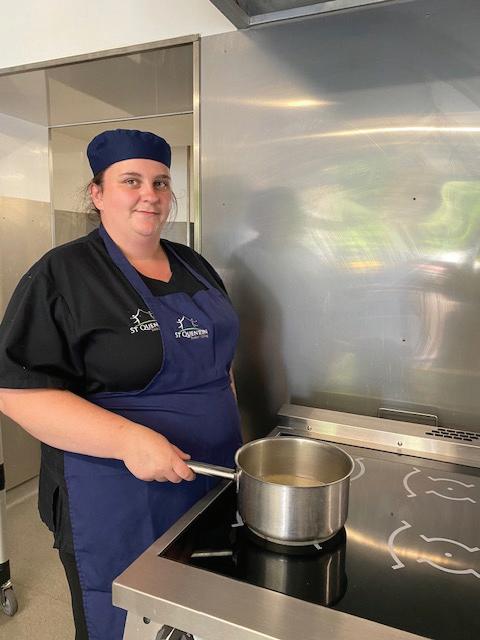
In a care home, catering can be the difference between mealtimes that are anticipated with pleasure and those that are simply endured. Care itself is rightly personalised, tailored to the needs and preferences of each resident. The same principle should apply to the food they eat. Residents and their families are entitled to expect meals which reflect dietary needs, medical conditions, and personal tastes. But delivering that level of personalisation at scale, within budget, is no small task.
The Healthcare Management Trust acquired St Quentin Care Homes almost a year ago and has made significant improvements in care delivery, infrastructure, and leadership. Catering was a big area of focus and has brought tangible results: residents returning for second helpings, heartfelt thanks from families, and a noticeable reduction in food waste. These results haven’t happened by chance; they are the outcome of deliberate choices in how we source ingredients, design menus, and create the overall dining experience.
FRESH INGREDIENTS AND A VARIED MENU
The value of using fresh ingredients over pre-packaged or heavily pro-
cessed alternatives cannot be overstated. Fresh produce boosts nutritional quality, enhances flavour, and increases the likelihood that residents will eat and enjoy their meals.
Variety is equally important. A repetitive or bland menu fails to tempt people to the dining room. Similarly, introducing a rotating weekly menu with diverse flavours and textures, including vegetarian and vegan options, will create something for everyone, which is especially important where care homes support residents of varying ages and cultural backgrounds.
Style should never overtake substance, but presentation matters and plays a vital role in whether a meal is eaten. An unappealing plate can lead to food being left untouched, no matter how nutritious it is.
Small touches make a big difference. Balancing colours on the plate, arranging food attractively, and serving it on crockery that complements the meal will encourage meals to be finished. Even something as simple as offering a platter of sandwiches with varied fillings, so residents first see vibrant colours rather than just bread, can boost appetite and engagement.
Many care home residents are unable to visit restaurants, and for them, mealtimes are often the closest equivalent to dining out. Recreating elements of that experience can lift the mood and turn a necessary routine into a highlight of the day.
Printed menus with clear, attractive typography help residents feel they have real choice and control. For some, reading a menu may even stir
fond memories of past outings and family meals. This small detail reinforces the dignity and pleasure of the dining experience.
Sharing food is a social occasion. In care homes, shared meals can foster community spirit, reduce loneliness, and spark conversation. Making mealtimes engaging and enjoyable benefits both emotional wellbeing and nutritional intake.
This means paying attention to more than just the food. Lighting, music, table layout, and staff interaction all contribute to the atmosphere. A team that works seamlessly from kitchen to dining room by greeting residents warmly, knowing their preferences, and encouraging participation can transform mealtime into a joyful daily event.
Great catering doesn’t happen in isolation. It relies on strong collaboration between chefs, care staff, activities teams, administrators, residents, and families. Open communication ensures dietary needs are met, allergies are avoided, and preferences are respected.
When everyone takes shared responsibility, residents benefit from meals that are not only safe and nourishing, but also deeply satisfying. The catering team gains valuable insight from care staff who know residents well, while residents themselves feel heard and valued.
Ultimately, catering in a care home is about far more than providing three meals a day. It’s about respecting individuality, supporting health, and creating moments of joy. When meals are thoughtfully planned, beautifully presented, and shared in a warm environment, they nourish the body and the mind.
Danielle Smith, registered nutritionist and head of nutrition at Added Value Enterprises Ltd (AVE), explains how nutritional consultancy can enhance the wellbeing of residents in care homes
In care homes, food is far more than a daily routine - it is central to health, comfort, and quality of life. Mealtimes are moments of dignity and social connection, yet the nutritional value of what is served plays a critical role in residents’ wellbeing. As awareness of food and health grows, the sector faces a vital challenge: to move beyond meeting the minimum requirements to embracing nutritional guidance that truly supports residents.
For years, catering has focused on compliance such as reducing salt, lowering sugar and limiting fat. But good nutrition is also about what we add: nutrient-dense ingredients, fresh produce and the creation of recipes that avoid over-reliance on ultra-processed products. Families are asking sharper questions about what’s included in meals and inspectors increasingly recognise the link between diet, health, and resident satisfaction. This is where effective nutrition consultancy makes a difference. Regular menu analysis and assessing how

healthy a dish is can highlight where small adjustments can bring big benefits. Bespoke advice ensures meals meet specialist needs ranging from dysphagiafriendly recipes to heart-healthy dishes that promote long-term vitality. Importantly, training equips catering and care staff to understand why nutritious food matters. At AVE, we can provide guidance that is practical as well as strategic: from developing tailored menus to creating engaging wellbeing initiatives such as hydration days or condition-specific workshops. We can analyse menus to assess the nutritional value of each dish and provide advice on how to make improvements. By embedding this expertise, care homes can demonstrate both compliance and genuine commitment to residents’ health and wellbeing.
In today’s landscape, nutritional oversight is not an optional extra - it is a cornerstone of quality care. With residents and families better informed, the homes that embrace guidance will not only meet expectations but exceed them, ensuring food continues to nourish both body and mind.
See the advert on this page for details, visit www.a-v-e.com or
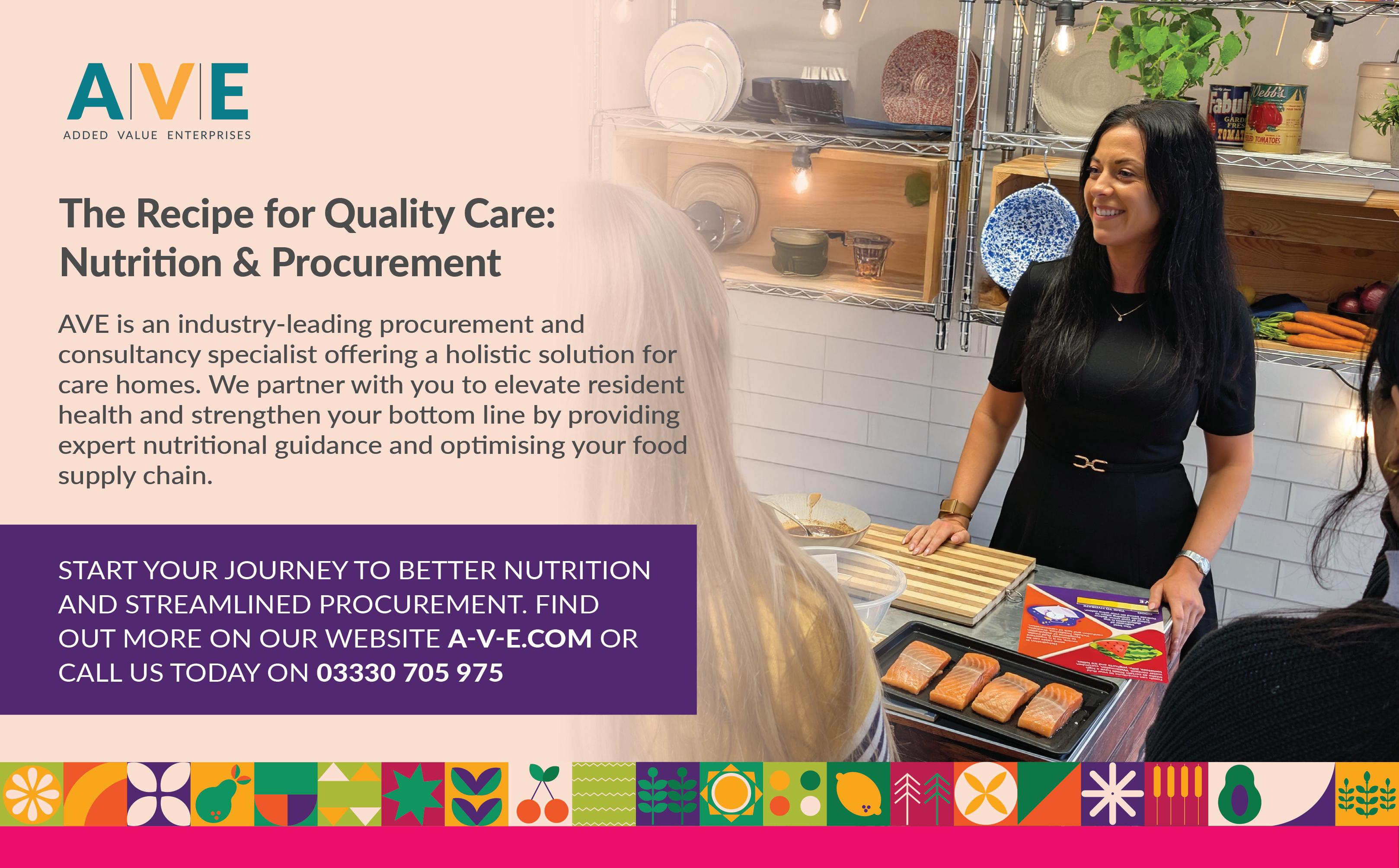
By Gemma Christie, Business Account Manager at Miele

In the care sector, operational decisions carry significant weight. Whilst frontline care rightly takes centre stage, it’s also important to remember that the kitchen plays a vital role in maintaining hygiene, supporting staff efficiency, and ensuring resident wellbeing. Among the many moving parts of the care home kitchen, dishwashing is often overlooked. This is likely because it operates behind the scenes and isn’t seen as a direct part of resident care, yet it’s a key consideration for care homes looking to provide a safe, smooth service.
With multiple meal services each day, the kitchen is one of the busiest areas in a care home. Relying on manual washing not only slows down operations but also increases the risk of hygiene lapses. That’s why investing in the right dishwashing solution is critical.
For care homes looking for reliability, hygiene assurance and longterm value, commercial solutions are the smart choice. Here are five key reasons why investing in a professional dishwashing solution can make a meaningful difference.
WHY DOMESTIC DISHWASHERS FALL SHORT
It’s not uncommon for care homes to rely on domestic dishwashers, especially when budgets are tight. But these machines are rarely up to the task. Designed for occasional household use, they struggle with the frequency and intensity of care home operations. Over time, this can lead to breakdowns, inconsistent results, and even hygiene risks. Commercial dishwashers, by contrast, are built for durability and performance. They’re tested to withstand thousands of cycles and are engineered to maintain consistent cleaning standards, even under intense pressure. For care homes, this means fewer disruptions, lower
long-term costs, and greater piece of mind.
HYGIENE RESULTS YOU CAN TRUST
It’s no secret that infection control is always a top priority in any care or medical settings, especially with residents that are often more vulnerable to illness, and where outbreaks can have serious consequences. Dishwashing equipment can help to fight against these infections and play a big role in preventing cross contamination. But only if it’s up to the job.
High-performance commercial machines, such as the MasterLine range by Miele Professional offer disinfection-grade wash cycles that eliminate harmful bacteria and pathogens. Some models also feature advanced drying systems that remove the need for manual handling, further reducing the risk of contamination. These features aren’t just nice to have, they’re essential for maintaining compliance and protecting residents.
SPEED AND EFFICIENCY IN THE KITCHEN
Care homes run on tight schedules. Mealtimes are fixed, and delays can have a knock-on effect across the day. That’s why turnaround time is a key consideration when selecting dishwashing equipment.
Modern commercial dishwashers can complete a full cycle in as little as five minutes, ensuring that clean items are always available when needed. This reduces the need for excess crockery and helps staff stay focused on resident care rather than kitchen logistics.
Supporting staff and reducing their workload
The right equipment doesn’t just improve hygiene standards, it also helps to support staff wellbeing. In a sector where recruitment and retention are constantly ongoing challenges, anything that eases the daily workload is a welcome investment.
User-friendly controls, intuitive interfaces, and automated features such as detergent dosing or drying programmes can make a real difference to staff efficiency and satisfaction. When equipment actually works with your team, and not against them, it frees up critical time and energy for what matters most, caring for their residents.
A LONG-TERM INVESTMENT
While the upfront cost of commercial dishwashing equipment may be higher, the long-term benefits are clear. Reduced maintenance,

lower energy and water consumption, and extended service life all contribute to a more sustainable and cost-effective operation. For example, Miele Professional’s MasterLine dishwashers can complete a full cycle in just 5 minutes and use as little as 5.0 litres of water per cycle, depending on the model. Their energy-efficient design helps reduce utility costs while maintaining top-tier hygiene performance. Some dishwasher manufacturers offer extended parts availability and nationwide service networks, ensuring that support is always close at hand. Miele Professional offers spare parts available for up to 15 years after production ends and a UK-wide service network with a 90%+ first visit fix rate meaning that care homes can rely on consistent, expert support when it matters most.
Dishwashing may not be the most visible part of care home life, but it’s one of the most vital. By investing in the right equipment and processes, care homes can enhance hygiene, improve efficiency, and create a safer, smoother environment for both residents and staff.
To explore how Miele Professional's commercial dishwashing solutions can enhance your care home, please visit: https://www.miele.co.uk/p/retirement-care-homes-4053.htm
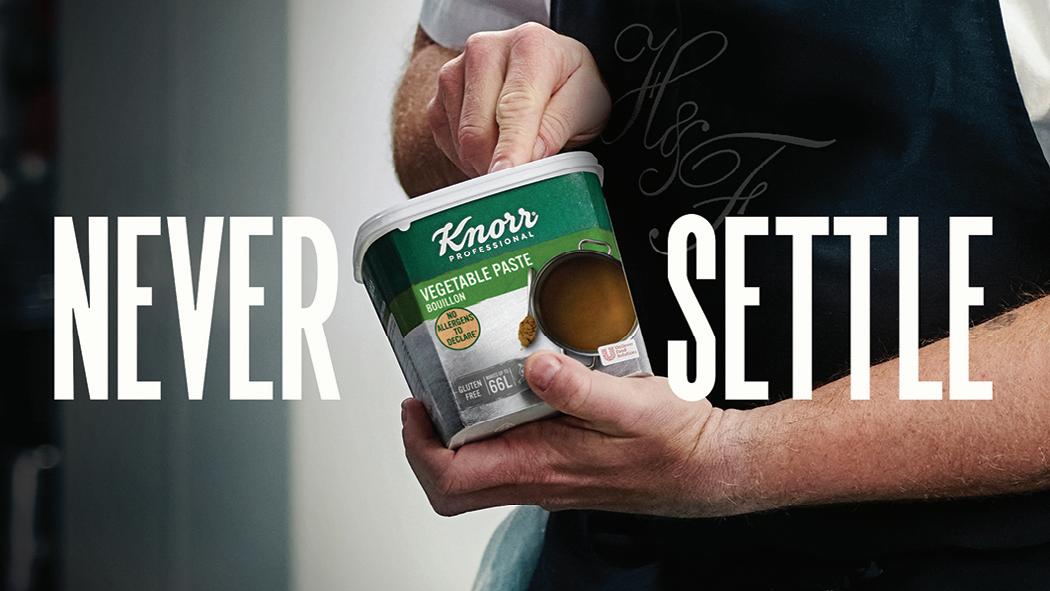
In the care sector, food is more than just nutrition - it’s comfort, dignity, and a way of bringing joy to residents every day. That’s why chefs can’t afford to compromise. From flavour and safety to consistency and versatility, every ingredient has to deliver. When it comes to bouillon, Knorr Professional refuses to settle for anything less than the best and so do the chefs who use it.
Knorr Professional Bouillon is the UK’s number one bouillon brand*, trusted in kitchens nationwide for its rich depth of flavour, outstanding versatility, and chef-trusted consistency. It’s made to work hard in every service, withno allergens to declare¹ options that give chefs peace of mind when catering for residents with diverse needs. NEVER SETTLE FOR BLAND DISHES
As residents age, their sense of taste can diminish. That’s why flavour has to work harder in care - it’s not just about nutrition, it’s about enjoyment. Knorr Professional Paste Bouillon brings bold, balanced flavour that cuts through reduced senses, ensuring dishes remain satisfying and memorable.
Whether it’s used as a base, rub, seasoning, glaze, or marinade, it delivers the same consistent, chef-approved results. From soups and stews to roasted vegetables and marinades, this is one product that performs across the menu - helping chefs adapt quickly without losing quality.
NEVER SETTLE FOR UNCERTAINTY
In care kitchens, allergen safety isn’t negotiable. Theno allergens to declareoptions in Knorr Professional Paste Bouillon make it simple to create inclusive dishes without sacrificing flavour. This helps reduce the risk of cross-contamination and ensures every resident can enjoy the same great taste.
For Knorr Professional Care Ambassador Preston Walker, that confidence is invaluable:
“With ‘no allergens to declare’ options available across the range, Knorr Professional Paste Bouillon is easy to introduce into dishes that need to be suitable for varying needs and preferences,” says Preston. “It gives me peace of mind that I can create flavour-packed dishes for all residents, without excluding anyone due to allergens.”
NEVER SETTLE FOR INCONSISTENCY
Care kitchens can be high-pressure environments, where time is short and the need for consistency is constant. Knorr Professional
Bouillon’s paste format makes it easy to store, measure, and use, ensuring the same flavour profile in every batch. Its consistent yield also helps with budget control - delivering premium quality without waste.
Preston sums it up simply:

“We use the Knorr Professional Bouillon paste range for one simple reason - it delivers. Quality, flavour, consistency, and the confidence of knowing exactly what you’re going to get, every time.”
NEVER SETTLE FOR SECOND BEST
Every plate in a care home matters. It’s an opportunity to provide comfort, joy, and nourishment - and that means every ingredient has to earn its place. With Knorr Professional Bouillon, chefs can be sure they’re serving the very best in flavour, safety, and reliability. Because when it comes to care catering, settling for less is never an option.
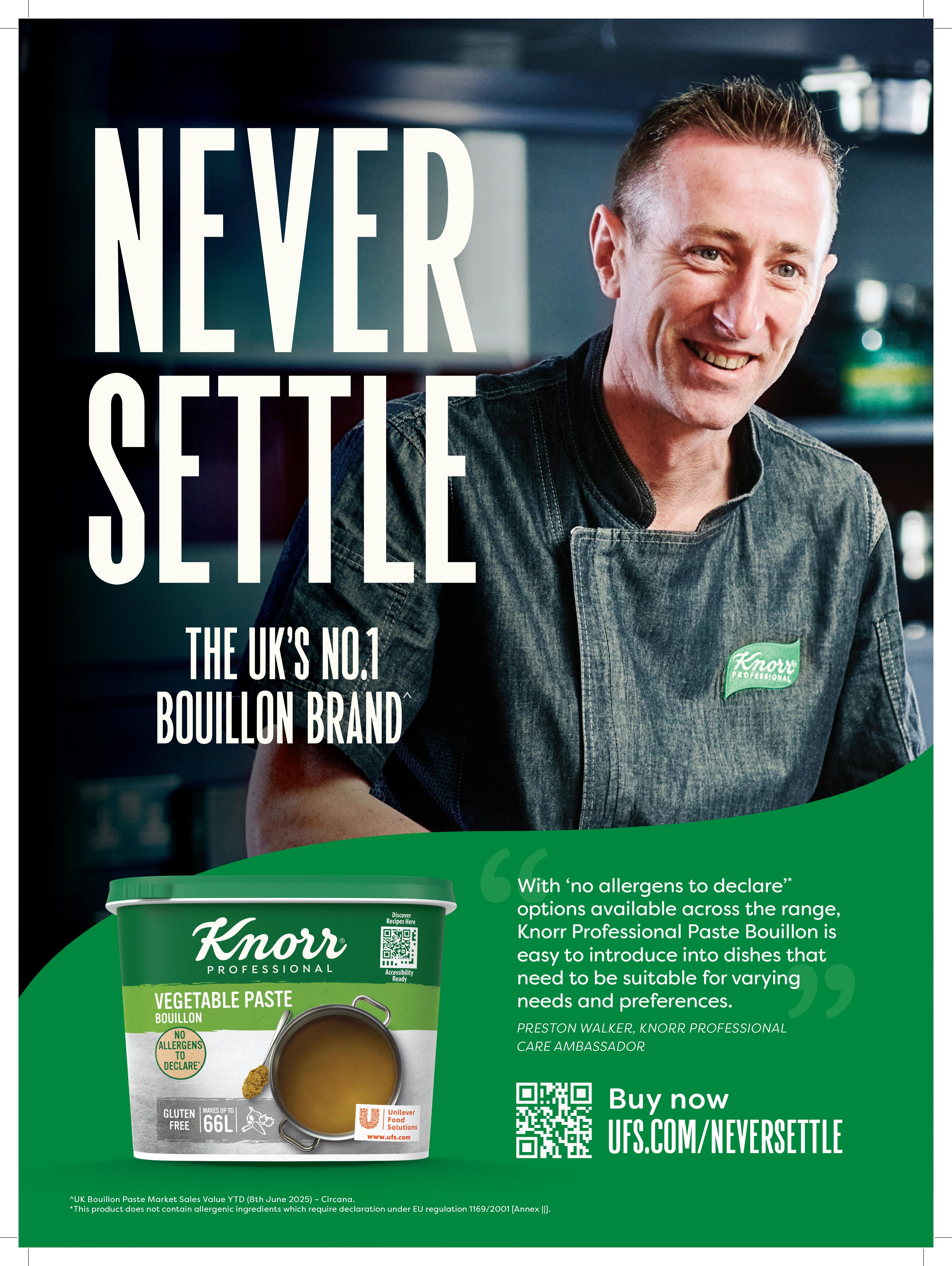
Care home budgets are under mounting pressure. Food supply constraints, inflation, and rising labour costs are combining to create a perfect storm for operators already working to tight margins.
The British Retail Consortium’s latest survey paints a concerning picture: 85% of retailers have raised prices in response to increased costs, fuelled by rises in employer National Insurance contributions and the National Living Wage. In the catering sector, which is heavily dependent on lower-wage roles, these changes are having a pronounced impact.
The Office for National Statistics’ July CPI figures show food inflation at 4.9%, with forecasts suggesting this could reach 6% by the end of the year. According to food procurement expert allmanhall’s Managing Director, Oliver Hall says:
“Based on recent and forecasted inflation spikes, care groups may want to revisit what they have budgeted for annual food inflation for the coming months. allmanhall consistently outperform inflation with price rises lower than inflationary rates, ensuring every pound of catering spend goes as far as possible.”.

Global factors are adding further uncertainty. Extreme weather patterns are disrupting crop yields and threatening food supply chains. The resulting price volatility is not limited to raw ingredients - distribution, packaging, and processing costs are also climbing.
Faced with these pressures, some care providers may be considering outsourcing catering as a cost-saving measure. However, as Oliver cautions:
“Pause before you add a management fee on top of rising labour costs on someone else’s payroll.”
Just because you eat less, or eat differently, it doesn't mean you should settle for less.
At Food Untethered, we believe that everyone – regardless of how they eat –deserves access to real, organic, and nourishing food. Whether you are tubefed, or simply need liquid nutrition on the go, our meals are made with care, using nothing artificial and held to the highest of safety standards.
We’ve launched our first three meals: a Coconut & Banana Smoothie, a Carrot & Coriander Soup, and a Mexican Bean Stew. Each is packed with whole ingredients, made for both taste and tolerance, and suitable for use orally or via a feeding tube.
But this is just the beginning. Over the next year, we’re releasing a full range of meals that can be consumed hot or cold, snacks, smoothies, and drinks –designed with real people, real needs, and real lives in mind.
Instead, the focus should be on smarter procurement strategies that deliver sustainable, long-term cost control.
Taylor & Taylor Care provide a strong example. Partnering with allmanhall, they benefit from comprehensive supply chain management, proactive supplier negotiations, and regular consultative advice - all designed to keep costs down without compromising quality.
“From day one, the care and attention provided by allmanhall has been exceptional… I’ve been impressed by the savings we’ve already seen, the flexibility regarding suppliers and by the excellent quality.”
Click here for the full video case study:
https://www.youtube.com/watch?v=NkroiOj26fs&t=1s
In today’s climate, expert food supply chain management is more than a support service - it’s a necessity. By tracking every penny of spend, identifying efficiencies, negotiating competitive pricing, and managing suppliers, care homes can protect their budgets while maintaining quality for residents.
As Oliver concludes:
“The effects of Government policy will likely be felt in the form of higher food prices in the coming years... choices made today will play a pivotal role in shaping the future of food security”.
With the right partner, care groups can ensure good food remains affordable, responsible, and sustainable - because quality meals for residents shouldn’t cost the Earth.
See the advert on the facing page for more information.


Our food is safe, shelf-stable, recyclable, and above all, human. It's not synthetic formula. It's not baby food. It’s real food, reimagined for different appetites.
If you or someone you care for lives with dysphagia, is tube-fed, or simply needs an easier way to stay nourished, we’re here to help.
Call us today – we’re a small team, and we love to talk. Whether you’re new to this or a seasoned pro, we’ll help you find something that works.
You don’t need to compromise.
You just need food that works for you.
Food Untethered
Real food. For every way of eating. www.fooduntethered.com
Please see our advert below.

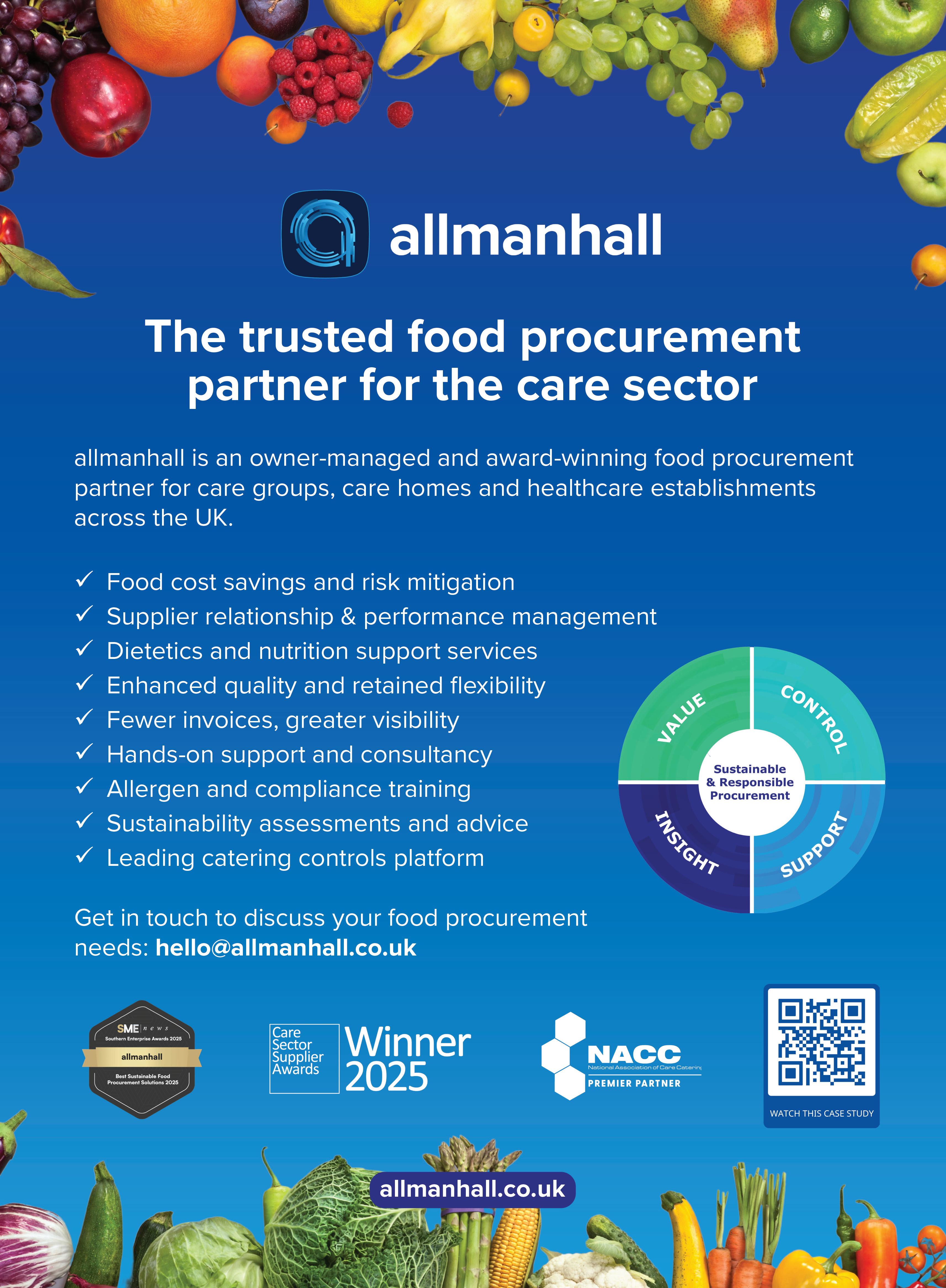
Managing laundry in residential care and nursing homes presents unique challenges that go far beyond a typical household wash. With infection control protocols, personalised clothing care, and the sheer volume of linens and garments to process daily, choosing the right laundry solution is crucial for both operational efficiency and resident wellbeing.
Care homes typically process between 1-1.5kg of laundry per resident per day – including personal clothing, bed linen, towels, and communal textiles. For a 40-bed facility, that's approximately 2,800kg of laundry each week. This volume demands robust systems that can maintain hygiene standards whilst being kind to delicate fabrics and ensuring residents' personal items don't go astray.
In-House vs Commercial Laundry Services
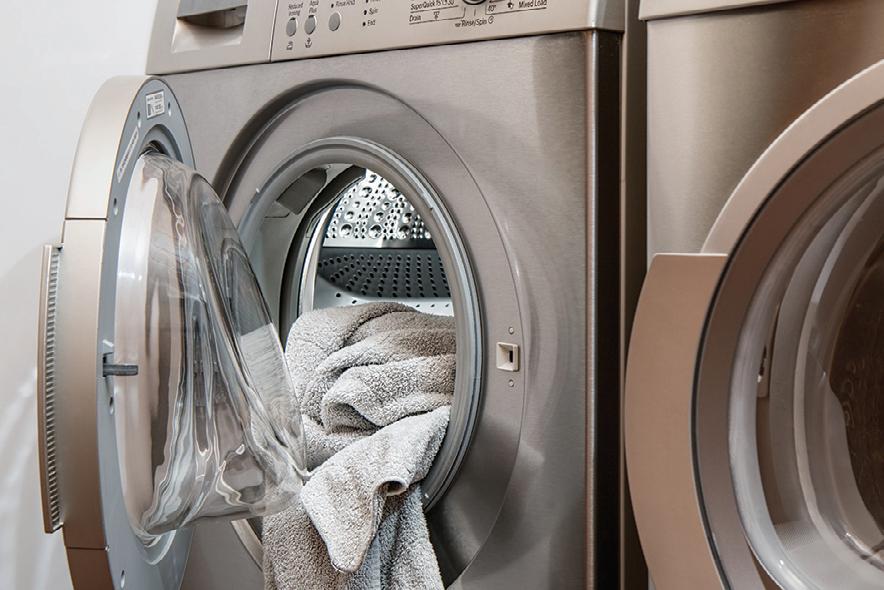
Many care homes face the fundamental decision between managing laundry on-site or outsourcing to a commercial service. In-house laundry offers greater control, faster turnaround times, and can be more cost-effective for larger facilities. It also allows staff to respond quickly to accidents or spillages – a common occurrence in care settings.
However, commercial laundry services bring industrial-grade equipment, specialist infection control processes, and can free up valuable staff time. They're particularly attractive for smaller homes where the capital investment in commercial machines may be prohibitive.
The Care Quality Commission emphasises that laundry procedures must effectively prevent cross-contamination. Modern barrier washers, which separate 'dirty' and 'clean' sides, are increasingly becoming the standard in care homes. Thermal disinfection – washing at 65°C for at least 10 minutes or 71°C for at least 3 minutes – remains the gold standard for destroying pathogens.
Water-saving technologies have improved dramatically, with modern machines using 40% less water than older models whilst maintaining infection control standards. This not only reduces environmental impact but also cuts utility costs significantly.
PROTECTING RESIDENTS' DIGNITY
Personal clothing forms an important part of residents' identity and dignity. A good laundry solution must include robust tracking systems –whether through sewn-in labels, heat-seal tags, or RFID technology – to ensure Mrs Johnson's favourite cardigan doesn't end up in Mr Patel's wardrobe.
Some homes are now investing in smaller, dedicated machines for delicate items, allowing woolens and special garments to receive appropriate care rather than being hand-washed or sent home to families.
Your laundry solution should support, not burden, your care staff. Ergonomic equipment placement, clear workflow design, and adequate training reduce physical strain and processing time. Some modern systems include automated folding or pressing equipment, which can significantly reduce labour costs and repetitive strain injuries.
As the sector continues to professionalise, laundry management increasingly reflects a care home's overall standards. Whether you opt for an on-site facility or outsourced service, the key is ensuring your solution meets infection control requirements, protects residents' belongings, and integrates smoothly into your daily operations.
The right laundry system isn't just about clean clothes – it's about maintaining the dignity, health, and comfort of those in your care.

For over 60 years, Fowler UK has been proud to support the care sector with dependable commercial laundry and catering equipment, backed by expert service that puts people first. As a family-run business, we understand the pressures care providers face, and we’re committed to delivering solutions that keep vital operations running smoothly.
From supply and installation of equipment, ongoing servicing and repairs, detergent packages, right through to our in-house CAD design team, we offer a ‘one-stop-shop’ solution for all of our clients laundry and kitchen facilities.
Reliability and customer service the heart of what we do. Our fast response times and high first-time fix rate mean care providers can trust us to minimise downtime and keep essential services running without
interruption. By stocking a vast range of manufacturer parts on our vans and in-house, we’re able to resolve issues quickly and effectively.
Beyond equipment sales, we support care facilities with comprehensive compliance and maintenance services such as gas safety inspections, preventative maintenance visits, duct cleaning and kitchen deep cleaning. This all-in-one approach provides peace of mind for our customers, ensuring they can focus on delivering high standards of care while we take care of the rest.
“Supporting the care sector has always been central to our business,” said William Fowler, Director at Fowler UK. “We know how important reliable equipment is for both residents and staff, and we’re proud to play our part in helping care homes provide safe, efficient, and welcoming environments.”
With a proven track record, family values, and a commitment to service, Fowler UK remains a trusted partner for care providers nationwide.
We’d be delighted to discuss how Fowler UK can support your facility.
See the advert on this page for further information.


Infection control remains a vital concern in care homes, where laundry plays an essential role in preventing the spread of harmful pathogens. With the Care Quality Commission continuing to raise expectations through a more rigorous inspection framework, laundry operations must meet high standards for both hygiene and regulatory compliance. Forbes Professional is helping care providers across the UK achieve exactly that.
Many care homes still rely on domestic washing machines that are ill-suited for the demands of a clinical environment. These machines often lack the ability to maintain the thermal disinfection temperatures required in care settings and are not compliant with WRAS Category 5 regulations. In addition, domestic models are not built for the volume of laundry processed in care homes, leading to higher operational costs, increased breakdowns, and invalidated warranties.
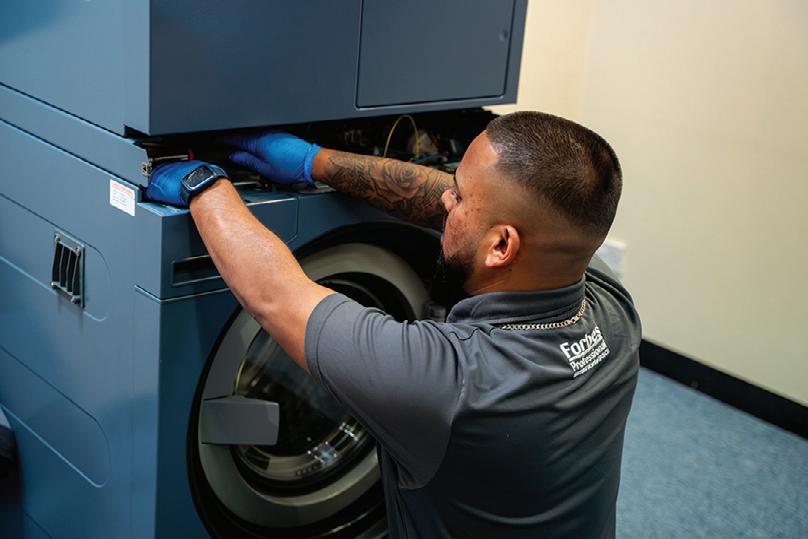
Forbes Professional supplies Miele commercial laundry equipment that is purpose-built for healthcare environments. These machines offer validated thermal disinfection cycles and include Type A air gaps for full WRAS compliance. Forbes also offers high-performance detergents which can be used in conjunction with the Miele appliances to deliver a comprehensive solution that supports effective infection control even at lower temperatures.
Some care operators have explored ozone-based disinfection as an alternative. While ozone can be effective, it introduces additional responsibilities around safe use and regulatory compliance. Systems must be carefully managed to mitigate potential risks to staff and residents. Forbes offers tried-and-tested alternatives that eliminate complexity while delivering proven results in a care environment. A major differentiator for Forbes is the company’s nationwide service infrastructure. They understand that equipment failure in a care home laundry room can quickly escalate into a serious operational issue. To minimise disruption, Forbes provides same- or next-day engineer call-outs as standard. Their extensive team of qualified field engineers and well-stocked service vehicles ensures swift, expert support across the UK.
Forbes also offers comprehensive rental and service contracts that include all maintenance and repairs, helping care homes manage costs and reduce administrative burden. These end-to-end solutions provide care operators with peace of mind, knowing their laundry systems are compliant, efficient, and fully supported. By partnering with Forbes, care homes benefit from expert guidance, market-leading equipment, and dependable service; ensuring hygiene standards are met and residents are protected. forbespro.co.uk | info@forbes-professional.co.uk | 0345 070 2335
SOUTHERN Contracts is one of the UK’s leading suppliers of industrial laundry, catering and commercial cleaning equipment.
Founded in 1964 to initially supply and maintain commercial cleaning equipment to the marine industry, we have since grown to become a well-respected and trusted partner to leading manufacturers.
We have consistently been the top performing Laundry Partner to Electrolux Professional and again achieved their top Laundry Partner Award for 2024. We’ve now won this accolade consistently for well over 20 years.

Now in our third generation and still very much a family run business, we are proud to now be a global supplier of not only laundry equipment, but with knowledge gleaned over the years, we are also a go-to company for professional kitchen appliances and commercial cleaning equipment. With our knowledge of most market products, we pride ourselves on delivering the very best solutions and service to our customers.
Already working for many of the national Care and Nursing Homes, as well as the hospitality industry such as hotels, restaurants and holiday parks, we understand the importance of keeping ‘down time’ to a minimum and by keeping in stock the leading commercial washing machines, tumble dryers and cleaning equipment we can sometimes just swap machines over to keep your business up and running.
We are able to offer independent and unbiased advice to ensure your purchase precisely meets your
requirements and budget, across a complete array of different products and models. Our expert team of technical staff are on hand to ensure your business is supported through every aspect of your purchase or rental agreement.
From advising on current government standards (eg. infection control for commercial washing machines and meeting government legislation for kitchen appliances) our team fully support you throughout the whole journey, from initial advice to delivery, installation, customer training, ongoing maintenance, service and repair. We hold many accreditations for safety and service excellence, providing peace of mind to all our customers, whether existing or potential.
For more information regarding our services for :
- Commercial laundry equipment
- Commercial kitchen appliances and warewashing/dishwashing
- Commercial cleaning equipment
Please visit our website at southerncontracts.co.uk and see previous projects we’ve worked on and our enviable testimonials received from happy clients across a plethora of sectors.
Contact us now on 03301 222888
Follow us on : Facebook, Twitter, Instagram and LinkedIn
See the advert on the previous page for information.
At PDS, we understand the challenges that come with managing laundry in a care home. From bedding, towels and tablecloths, to cleaning the clothes of residents, we appreciate that you need a care home laundry repair service and care home laundry equipment you can rely on.
Here at PDS, we provide care home laundry equipment to suit the needs of your setting. We offer many big-name industrial brands such as Alliance, Electrolux, Miele, Girbau, Grandimpianti and Schulthess.
As your trusted care home laundry repair services partner, we can help you with more than just supplying equipment. Our care home laundry services include laundry consultations, project design and management, equipment supply and installation, spare parts and more.
Our care home washing machines range from 6kg to 30kg drums for small to medium-sized care settings, and from 26kg to 40kg ones for larger care homes with more demanding laundry needs. We offer a full range of care home laundry equipment to meet your needs. Our equipment includes:
• Washing machines
• Tumble dryers
• Stacked equipment
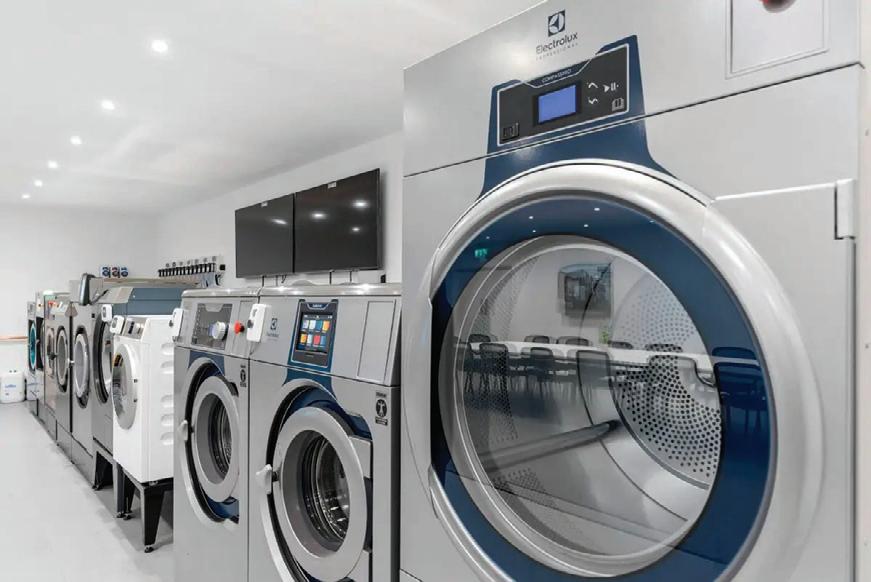
• Ironers We supply everything from compact care home washing machines to larger ironers and stacked systems, tailored to suit your available space, daily routines and laundry demands. Our aim is to make laundry simple and efficient, so your team can focus on providing the best care for your service users.
With more than 30 years of experience, our in-house engineers offer expert support nationwide. Wherever you’re based, we’re here to keep your laundry equipment performing at its best.
If you run or manage a care home and are looking for a care home laundry repair services partner, then look no further than PDS. We’ve been helping care homes just like yours since 2007 and are one of the most trusted suppliers of care home laundry repairs and care home laundry equipment. We are here to help keep your care home running smoothly. Please get in
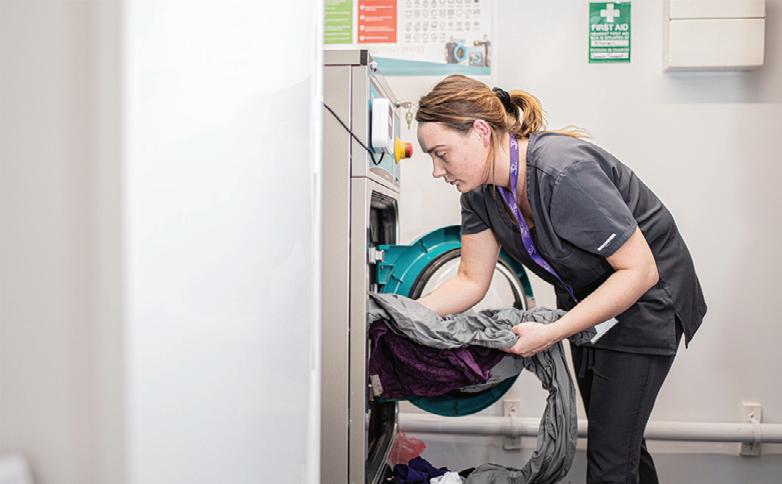

We

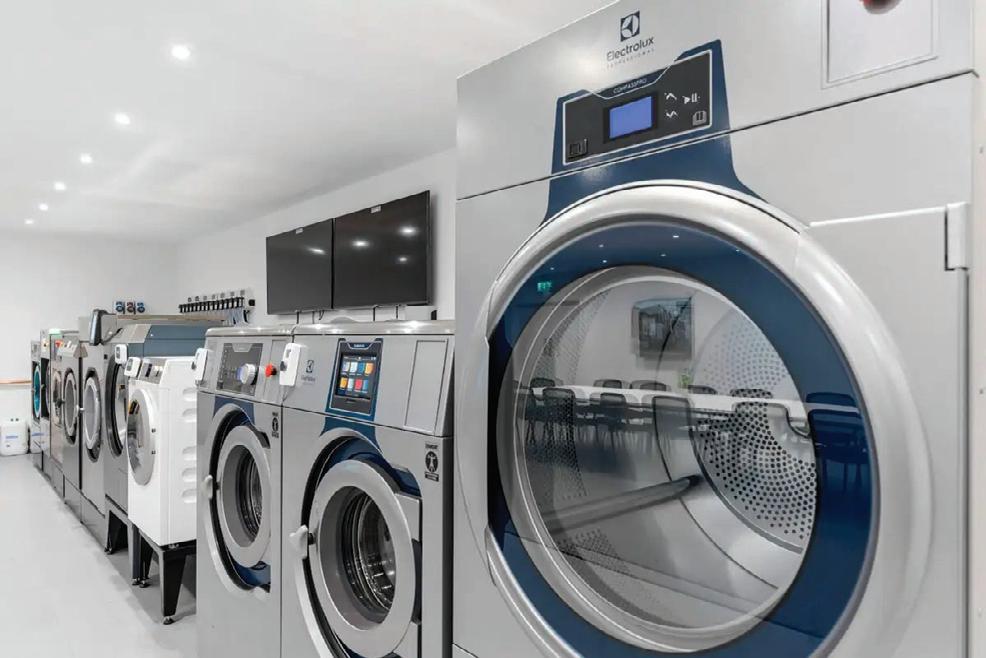
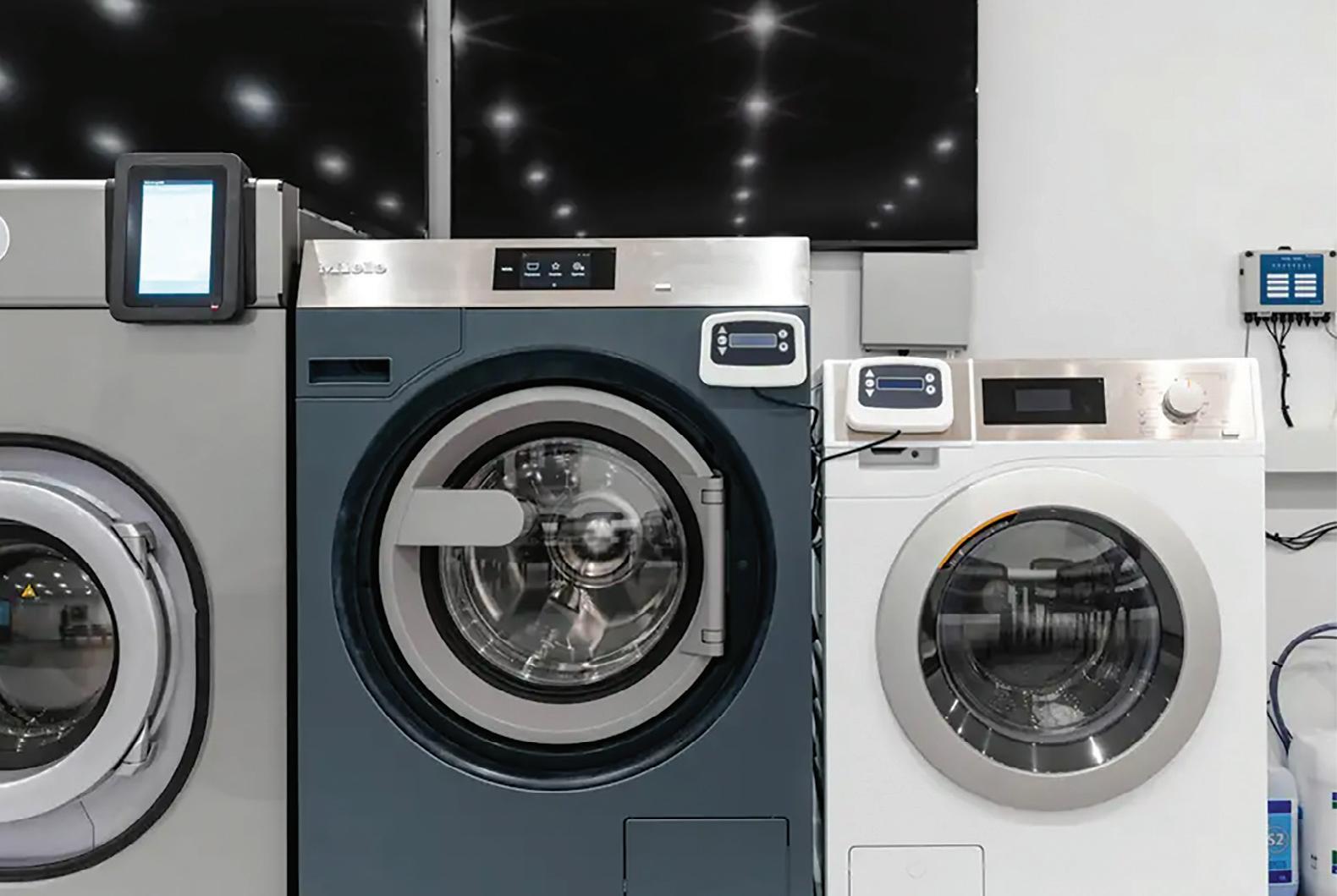

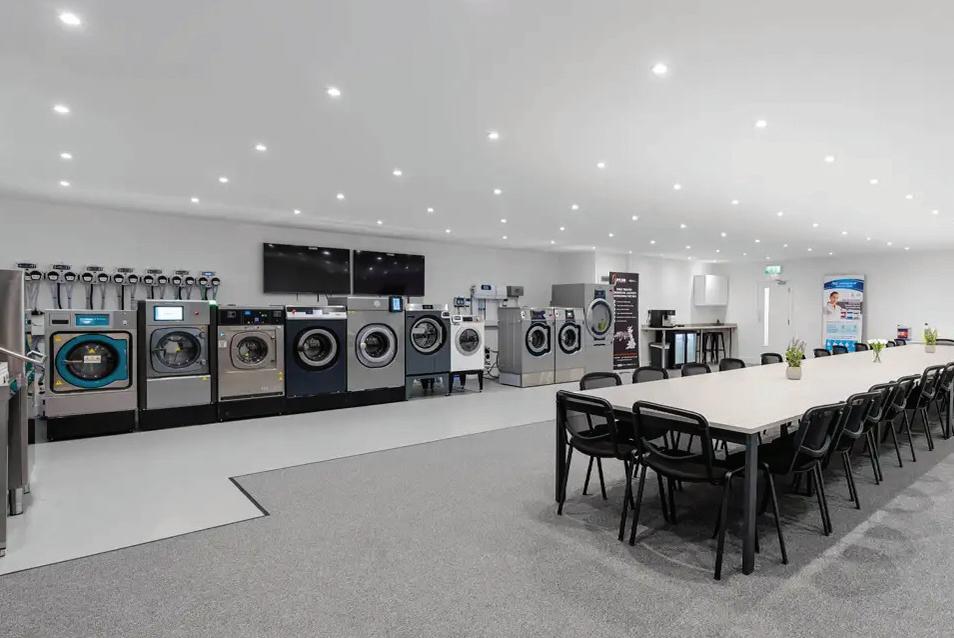

•
•


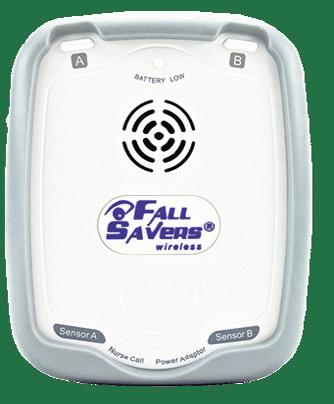
Eliminate all
with our new generation falls management solutions! Upgrade your falls programme with the latest technology from Fall Savers®. The NEW Fall Savers® Wireless eliminates the cord between the monitor and sensor pad. This results in less work for nursing staff, improved safety for patients and reduced wear and tear on sensor pads. Wireless advantages include the ability to use one monitor with two sensor pads simultaneously and support for many new wireless devices.
FEATURES

BENEFITS INCLUDE:
for patients; less work for staff Bed and chair pads available One monitor works with two sensor
Smart Notes helps you create accurate, detailed notes, using AI to write up forms in moments and and deliver them directly into Access Care Planning. That means less time writing, and more time with the people who matter most.
Access Smart Notes key features and benefits:
• Save thousands of pounds every year on Care Assessments without a drop in quality.
• Capture detailed notes quickly and effi-

ciently in the moment.
• Reduce errors and missed details with templates customised to your service
• Integrated with Access Care Planning for real-time updates saving hours of admin time.
• Built-in AI accuracy to streamline the documentation process to reduce risks and improve the quality of your notes
• Full audit trail for peace of mind and transparency
Visit www.theaccessgroup.com

Falls are a significant concern for vulnerable individuals, especially seniors and patients at risk. Medpage, a leader in assistive technology, offers a range of cuttingedge products designed to enhance safety and provide peace of mind for caregivers and families. Here’s an in-depth look at some of their standout solutions: MPRCG1 (2023) BED LEAVING DETECTION ALARM WITH CAREGIVER RADIO PAGER
The MPRCG1 is a comprehensive system tailored for fall prevention in domestic, commercial, and NHS care settings. This all-inclusive kit includes a bed pressure mat sensor, a BTX21-MP alarm sensor transmitter, and an MP-PAG31 radio pager. The system is designed to alert caregivers when a patient leaves their bed, reducing the risk of falls. Key features include:
Wireless Alerts: Notifications are sent to the caregiver’s pager via tone or vibration.
• Customizable Alarm Delays: Options for instant, 15-minute, or 30-minute delays. Durable Design: Antimicrobial and disinfectant-resistant materials ensure longevity.
• Ease of Use: Minimal installation required, making it user-friendly and portable.
HDKMB2 HOSPITAL DISCHARGE KIT FOR FALLS RISK PATIENTS
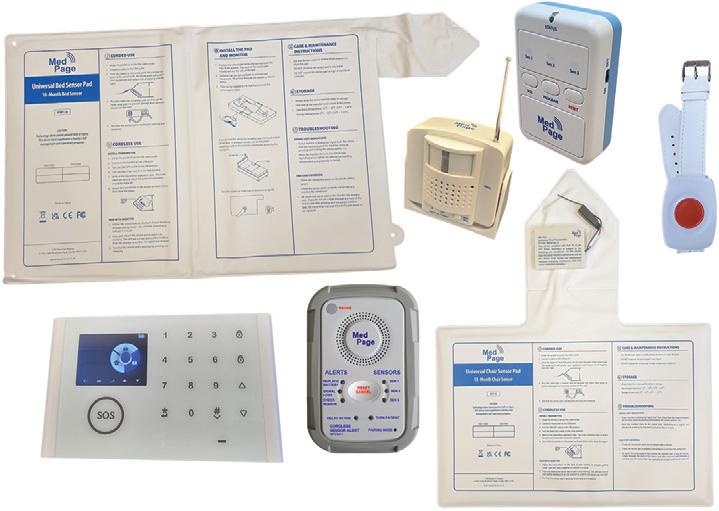
The HDKMB2 is a thoughtfully curated kit aimed at supporting patients transitioning from hospital to home care. It includes essential tools to mitigate fall risks and promote recovery. This kit is ideal for caregivers seeking a comprehensive solution to enhance patient safety during the critical post-discharge period.
MULTI-PORT WIRELESS SENSOR INPUT EXPANDER FOR NURSE CALL CONNECTION
CMEX-21
The CMEX-21 is Medpage’s latest innovation, designed to integrate seamlessly with existing nurse call systems. This multi-port expander allows for the connection of multiple wireless sensors, enhancing the
monitoring capabilities of healthcare facilities. Its versatility makes it a valuable addition to any care environment, ensuring timely responses to patient needs.
RON-WC2 WATERPROOF DISABLED PULL CORD ALARM TRANSMITTER WITH WIRELESS ALARM RECEIVER
The RON-WC2 is a robust solution for disabled individuals requiring immediate assistance. This waterproof pull cord alarm is ideal for use in bathrooms and other high-risk areas. Paired with a wireless alarm receiver, it ensures that help is just a pull away. Features include:
Waterproof Design: Suitable for wet environments.
• Wireless Connectivity: Reliable transmission to the alarm receiver. Ease of Installation: Simple setup for quick deployment. WHY CHOOSE MEDPAGE?
Medpage’s commitment to innovation and quality is evident in their product range. Each solution is designed with the user’s safety and convenience in mind, making them a trusted choice for caregivers and healthcare providers alike.
By investing in these advanced fall prevention tools, families and facilities can create safer environments for those at risk. Medpage continues to lead the way in providing practical, reliable solutions that make a real difference.
For more information, visit Medpage’s official website or contact their team to explore these products further. Safety starts with the right tools, and Medpage delivers just that. www.easylinkuk.co.uk
T: 01536 264 869
Courtney Thorne, a long-standing innovator in healthcare communication systems, is setting new standards in the care home sector with its advanced wireless nurse call technology—designed to improve resident safety, enhance staff efficiency, and support a more responsive care environment.
With over 30 years of experience serving the UK healthcare market, Courtney Thorne’s systems are now trusted by thousands of care homes nationwide. Unlike traditional hardwired solutions, their wireless nurse call systems offer non-invasive installation, scalability, and smart analytics—making them ideal for both new builds and retrofit projects.
“At the heart of our technology is the belief that better communication leads to better care,” says Graham Vickrage, Managing Director at Courtney Thorne. “Our wireless systems not only reduce response times but also empower staff
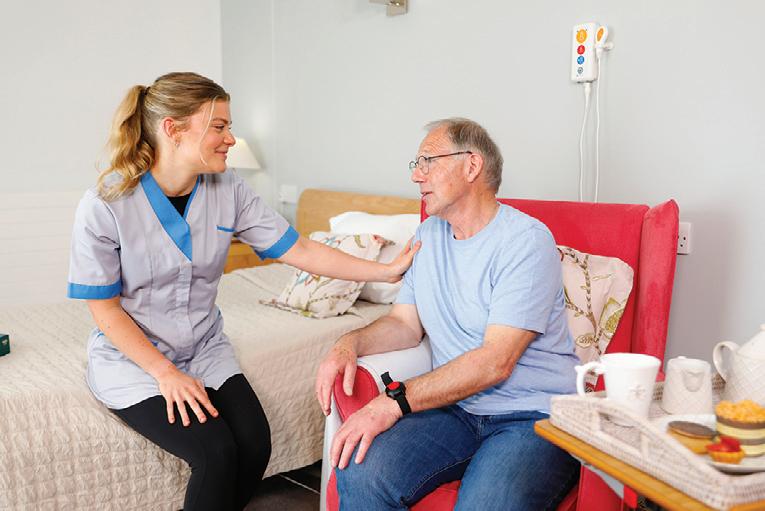
with the tools they need to deliver safe, person-centred care.”
Care providers are increasingly choosing wireless systems for their flexibility, reliability, and cost-effectiveness. With a full suite of accessories—including neck pendants, door monitors, fall detection, and bed sensors—Courtney Thorne systems can be tailored to meet the specific needs of each home and resident.
In an industry where compliance, safety, and staff pressures are always front of mind, Courtney Thorne provides more than just products—they offer ongoing support, training, and a commitment to innovation that helps care homes futureproof their operations.
For more information or to book a free demo, visit www.c-t.co.uk or contact info@c-t.co.uk.
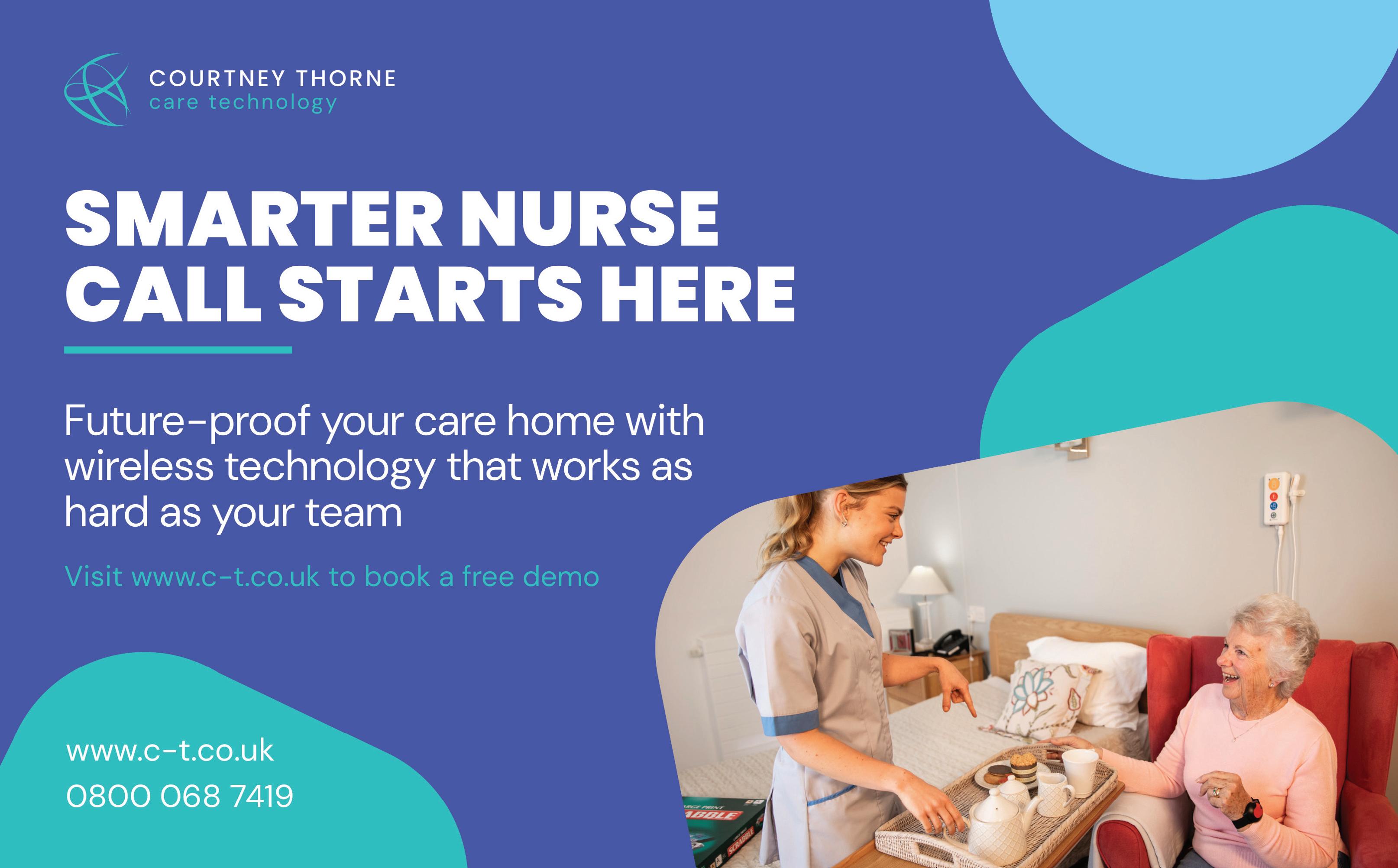
Care homes across the UK are transforming how they deliver care thanks to SyndoraAlto, the newly rebranded name behind CHARIS, the UK’s most advanced digital nurse call system.
Fully supplied, installed, and maintained from just £6.40 per bed, per month, CHARIS delivers smarter, safer, and more connected care through real-time alerts, mobile integration, and intuitive smart displays that help staff respond faster when residents need them most.
Every CHARIS system comes fully inclusive with 15” smart displays, help buttons, pull cords, guaranteed radio coverage, and 24/7 UK technical support, all backed by SyndoraAlto’s trusted installation and maintenance team.

For care providers not yet ready to replace their existing nurse call system, AltoEnhance offers the perfect first step into digital care.
Available from just £129.00 per month, AltoEnhance seamlessly connects to your current nurse call system, bringing digital reporting, mobile alerts, and actionable insights without the need for a full system upgrade.
“Technology should make care easier, not harder,” says Louis Johnson, Managing Director. “CHARIS and AltoEnhance connect people, information, and action empowering care teams to deliver truly person-centred care.”

�� Meet the team & learn more at www.syndoraalto.com
Alarm Radio Monitoring is the market leader in the design, manufacture and installation of bespoke, end-to-end, wireless alarm systems and solutions for the healthcare, leisure, custodial and education industries.
We have been providing wireless alarm and nurse call systems for over 30 years. Supplying care homes and hospitals with an essential lifeline that supports the delivery of outstanding care.
We believe in excellence which translates into:
Advanced Technology
Industry-leading wireless alarm technologies and software
Bespoke Solutions
We design systems to your needs rather than your team having to work around the system Innovative Design

Pushing boundaries with the reliability that comes from decades in the industry Flexible Finance Options
Ensuring organisations of any size can provide safety for their staff and clients
24 Hours a Day, 365 Days a Year Service
Your ARM service team is on hand, on the phone, on-site or return to base, whether you have a service contract or not
For further information, see the advert below or visit www.arm.uk.com
Croner-i was founded in 2017 as a proud part of the Peninsula Group. Since its beginning, it has supported thousands of care providers across the UK to stay compliant with Care Quality Commission (CQC) requirements and wider regulatory obligations, setting a standard in the industry.
Through their Navigate-Care platform, Croner-i specialises in providing practical, accessible and easy-to-understand guidance that enables care services to exceed their compliance responsibilities. From residential care homes, and domiciliary care agencies to supported living providers and other care services, thousands of care providers rely on Croner-i’s resources to maintain quality, safety, and best practice across their operation.

“We understand that compliance can be a challenging and time-consuming process for care providers,” said Andrew Murphy, Head of Content at Croner-i. “Our mission is to take the complexity out of CQC and regulatory requirements, giving providers the clarity and confidence they need to deliver outstanding care.”
With Croner-i’s Navigate-Care platform, care services have access to a comprehensive library of policies,
toolkits, and expert guidance written by industry and care specialists. This includes practical step-by-step advice on preparing for CQC inspections, meeting the new Single Assessment Framework (SAF) and implementing robust quality assurance processes.
Being part of Peninsula Group allows Croner-i to benefit from decades of experience in employment law, HR, and business compliance. This ensures the advice and support given is both legally and operationally practical.
With the care sector under increasing scrutiny and public pressures, Croner-i remains committed to empowering providers with the tools they need most, to operate efficiently, protect service users, achieve inspection success and grow their care service.
Look out for more details from Croner-i in the coming weeks.
For more information about Croner-i Navigate-Care, get in touch with the partnership team at partnerships@croneri.co.uk.
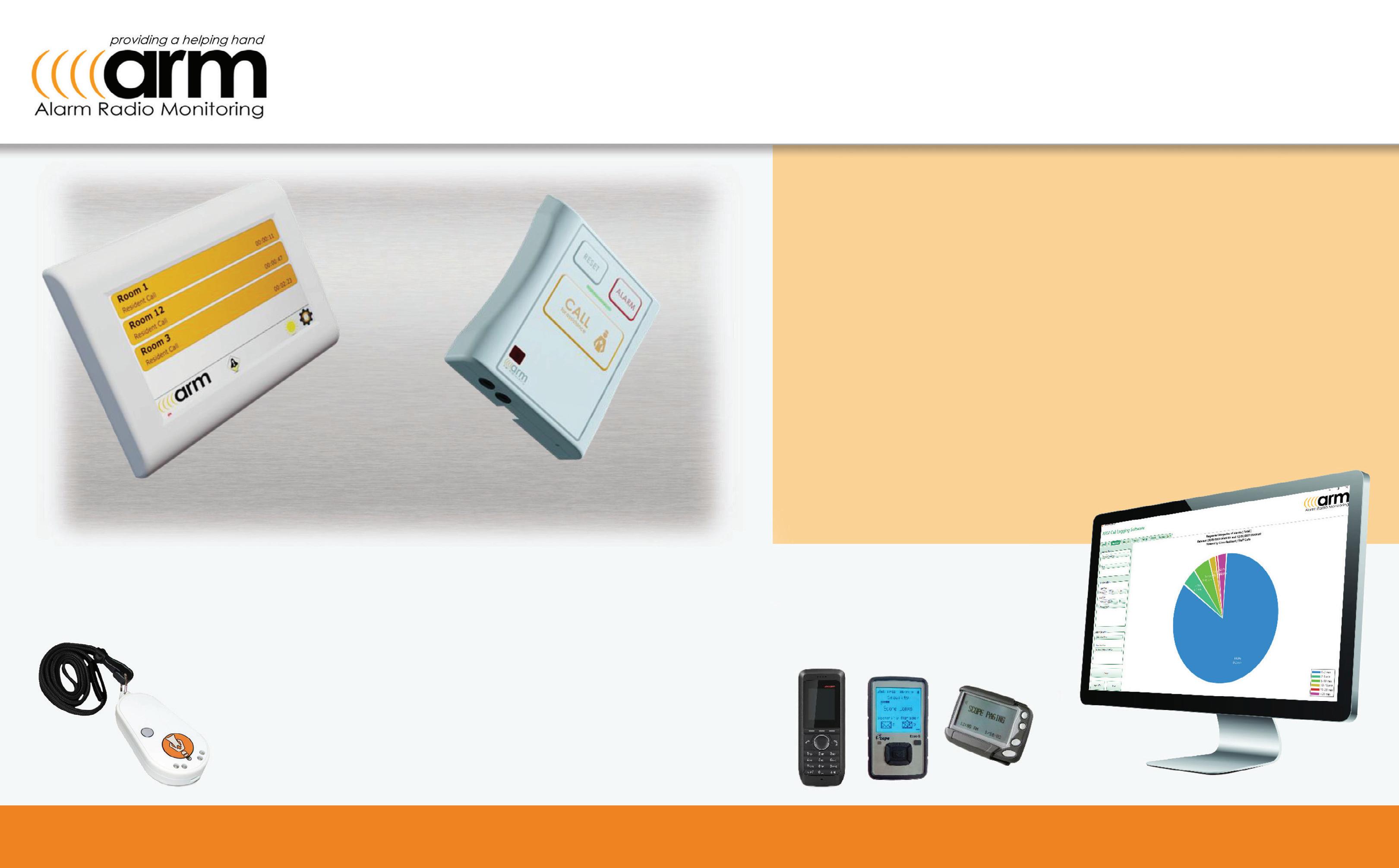
The wireless ARM Nurse Call system has been developed over 30 years with both the client and user in mind.
It enables staff to efficiently answer calls, making the management of resources more flexible and provides the functionality you would expect of any nurse call system.
The system is quick and easy to install and works wirelessly, using radio communication between both the call points and the system infrastructure.
Data Analysis software provides a full audit trail of events
The all-new call logging software from ARM enhances the functionality of your care call system dramatically.
• It can help you track the quality of your service to your residents.
• It can help you demonstrate compliance with your aims and best practices, both to relatives and to authorities.
• It can help you find bottlenecks in service provision, track staffing requirements, and allow you to ensure staff are meeting expectations.
• Most importantly, it provides assurance that you know and can demonstrate what is happening in your care home.
Call messages can be sent direct to staff to speed up response times and can also be integrated to work with smart phones & messaging.
Sensore launches a smart pressure ulcer prevention system, a breakthrough technology combining a smart fabric sensor mat with an intuitive app and powerful AI analytics. Today’s best practice is reactive: manual checks and frequent repositioning. Sensore flips the model - continuously monitoring pressure distribution in real-time and providing simple preventative alerts, so users stay protected while easing the daily vigilance demand on users and carers.

A personal early-warning system that integrates seamlessly into any wheelchair or bed, Sensore is built for elegant simplicity - restoring peace of mind for wheelchair users and supporting higher-quality, more

consistent care. For care providers, Sensore can help standardise prevention workflows and contribute to meaningful cost savings, while building a unique dataset to advance pressure-injury research.
Sensore is supported by clinical experts: "We believe Sensore’s continuous pressure monitoring will have a transformational impact on our ability to prevent and manage pressure ulcers effectively, while driving measurable improvements in patient care quality" - NHS Consultant Clinical Scientist Specialist in Clinical Biomedical Engineering Visit www.sensore.health for more information, to sign up for early access and book a free demo.
Technology has made people more connected with the world around them and the revolution in assistive care devices has made it possible for the elderly to spend their last years in a comfortable and familiar environment. These devices have also made it easier for home carers to provide quality care for their loved ones while managing their own lives. They allow you to care for your elderly whether they are travelling in the city for errands, staying alone at home, or staying in the same home as you. They are also helping nursing homes provide better care for them with discrete monitoring and quick responses to emergencies. If you’re looking for these kinds of assistive care devices for your loved ones or nursing home, Frequency Precision produce some of the best systems available to help you with elderly care
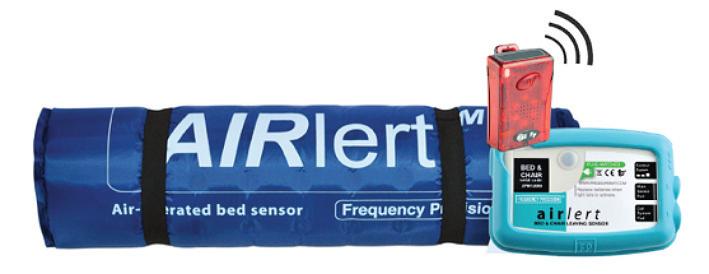
and mobility monitoring, ranging from bed, chair and floor sensor mats through fall monitoring and GPS tracking to fully integrated nurse call plug or wireless systems.
Phone: 01837 810590
Email: contact@frequencyprecision.com
Website: www.frequencyprecision.com


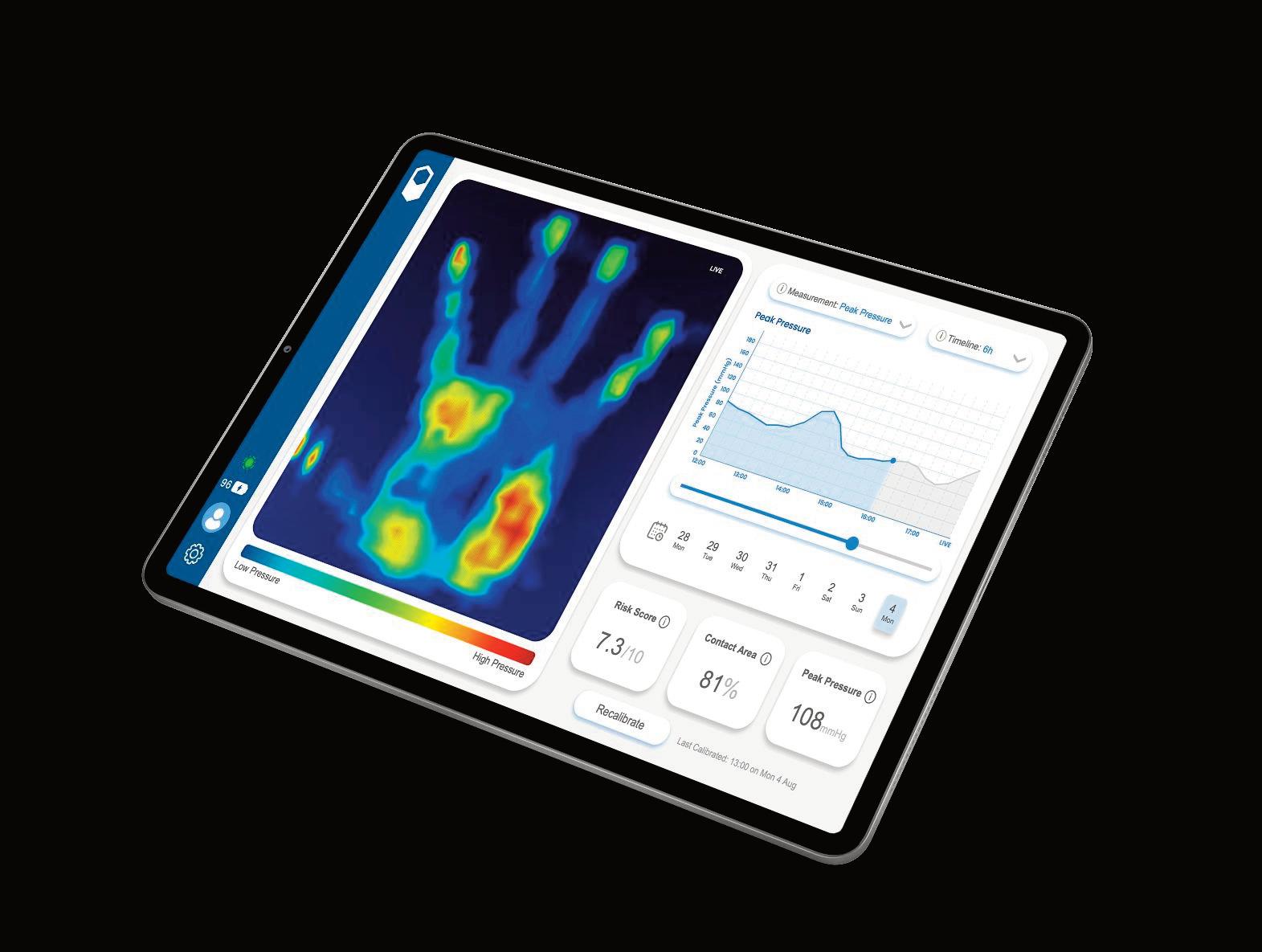
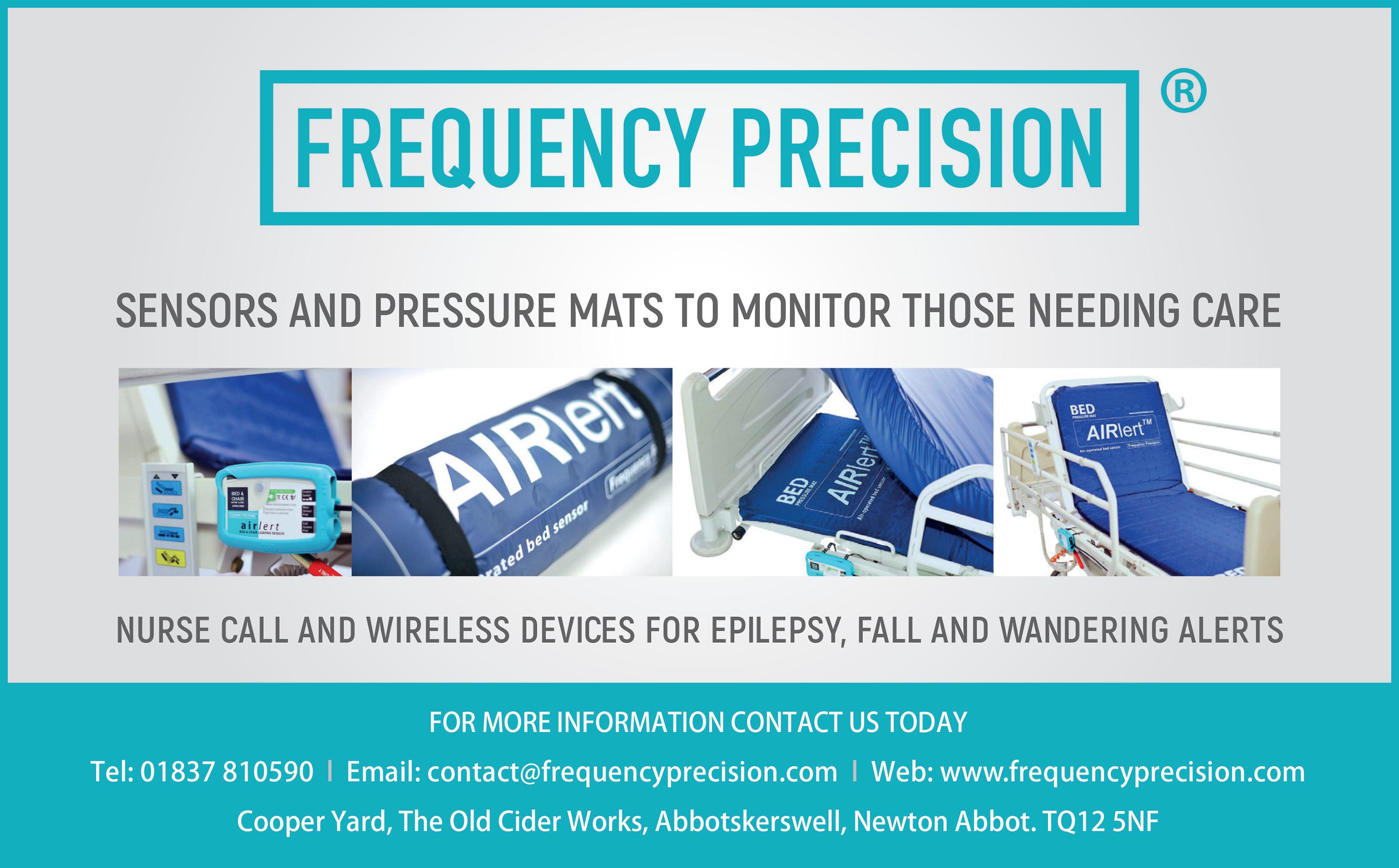
The NHS Long Term Plan is reshaping healthcare to make it more personal, preventative, and accessible. At the heart of this transformation are three strategic shifts: delivering more care in the community, embracing digital solutions, and focusing on prevention rather than treatment. For patients and carers, these changes mean more support at home, fewer hospital visits, and better tools to manage health.
One innovation helping to make this vision a reality is Evondos—an automated medication dispensing service and virtual care platform designed to support safe, timely, and consistent medicine use at home.
SUPPORTING INDEPENDENCE AND SAFETY
Evondos Anna Medicine Dispensing Robot is installed in the patient’s home and dispenses pre-packed doses at the right time. It provides spoken instructions and visual cues, making it easy to use for people of different ages and abilities. If a dose is missed, the medication is stored safely and securely inside the device until a carer or healthcare professional can follow up.
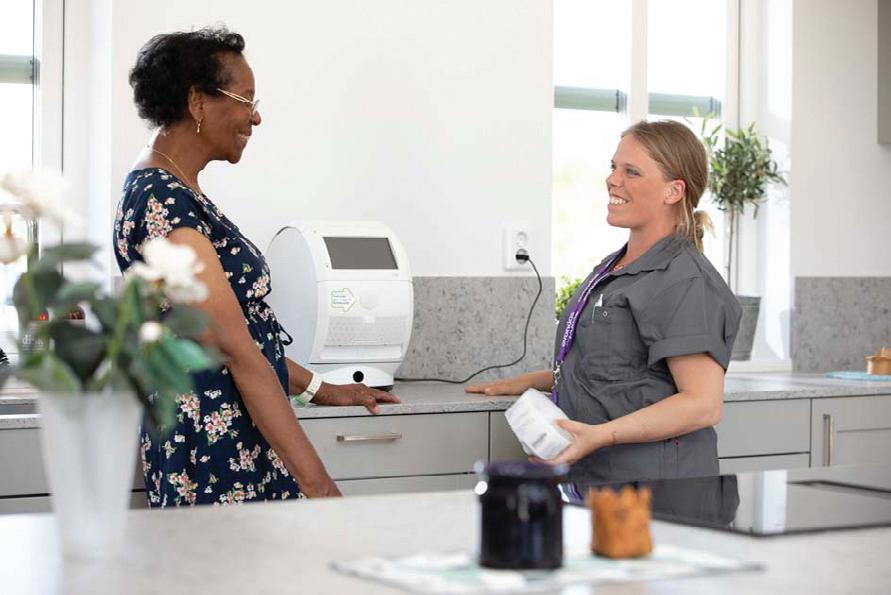
This is especially important for patients with time-sensitive or multi-dose medication schedules, such as those managing diabetes, Parkinson’s, or heart conditions. Evondos ensures that every dose is delivered as prescribed, helping prevent complications and hospital admissions.
PEACE OF MIND FOR CARERS
For carers—whether family members or professionals—Evondos offers reassurance. You don’t need to be present for every dose, and you’ll be notified if a dose is missed. This reduces stress and allows carers to focus on other aspects of support, knowing that medication is being managed reliably.
Evondos also supports virtual care through its built-in two-way video camera, allowing care professionals to check in with patients remotely. This adds a personal touch to digital care and helps maintain strong relationships between patients and their carers.
Evondos includes a built-in roaming cellular SIM card, which means it connects automatically—no home internet or technical setup is required. Patients don’t need to understand or manage any digital connectivity. This makes Evondos accessible to everyone, including those who are not confident with technology or live in areas with limited digital infrastructure.
TRAVEL MODE FOR FLEXIBILITY
Evondos also includes a travel mode, allowing patients to take their medication with them when away from home—whether visiting family, going on holiday, or staying in respite care. This keeps routines consistent and supports independence, even when life changes temporarily.
EQUALITY
Evondos is built with equality at its core. Its intuitive design, secure medication handling, automatic connectivity, and virtual care features make it accessible to people from all backgrounds. Whether you’re living alone, supported by carers, or part of a busy household, Evondos fits into your life and helps you stay well.
CONCLUSION
Evondos supports the NHS’s three strategic shifts by delivering smarter, safer, and more accessible care. For patients, it means more independence and better health. For carers, it means peace of mind and less pressure. With support for complex medication schedules, secure storage, travel flexibility, virtual care, and no need for internet knowledge, Evondos is helping bring the future of healthcare into everyday life.
If you or someone you care for could benefit from help with medication, speak to your local care team about Evondos. It’s a powerful solution designed with real people in mind.
See the advert on the facing page for details.

PASS by everyLIFE Technologies, UK and Ireland’s leading digital care management platform, showcased its award-winning software at this year’s Care Show in Birmingham.
Used by over 1,200 services and supporting more than 85,000 care professionals every day, PASS brings care planning, medication management, rostering and finance together in one simple system. The platform helps providers save time, reduce risk, and improve compliance - giving care teams more time to focus on the people they support.


Visitors to the Care Show will also be able to see PASSgenius™, the suite of AI-powered insights now built directly into the platform. PASSgenius™ analyses care notes and rostering data to highlight risks, changes, and trends that may otherwise be missed. From punctuality dashboards to health note summaries, it turns everyday information into clear, actionable insight.
Robin Batchelor, CEO at everyLIFE Technologies, said: “The Care Show is always a fantastic opportunity to meet providers, share ideas, and demonstrate how digital tools can make a real difference to quality of care.”
For more information, visit www.everylifetechnologies.com.



Every day, care organisations are working tirelessly to deliver essential support in the face of growing needs and rising costs. However, too many providers are stuck balancing tight budgets, having ‘just enough’ to stay afloat. The hard truth is, just enough isn’t enough—not for the providers, not for the employees, and certainly not for the clients who depend on them.
Rising operational costs—from wages and the Fair Pay Agreement to energy bills—compound historic underfunding and financial pressures. And demand for care continues to increase, creating a widening gap that organisations are often forced to fill with limited resources.
Providers then end up in survival mode, unable to invest in improving their services for today and the future.
THE NEED TO RETHINK FINANCIAL STABILITY
Care providers need to have healthy finances in social care, and that doesn’t come at odds with delivering compassionate care.
A financially strong organisation has the breathing room to improve services, retain employees, and innovate to make a meaningful difference to the lives of people they support. And having this financial security means providers can actually plan for the future rather than constantly reacting to the present.
BENEATH THE SURFACE
Social care organisations face a web of financial intricacies. Local authority

how financial pressures continue to challenge social care providers.
support often comes with layers of red tape. Managing aged debt and resolving invoicing errors take a significant amount of time that few organisations can spare. Regulation and compliance require meticulous reporting, and the sheer volume of admin work to manage all these leaves teams stretched thin. At the same time, there’s an expectation for providers to keep doing more. But without the right tools and systems in place, these compounded financial struggles threaten to overwhelm this indispensable sector.
Social care providers aren’t just keeping their organisations alive; they’re safeguarding the wellbeing of countless individuals and families.
Providers need to be able to prioritise long-term financial resilience. And part of this means having the tools—including robust financial management softwaresimplify manual processes, optimise resources, and reduce inefficiencies.
By championing financial sustainability, we’re creating conditions where employees can thrive, where clients receive the quality of care they deserve, and where the sector can confidently meet future challenges.
Find out more at: www.oneadvanced.com/ai
See the advert on the facing page.
We were excited to be heading to the Care Show in Birmingham on 8–9 October bringing something brand new with us.
At this year’s event, we launched the Data Policy Builder, a powerful new tool designed to make data protection policies simple, practical, and meaningful for your organisation. Too often, policies sit on a shelf, written in complex language that no one reads. The Data Policy Builder helps you create living documents that reflect your service, speak to your staff, and actually shape day-to-day practice.
By guiding you step by step through the process, the tool ensures your policies are DSPT-compliant and tailored to your unique risks and needs. Whether you run a single care home, a homecare service, or a larger group, this tool will help you write policies that your team can understand and use – supporting safer care and better data security.
LIVE DEMO – DATA POLICY BUILDER

The Care Show offered a first look at the Data Policy Builder in our live demo session. We’ll be focusing
on Bring Your Own Device (BYOD) policies, an area many care providers struggle with. You’ll learn:
• The risks of staff using personal devices for work
• What should be included in a robust BYOD policy
• How the tool can generate a clear, easy-to-read document for you – in minutes
We’ll also be sharing which other policies we’ll be adding to the tool in the future, so you can start planning ahead.
DROP-IN HUB – YOUR QUESTIONS ANSWERED
Throughout the Care Show, the Digital Care Hub team ran a drop-in hub where you could ask all your questions about digital technology, data protection, and cyber security. Whether you need help with the Data Security and Protection Toolkit (DSPT), want advice on cyber security risks, or just want to sense-check your approach to data sharing, we’ll be there to support you.
For further information, please see the advert below.


By Sam Wilson, Director of Apprenticeships – Exeter College (https://exe-coll.ac.uk)

The care sector in the UK is facing a growing crisis. With an aging population, rising demand for services, and chronic staff shortages, pressure on providers has never been greater. In 2023, Skills for Care reported around 152,000 vacancies in adult social care in England alone. These challenges not only strain the system but also compromise the quality and continuity of care. Yet, a powerful and often underutilised solution lies in education and training pathways, particularly Foundation Apprenticeships, full Apprenticeships, and vocational work-based learning such as college placements and T Levels.
These routes into the care profession not only address immediate staffing shortages but also support the longterm sustainability and professionalism of the sector. By combining academic learning with hands-on practical experience, these pathways provide young people with the skills, confidence, and motivation to build fulfilling careers in care. In turn, employers benefit from a pipeline of wellprepared, passionate, and loyal workers.
FOUNDATION APPRENTICESHIPS: ENGAGING
FUTURE TALENT EARLY
Foundation Apprenticeships (FAs), offered to school leavers (and up to the age of 19 or 24 with an EHCP), provide an invaluable early introduction to the care sector. These programmes combine classroom learning with structured work placements, giving apprentices the chance to gain practical experience in real care settings in an 8-month window. By engaging with the profession early on, students gain a realistic and positive understanding of what care work involves, dispelling myths and building confidence in their abilities.
This early engagement is crucial. Foundation Apprenticeships help students make informed career choices and allow employers to spot and nurture young talent as they enter the workforce. For the care sector, which traditionally struggles to attract younger workers, FAs serve as a vital bridge between education and employment. They also broaden access to the profession, particularly among school-leavers who may not have considered care as a viable or attractive career path.
COLLEGE PLACEMENTS AND T LEVELS: BUILDING REAL-WORLD EXPERIENCE
Further education colleges play a key role in preparing students for care roles. Health and Social Care students typically complete structured placements in settings such as care homes, day centres, and domiciliary services. These experiences allow learners to apply theory in practical environments and develop essential interpersonal skills.
T Levels, introduced in 2020, are two-year programmes for 16-19 year-olds that include a minimum of 315 hours of industry placement. The Health and Science T Level equips students with both technical knowledge and soft skills like empathy, patience, and communication - all vital for high-quality care.
For employers, T Level placements offer a low-risk way to assess potential recruits in real working contexts. Students who complete meaningful placements are often more confident and better prepared for full-time roles, leading to improved retention and smoother transitions into employment.
APPRENTICESHIPS: STRENGTHENING AND RETAINING THE WORKFORCE
While Foundation Apprenticeships and T Levels lay the groundwork, full Apprenticeships serve as a critical tool for both recruitment and retention in the care sector. Apprenticeships offer a blend of paid work and formal study, allowing individuals to "earn while they learn" and progress toward nationally recognised qualifications in adult care, childcare, and support work.
Crucially, apprenticeships cater to a wide age range and can be used both for new recruits and for upskilling existing staff. This makes them incredibly versatile. For young people who may not thrive in traditional academic routes, apprenticeships offer a clear, supported pathway into meaningful employment. For care providers, investing in apprenticeships can help fill vacancies with committed, well-trained individuals while demonstrating a commitment to workforce development.
Apprenticeships also promote staff loyalty. When employees are supported to learn and develop within their role, they are more likely to stay with their employer long-term. This helps to reduce the high turnover rates that plague the care sector and improves continuity of care for service users.
In a sector crying out for skilled, compassionate workers, the potential of Foundation Apprenticeships, college placements, T Levels, and full Apprenticeships cannot be overstated. These pathways equip learners with the necessary skills and values while embedding them in the culture of care from an early stage. By integrating education with employment, we can reshape how the care sector recruits and retains its workforce. This is not a short-term fix but a sustainable, future-focused strategy.
The care sector cannot afford to wait. By actively engaging with local education providers such as colleges, schools, and apprenticeship training organisations, care employers can build a robust pipeline of skilled, motivated individuals ready to make a difference. Whether it’s offering a placement, mentoring a student, or hiring an apprentice, every action contributes to a stronger, more sustainable workforce. Reach out to Exeter College today and start shaping the next generation of carers.
Sam has been part of the apprenticeship world for over 25 years, having gained vast experience in teaching, designing and managing the quality of apprenticeship curriculum in both independent training provider & College settings. Sam joined Exeter College over 4 years ago and played a key role in the Ofsted Outstanding grading for Apprenticeships. Apprentices@exe-coll.ac.uk https://exe-coll.ac.uk/apprenticeships/
PIONEERING TECHNOLOGY-ENHANCED CARE FOR THE FUTURE
Multisensory Care Solutions represents a significant advancement in specialist care provision, founded by industry veterans Karen Bradley and Brian Lumb. Drawing upon their exceptional track record of operating a CQC Outstanding-rated residential care home for complex care residents over three decades, the company brings unparalleled expertise to the care sector.
PROVEN LEADERSHIP IN CARE EXCELLENCE
Karen Bradley brings over 45 years of comprehensive experience working with individuals living with dementia, autism, learning disabilities, and other specialist needs. As a former Registered Manager and certified trainer across multiple care disciplines, her deep understanding of person-centred care principles has consistently delivered outstanding outcomes for residents and their families.
Brian Lumb contributes extensive technical expertise from his background in multimedia systems, touchscreen displays, and point-of-information technologies. His proven track record in developing and implementing innovative digital solutions—both as a business owner and senior executive within major PLCs—provides the technical foundation for revolutionary care applications.
INNOVATION-DRIVEN CARE EXCELLENCE

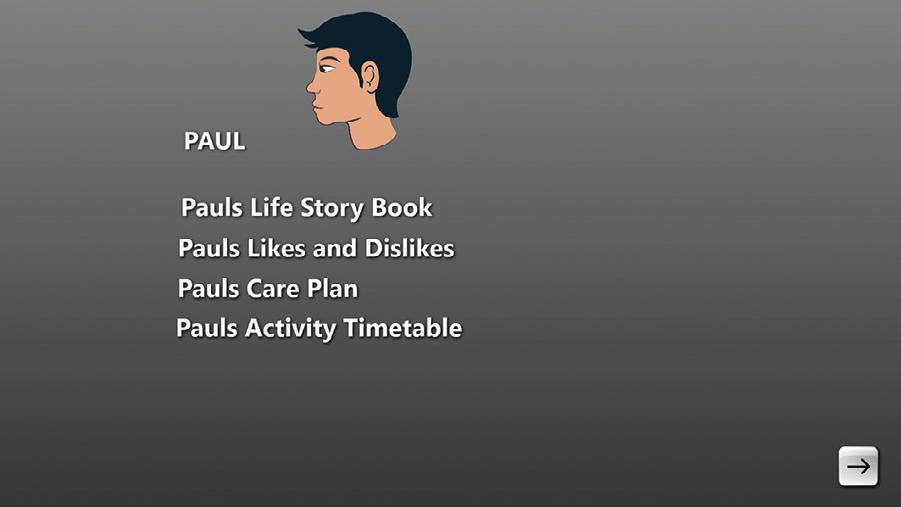
The founders' unique combination of care expertise and technological innovation has enabled them to integrate cutting-edge solutions into their care delivery model. This pioneering approach to person-centred care through technology played a crucial role in achieving their CQC Outstanding rating, demonstrating measurable improvements in quality of life for residents and enhanced support for families.
INTRODUCING MULTISENSORY MAGIC
Building upon decades of practical experience, Multisensory Care Solutions has developed "Multisensory Magic"—an accessible software application designed to democratise technology-enhanced care. This cost-effective solution makes advanced multisensory interventions available to care providers across the sector, extending beyond premium facilities to benefit a broader range of residents.
Meeting Critical Care Challenges
With approximately one million people currently living with dementia in the UK—a figure projected to reach 1.5 million by 2040—the need for innovative care solutions has never been more urgent. Technology-enhanced interventions offer proven benefits in:
Sensory stimulation and engagement
Cognitive function support
Enhanced communication pathways
Improved resident wellbeing outcomes
A TIMELY CALL TO ACTION
As the care sector observes World Alzheimer's Month in September 2025, culminating in World Alzheimer's Day on 21st September, the opportunity to transform dementia care through accessible technology solutions represents both a professional imperative and a moral responsibility.
Multisensory Care Solutions stands ready to support care providers in achieving improved CQC ratings whilst delivering meaningful enhancements to resident care and family satisfaction.
For more information see the advert on the facing page or please call or email
Restrictive practices such as physical restraint, bed rails, or lap belts remain one of the most challenging aspects of health and social care. Intended to keep patients safe, they can also cause harm, distress, and loss of dignity when used unnecessarily. Across the UK, the principle is clear: care must always use the least restrictive option.

Legislation provides the framework, but culture and staff behaviour shape daily practice. Nurses, carers, and clinicians often make quick decisions balancing safety with autonomy. Without training, restrictive practices risk becoming routine. To change this, staff need better understanding of the human impact and confidence to use alternatives. That’s where Restrictive Practice makes a difference. Developed through co-design workshops with patients and carers, this gamified e-resource gives a voice to those most affected by restraint. Their lived
experiences shaped the learning, helping staff see restraint not as a neutral safety tool, but often as something frightening or disempowering.
The results are powerful. Staff trained with the resource led Quality Improvement projects, achieving measurable reductions:
- Bed rails dropped from 360 to 277 incidents
- Bed bumpers from 303 to 227
- Lap belt use halved, from 46 to 22
These improvements represent safer, more compassionate care and reassurance for families.
Restrictive practices may never disappear entirely, but they should be the exception, not the rule. With the right knowledge and tools, staff can choose safer alternatives and build a culture of dignity, compassion, and respect across UK care services. See our advert on the front cover or visit www. RestrictivePractice.com



Users / providers are enabled to ‘CONJURE
and reminiscence therapy sessions. Audio, video, slide shows, text, images and aromas can all be blended
using multiple screen displays.




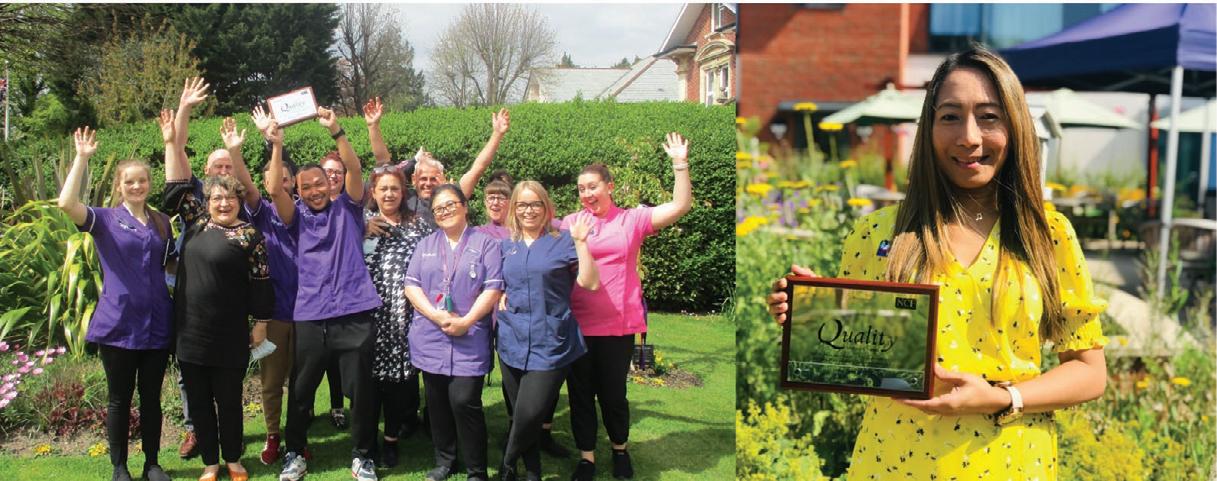
The Gold Standards Framework (GSF) Charity equips your team with the skills, confidence, and compassion to deliver person-centred care that truly makes a difference.
For a limited time, the GSF Care Homes Training & Accreditation Programme is available at 50% OFF – now only £1,095
This affordable, high-impact training is designed for your whole organisation (for training
GSF Accreditation is CQC-recognised, endorsed by leading care organisations, and more than 97% of accredited teams report better experiences for people and their families.
For more information, visit: www.goldstandardsframework.org.uk / 020 7789 3740 Future-proof your care. Empower your workforce. See the advert on page 7 for more information.

Care home residents, new staff and visitors can all benefit from clear way-finding signage, which is why the Care Quality Commission places great importance on a well thought out signage scheme – especially where memory care needs demand specialist input. Add the need to reflect a group's branding objectives whilst working within interior design guidelines, and the challenge for managers tasked with sourcing signage is knowing who to call.
With nationwide coverage, Taylor and Pickles have a reputation for well thought out signage schemes which effectively and discreetly direct people around care homes for many of the UK’s leading care providers.
Starting with a client’s briefing, Taylor and Pickles carry out a comprehensive site survey and develop
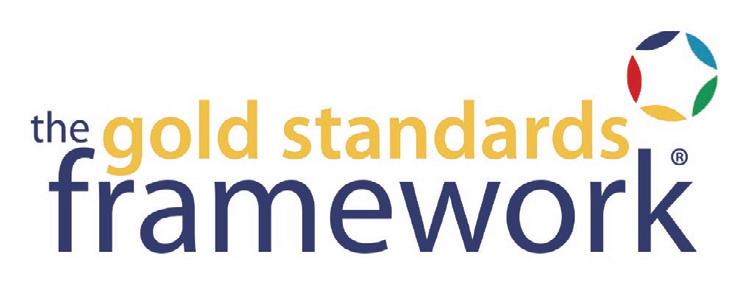
detailed design proposals. Often working with a client’s interior designers, the team at Taylor and Pickles create options for bespoke signs which provide clear directions and are sympathetic to the client’s creative concepts. This custom approach prevents signs looking out of place, or like “off the shelf” stock items.
Of course, there are times when greater visual contrast is essential. Residents with memory care needs require a bold and sometimes bright scheme which might seem heavy handed elsewhere. When the special needs of these residents are added to the brief, clients can be confident that Taylor and Pickles’s approach, guided by leading academics and their experience of helping many homes through the Care Quality Commission signage inspection process, will pay off. Often a multi-tiered approach allows signs across different zones in a development to have a cohesive look yet serve differing care needs.
Taylor & Pickles also recognise a client’s commercial needs. Timely, unobtrusive surveys – effective design and tidy installation by in-house teams make Taylor and Pickles the chosen signmaker for many of the UK’s leading care home groups.
See the advert on this page for details.
"23 years, operating 4 Devon Nursing homes, has been pretty tough, as anyone in social care, knows, only too well. And if it was hard already, after 2024 budget, it's just got harder. Anyway, at heart, I am just customer of Eden Alternative, and it was a stroke of luck to come across this whilst on holiday in New Zealand in 2009. It started in USA in 1994 and now runs in 22 countries.
The fact that I am now involved with this not-for-profit organisation (in the UK area) came about when one of the 2 main UK directors died suddenly just before Covid. But it's something I have run with for 11 years to help make 'vision' a reality, not a struggle. So, being both a customer and helping the admin seems quite natural.
It is a modern philosophy of care, but moreover, it's a programme that is straight forward, tried and tested for 30 years and really works.

Its member care organisations generally become trainers for their own teams, and run it themselves.
The programme is run in person over 2-3 days or online 1 hr a wk for 7 weeks. You choose.
It addresses loneliness, helplessness and boredom and operates through 10 principles to underpin 7 critical domains of wellbeing.
Moreover, it's effective, transformational and really works. As residents, and team members wellbeing, matter so much , it's a must, in my opinion.
Geoffrey Cox Southernhealthcare.co.uk eden-alternative.co.uk"
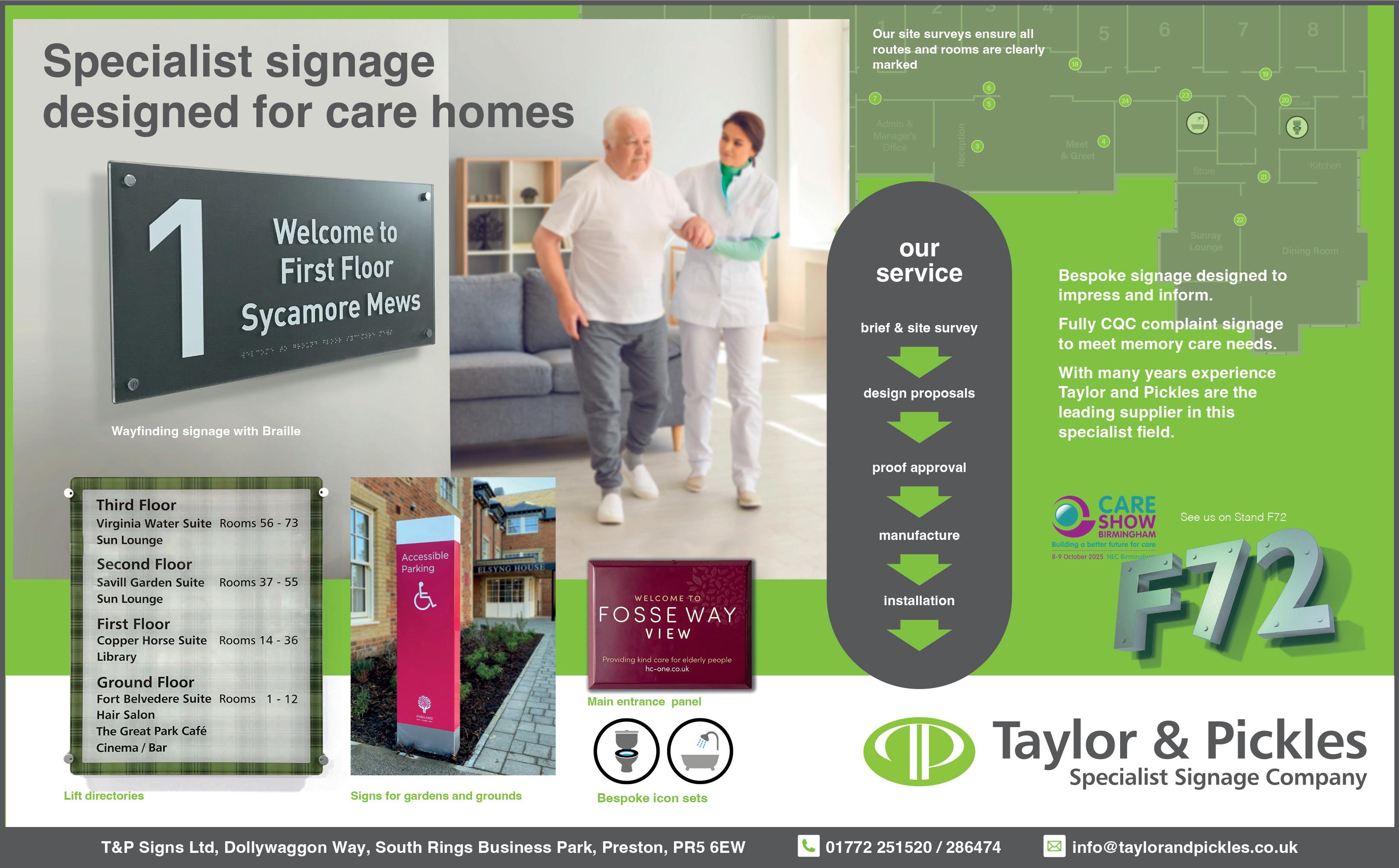
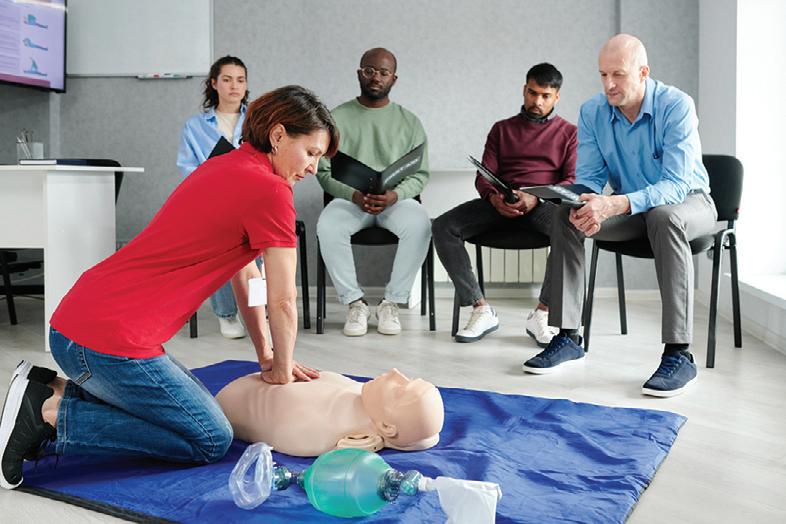
Training and learning are often treated as a requirement to be completed, but real learning is about giving your team the confidence they need to deliver safe, high-quality care. This is where blended learning comes into its own.
Blended learning recognises that effective training goes beyond theory. Knowledge is important; staff must first understand the what and the why, however knowledge alone doesn’t always prepare them for the realities of a care setting. Skills need to be practised, rehearsed and refined in an environment that’s safe before they are put into practice with residents or service users. When staff build confidence through role play, simulation, and guided practice, the leap from theory in the classroom to
the real world becomes less daunting.
The next step is proving capability on the job. Competency assessments connect learning with practice, giving managers assurance, regulators evidence, and service users confidence in the care they receive. But learning shouldn’t end there; structured pathways that map skills to roles, prompt refreshers, and track development over time keep staff on course, turning their training into a process of continual growth which is also aligned with Skills for Care standards and expectations set out by CQC.
The impact on organisations is clear – teams feel supported and this improves retention, which in the Health and Social Care sector is more important now than ever. Families, inspectors, and service users see a higher quality of care, and managers gain reassurance that their workforce is competent and confident. Ultimately, blended learning creates safer, kinder, and more consistent outcomes for everyone, meaning higher care standards and greater satisfaction all round.
Which is why your team deserves myAko.
Blended learning is more than just an approach, it’s essential for everyone in our sector!
ww.myako.online hello@myako.com 01202 283283
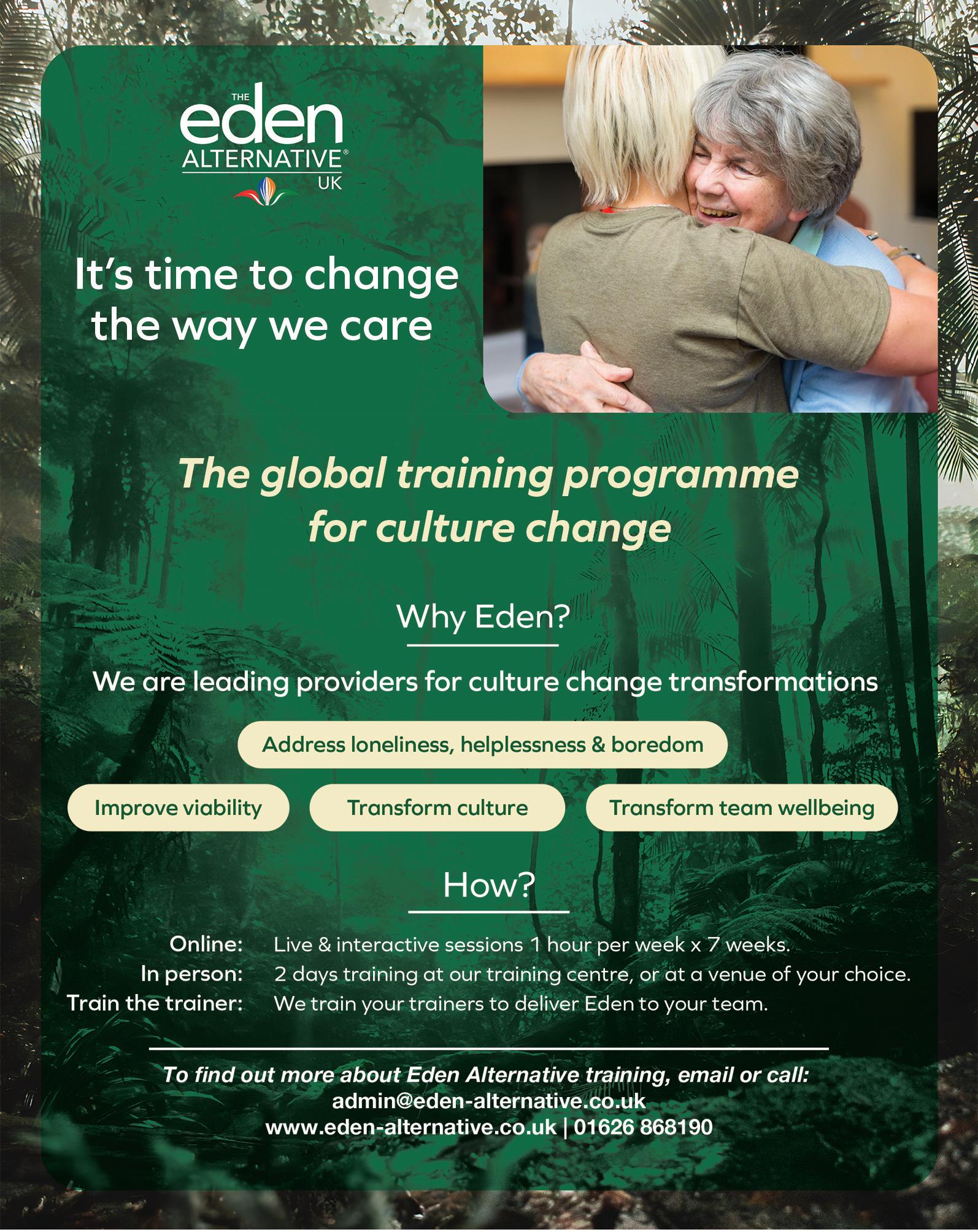





A new apprenticeship has been launched for adult care support workers who assist people with mental health challenges, including dementia and neurodiversity.
Leading training provider Realise has revealed its new Level 3 Senior Healthcare Support Worker Apprenticeship which features a specialist mental health pathway.
The apprenticeship aligns with The Care Workforce Pathway - developed by Skills for Care and the Department of Health and Social Care –which emphasises the importance of equipping staff who support people with mental ill health with the right knowledge and skills.
The programme’s focus on mental health makes it ideal for those working in complex care services or supporting individuals living with dementia or mental health conditions. It also benefits those supporting individuals with a dual diagnosis.
Standard apprenticeship funding rules apply with no age restrictions. However, learners aged 16–22 are eligible for 100% government funding, meaning non-levy employers are not required to pay the usual 5% co-investment. This is available in England only.
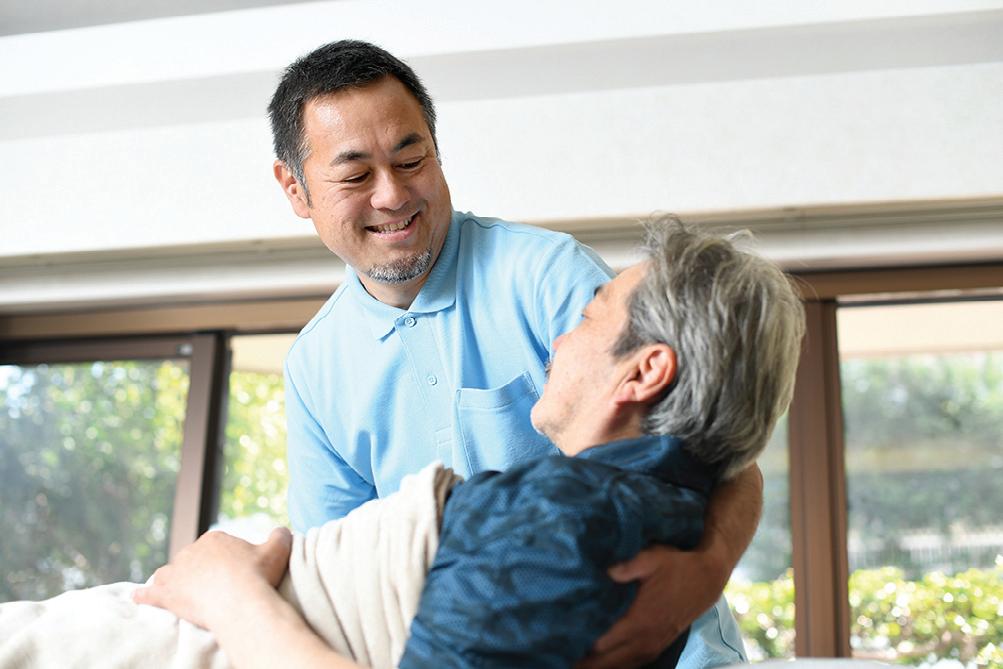
While a few other providers offer the Level 3 Senior Healthcare Support Worker Apprenticeship in Mental Health Pathway, the Realise progamme was developed in collaboration with leading industry provider Barchester Healthcare, ensuring it is closely aligned with the real-world demands of the role, particularly in complex care.
Angela Kaine, Director of Health & Social Care at Realise, said: “We fully support The Care Workforce Pathway, which emphasises the importance of people being able to receive training in areas in which they
specialise.
“Care workers supporting individuals with dementia or other mental health conditions benefit greatly from targeted training in crisis intervention, mental capacity and de-escalation techniques.
“Offering this apprenticeship can help adult care providers recruit individuals for specialised roles and improve retention - two major challenges within the sector.
“There is a wide variety of opportunities within adult care, and we’re proud to support those looking to develop both their technical skills and their chosen specialism.”
This comprehensive 18-month apprenticeship is designed to provide a rich and supportive learning experience. Learners will benefit from a blend of face-to-face support and interactive webinars, creating the perfect balance between in-person guidance and flexible online learning.
These sessions not only enhance understanding but also offer valuable opportunities to connect, collaborate, and network with peers from across the sector- helping to build confidence, share best practices, and develop lasting professional relationships.
Modules include quality improvement - where learners are challenged to identify small changes to enhance performance - and team leadership, which encourages them to take on more responsibilities.
Realise can tailor programmes to suit the employer’s needs by utilising unit selection through the diploma.
The apprenticeship is available throughout England.
For more information, visit www.realisetraining.com
In today’s regulated care environment, having clear, current, and wellcommunicated health and social care policies is essential for delivering safe, compliant services. The Care Quality Commission (CQC) now places increasing emphasis on how policies are implemented and understood—especially during registration and inspections.
Outdated or poorly communicated policies can significantly impact your CQC rating. Even if documentation is comprehensive, failure to ensure staff understand and follow procedures may lead to a “Requires Improvement” or even “Inadequate” rating under the ‘Effective’ domain.
Well-maintained policies promote consistent standards across care teams and help safeguard services when incidents arise. In regulatory investigations, the first request is often to review relevant policies—making accuracy and accessibility key to reducing legal and compliance risks.

However, keeping policies up to date is challenging. Constant changes in legislation, best practice guid-
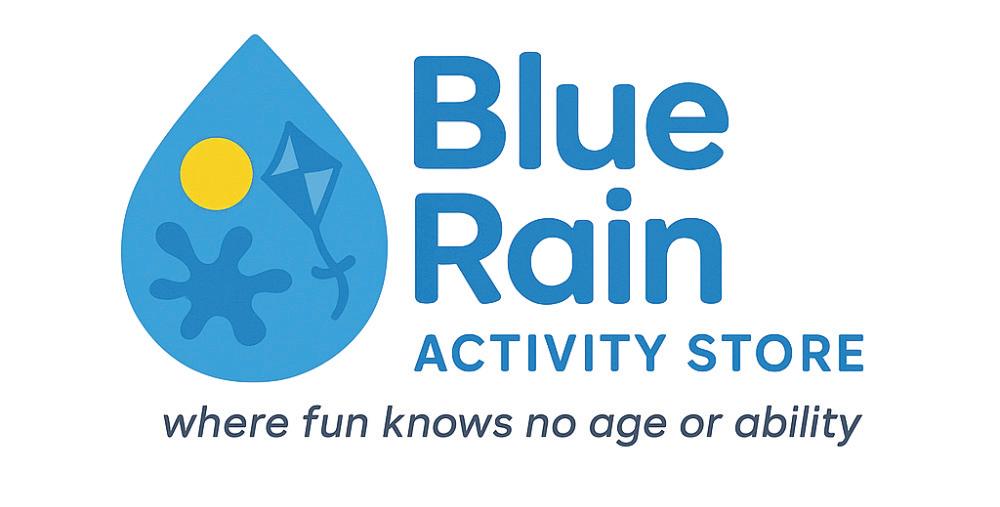
Welcome to Blue Rain - our activity store is built on over 14 years experience supplying products that bring joy, inspire motivation, and enrich the lives of those who need a little extra support, or simply want to have fun, whatever the weather.
Come find your next reason to smile.
ance, and case law mean that policies can quickly become obsolete. W&P has been a trusted provider of CQC-ready care policies and procedures for over 20 years. Our expert team monitors industry developments to ensure your policies remain fully compliant.
Our Online Policy Portal simplifies policy management. With just a few clicks, providers can update content, distribute documents to staff, track confirmations, and monitor compliance via a real-time dashboard. You can even provide temporary read-only access to inspectors—demonstrating transparency and accountability instantly.
Ensure your care service meets CQC expectations with fully up-to-date, easily accessible, and well-communicated policies.
Email: info@wandptraining.co.uk
Call: 01305 767104
See the advert on page 2 for details.
At Blue Rain, our mission is simple: to provide everyday activity products that spark joy and enrich lives — whether for those who need a little extra support, a burst of motivation, or simply a reason to have fun.
We take pride in listening to our customers, understanding what truly matters to them, and sourcing or creating products that meet those needs perfectly. Many of our items are available as readyto-go activity kits and bundles — complete with everything you need — so you can skip the preparation and focus on the joy of the moment.
As Blue Rain Activity Store continues to grow, our heart remains the same: creating meaningful moments of happiness, connection, and creativity for people of all ages and abilities.
From rainy-day craft sessions to sunny outdoor adventures — or simply time spent together — we’re here to make every experience easy, special, and unforgettable.



Strong cash flow management can make the difference between thriving and merely surviving. Here's how to keep your care home finances on track.
For care home operators, maintaining healthy cash flow is as vital as delivering quality care. Yet many providers struggle with the timing mismatch between when costs are incurred and when payments arrive, particularly from local authorities where payment terms can stretch to 30 days or more.
The first step to effective cash flow management is knowing exactly where you stand. Weekly cash flow forecasting should be standard practice, projecting income and expenditure at least 12 weeks ahead. This allows you to spot potential shortfalls before they become critical and plan accordingly.
Key metrics to monitor include debtor days (how long it takes to receive payment), creditor days (how long you take to pay suppliers), and your current ratio (current assets divided by current liabilities). A healthy current ratio sits above 1.5, indicating sufficient liquidity to meet short-term obligations.
Late payments from local authorities remain a persistent challenge. While most councils adhere to payment terms, delays do occur, and with potentially dozens of council-funded residents, even a few late payments can strain finances significantly.
Implementing robust credit control processes and maintaining regular communication with commissioning teams helps minimise delays.
Seasonal variations in occupancy can also create unexpected cash crunches. Many homes experience dips during summer months as families explore alternative care arrangements. Building a cash reserve equivalent to at least two months of operating expenses provides a crucial buffer during quieter periods.
Consider negotiating better payment terms with key suppliers. Many are willing to extend credit periods for reliable customers, easing immediate cash pressure. Conversely, offering modest discounts for families who pay privately and settle invoices early can accelerate income.
Review your fee structure regularly. Ensure private pay rates genuinely reflect your cost base plus a reasonable margin, and don't neglect annual fee reviews with existing residents and their families. Clear communication about rising costs helps justify necessary increases.
For homes experiencing persistent cash flow challenges, invoice financing or block discounting arrangements can provide working capital by advancing funds against outstanding invoices, though fees must be weighed against the benefit.
Cash flow management isn't glamorous, but it's fundamental to sustainability. Regular monitoring, proactive planning, and swift action when issues arise will help ensure your care home remains financially stable and able to continue delivering excellent care to residents.
Global assists clients throughout the U.K. who specialise in the healthcare sector to achieve their objectives of purchase, development and refinance.
We have organised over £1.8bn for clients in the past 30 years, providing clients with competitively priced funding to refinance existing debt, ease cashflow and develop businesses further.

From helping clients make their first purchase through to allowing groups to grow significantly in size we assist at every stage of your business expansion.
Every proposal is individual and deserves to be treated that way, so we hope you will allow us to be of assistance to you and call us to chat through your plans and requirements, I am sure we will be able to tailor a facility to your requirements. Call us on 01242 227172 or e-mail us at enquiries@globalbusinessfinance.net

Since 2008, Satellite Finance has been a trusted commercial finance broker specialising in funding solutions for care homes and healthcare providers.

Based in Newport, Wales, Satellite Finance has a range of tailored business finance services from asset finance, business loans, and mortgage funding to support care home acquisitions, refurbishments, and equipment purchases.
If you’re looking for Asset Finance to help grow your business, new equipment is a must. Satellite Finance can help you to get all the equipment you need, without making large dents to your cashflow. With Asset Finance you don’t have to pay for everything upfront, you can spread the cost of your equipment over the period of time its expected to be used for which can be from 12-72

months, allowing you to spend more money on higher standard equipment without feeling the economic pinch.
Perhaps you’re looking for a loan for a new building, or to make a refurbishment in a care home or surgery? Satellite Finance works with you to choose the best loan for your project. Choose from either a Business, Professional, Personal, or Corporate & VAT loan, and because Satellite Finance has access to over 40 specialist lenders that have facilitated over £100 million in funding for more than 4,500 clients, you know you’re in good hands.
For a Mortgage Loan, Satellite Finance can help you to request a loan for anything between £50,000 – £40 million. With rates starting from just 2.25% above Bank of England base rate, your repayment period
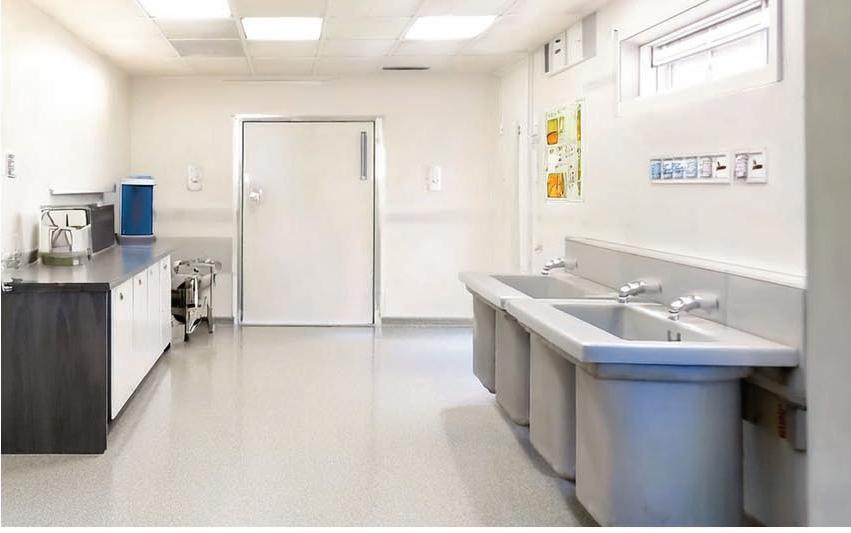



can be anywhere between 5 and 30 years. Unlike other finance companies, Satellite Finance’s terms won’t feel like a burden, as they’re both competitive and flexible, ensuring you get an arrangement that is affordable and convenient for you. Having close relationships with over 40 high street banks, challenger banks, and regional lenders all over the UK, Satellite Finance is experienced and up to date with the best lenders who offer the best rates to the healthcare sector.
